Planning a 13-day Ireland itinerary can be a pain in the backside… So, we’ve done all of the hard work for you!
We’ve spent 25+ years travelling around Ireland and the itinerary below leans on that experience and the many mistakes we made along the way!
In a nutshell, this 13-day itinerary:
- Starts and ends in Donegal
- Has been meticulously planned
- Has an hour-by-hour itinerary for each day to save you time/hassle
- Follows logical routes that take you to hidden gems, tourist favourites and great pubs and restaurants
Who this itinerary will suit
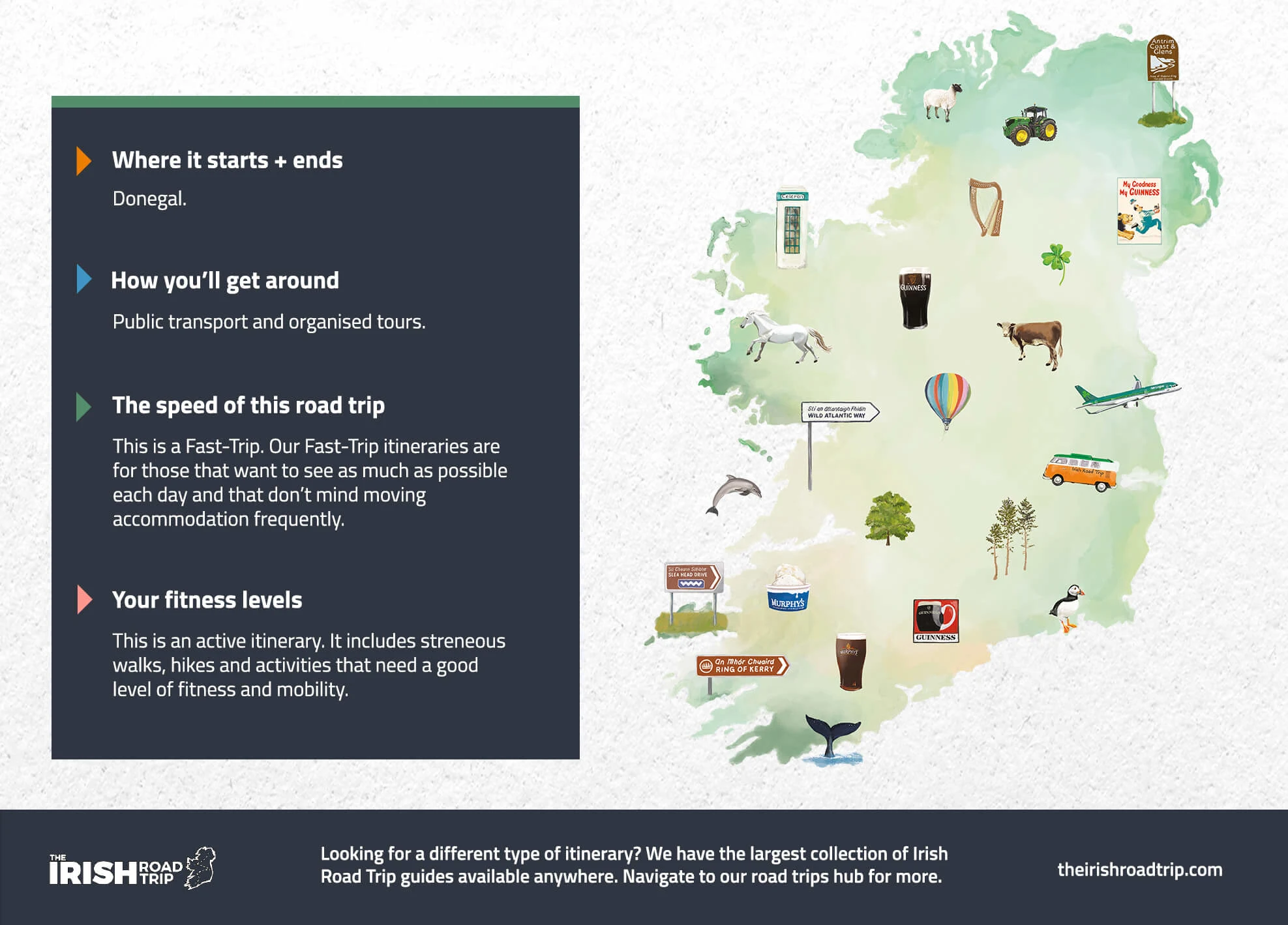
Now, before you scroll down, take 10 seconds to look at the graphic above – each of our road trip itineraries have been tailored to specific needs.
This road trip is specifically for those of you:
- Starting in/near Donegal
- Using public transport and organised tours
- Looking to explore at a fast pace
- With a good level of fitness (i.e. it includes long walks and hikes)
- Remember, we have hundreds of different itineraries here if this one doesn’t suit you
An overview of this itinerary
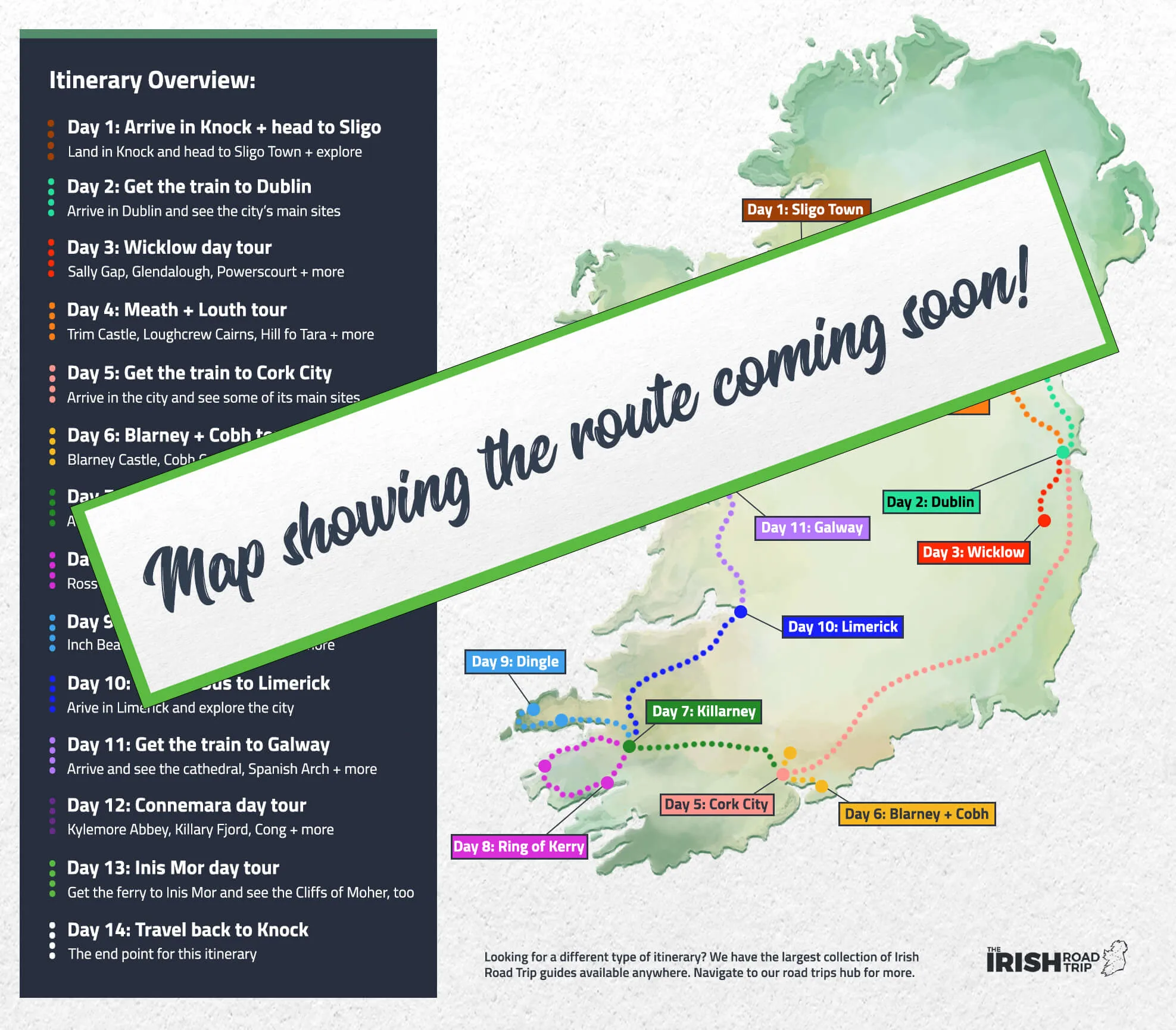
The map above gives you a very high-level overview of where this route will take you.
It uses several bases (e.g. Belfast for 3 nights) and provides you with day-long road trips you can head off on, so you avoid having to change accommodation constantly.
Now, I’ll stop rambling on – here’s a day-by-day insight into each of the days below!
Day 1: Arrive in Donegal
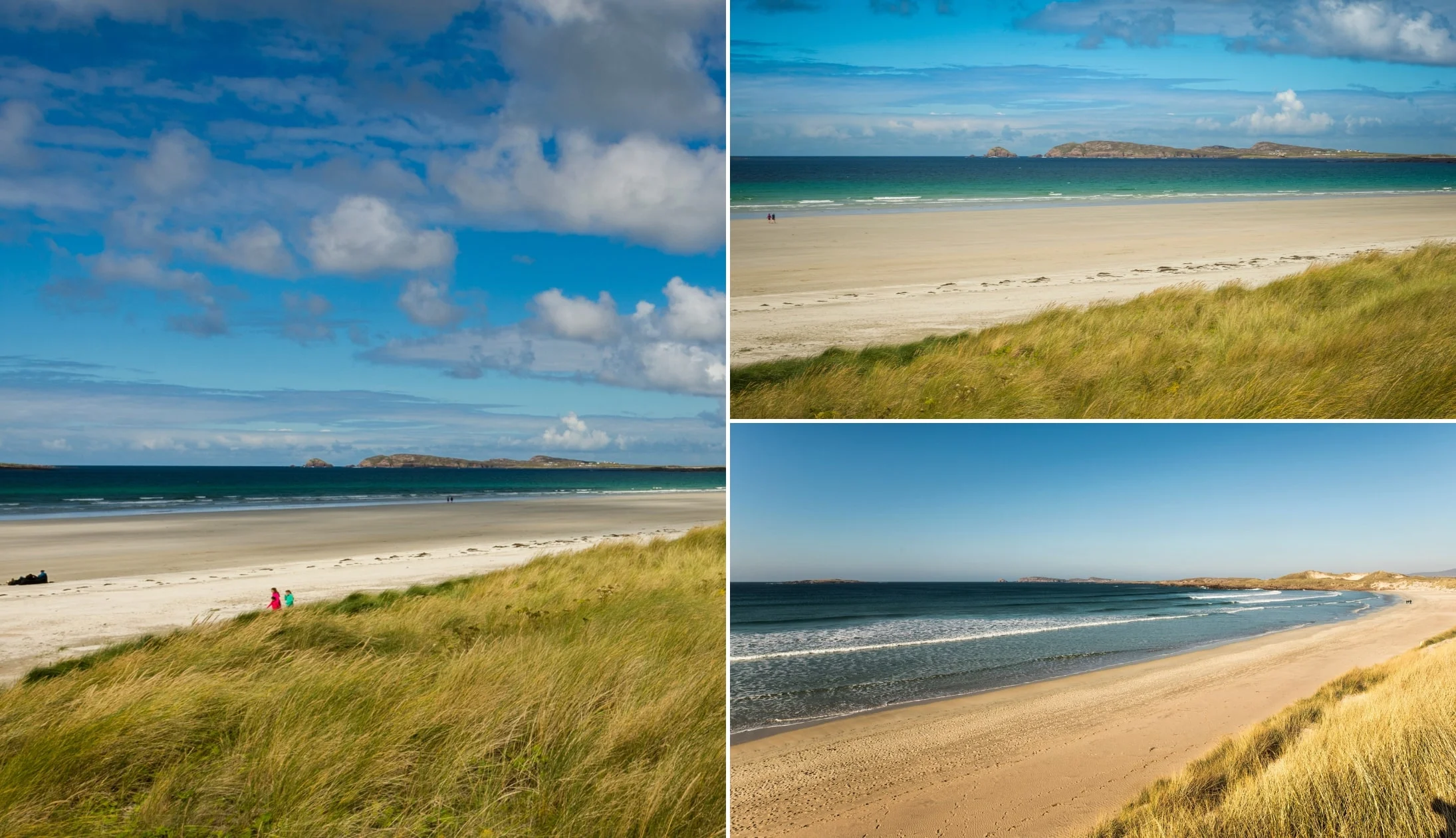
Photos via Shutterstock
It’s day one, so welcome to Ireland, or more specifically, Donegal. This is without a doubt one of the most beautiful counties in Ireland.
Unfortunately, it is also the county with the worst public transit system in Ireland, so we’ll be moving on fairly quickly. Have no fear, though, we’ve got plenty of great things for you to see and do.
For day one, you’ll be jumping on a bus from the airport to the lovely town of Letterkenny.
You’ll be staying in Letterkenny for one night, so be sure to take a look at some of our suggestions for accommodation.
Our Letterkenny accommodation recommendations
- Budget: Mel’s (in the town and with great reviews) and Mount Errigal Hotel (popular spot a 5-minute spin from town)
- Mid-range: Station House Hotel (5-minute drive from centre with exceptional reviews) and Radisson Blu Hotel (super central with great reviews)
Stop 1: Donegal Airport
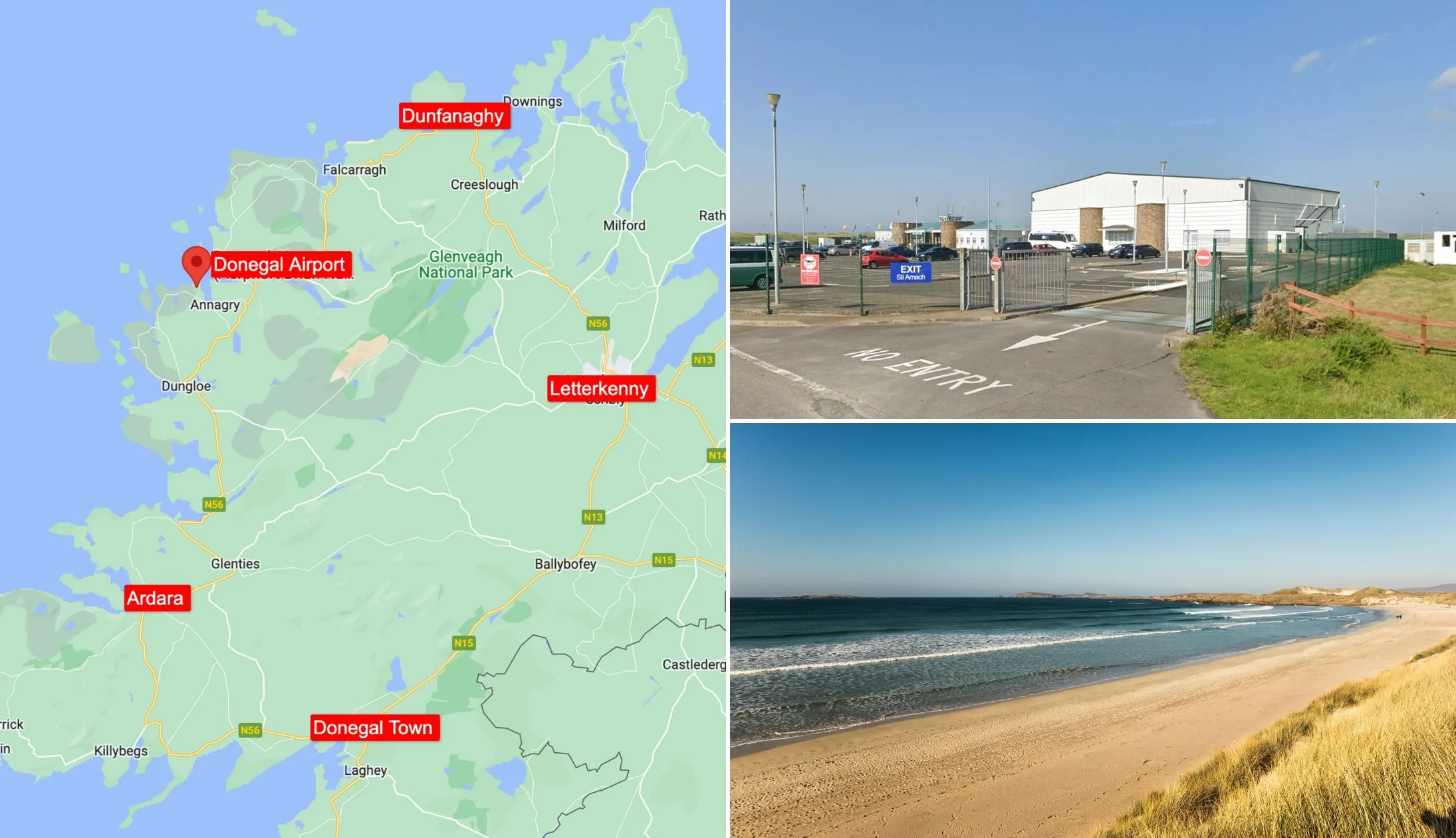
Photos via Google Maps and Shutterstock
Okay, so today’s trip will be a little long-winded, but it’ll be worth it! You’ll be jumping on TFI Local Link Bus Route 992 or 992A from Donegal Airport (Ballymanus Station) to Crolly.
The 992 typically departs at 13:10, and the 992A at 14:50, every day except Sunday. The journey should take about 15 to 20 minutes and a ticket costs about €2.50.
If you miss the bus or arrive on a Sunday, you can take a taxi to Crolly instead. However, you will need to book this in advance.
Stop 2: Crolly
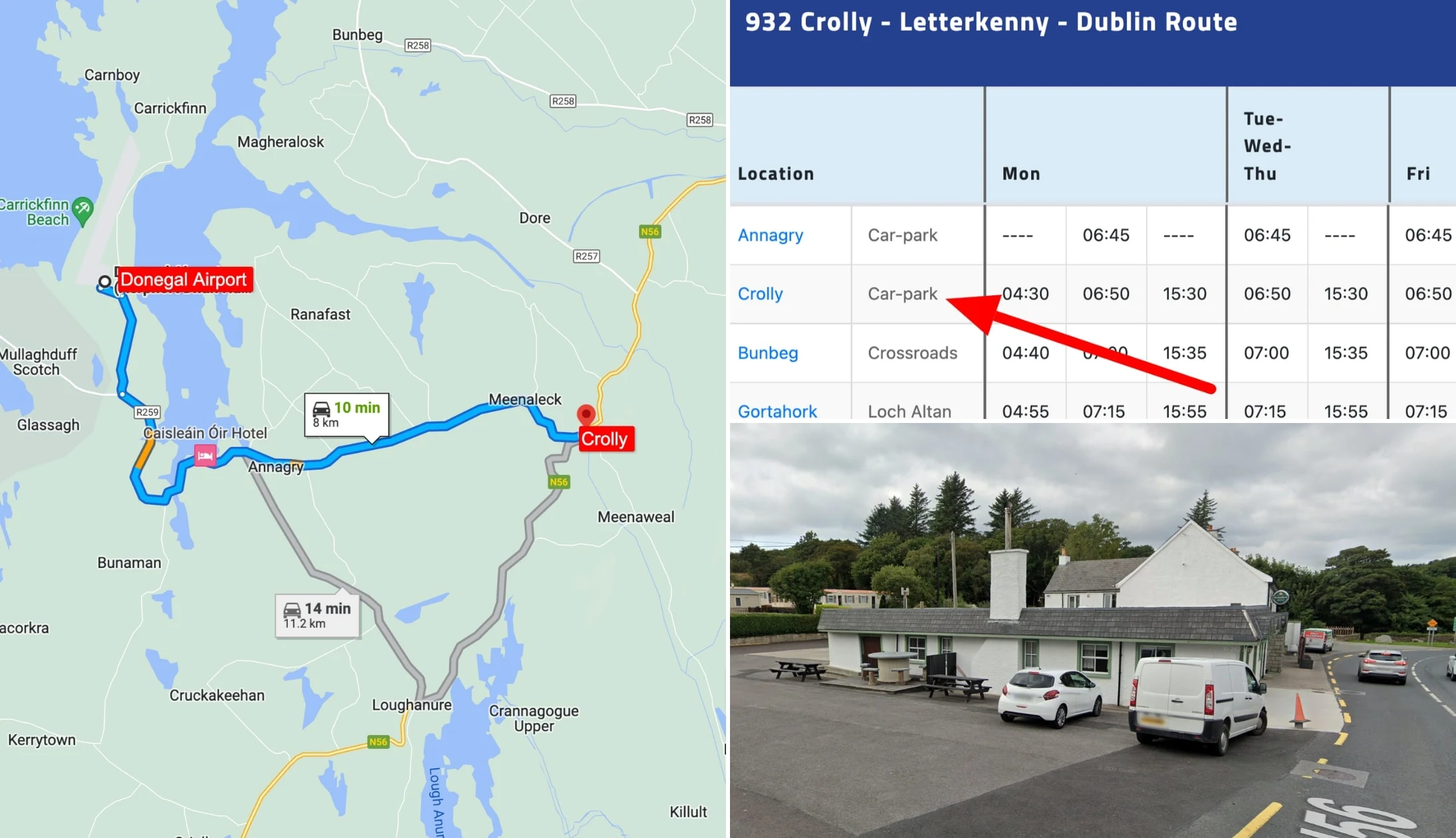
Photos via Google Maps
Once you arrive in Crolly, you’ll need to walk towards Paddy Og’s Pub (Teach Paidi Óig).
Your next bus, a Dublin-bound John McGinley Coach, number 932, should leave from here at 15:30 (every day except Sunday) but make sure to check the times well in advance.
Jump aboard the coach, and you should arrive in Letterkenny at around 17:15.
On Sundays, coaches leave from the car park in Crolly to Letterkenny at 11:10, 14:50, and 16:50. There’s also an 11:10 service on Friday mornings. Be sure to check route times before you travel though!
Stop 3: Letterkenny
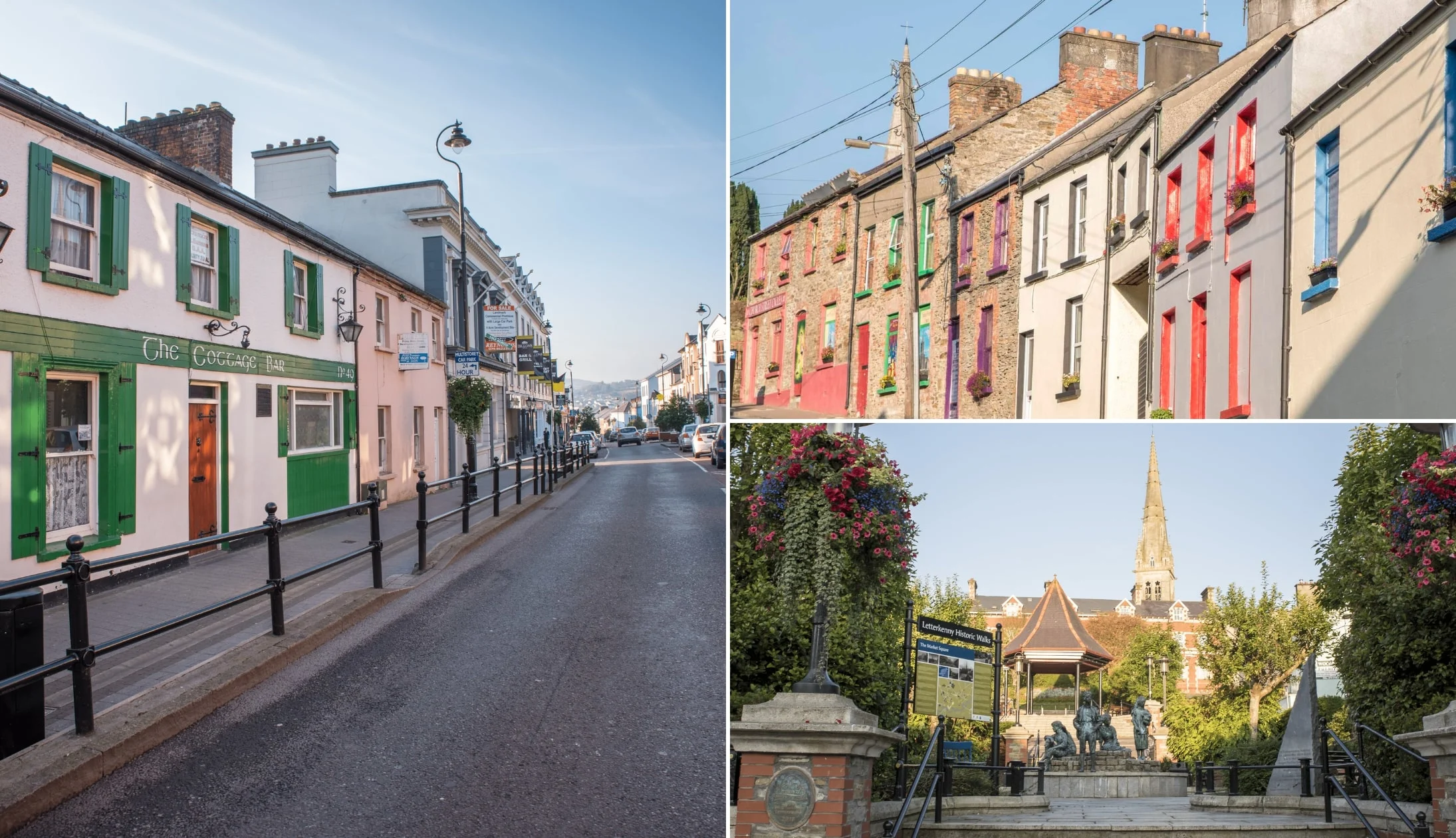
Photos courtesy of Martin Fleming via Failte Ireland
Breathe a sigh of relief as you jump off the bus in Letterkenny, you’ve made it!
You’ll be dropped off in front of the Mr Chippy Chip Shop (opposite Letterkenny Bus Station), about a 5 to 10-minute walk from the main street.
Head to your accommodation to check in, drop off your stuff, and freshen up, before hitting the town.
Stop 4: Dinner, drinks and live music
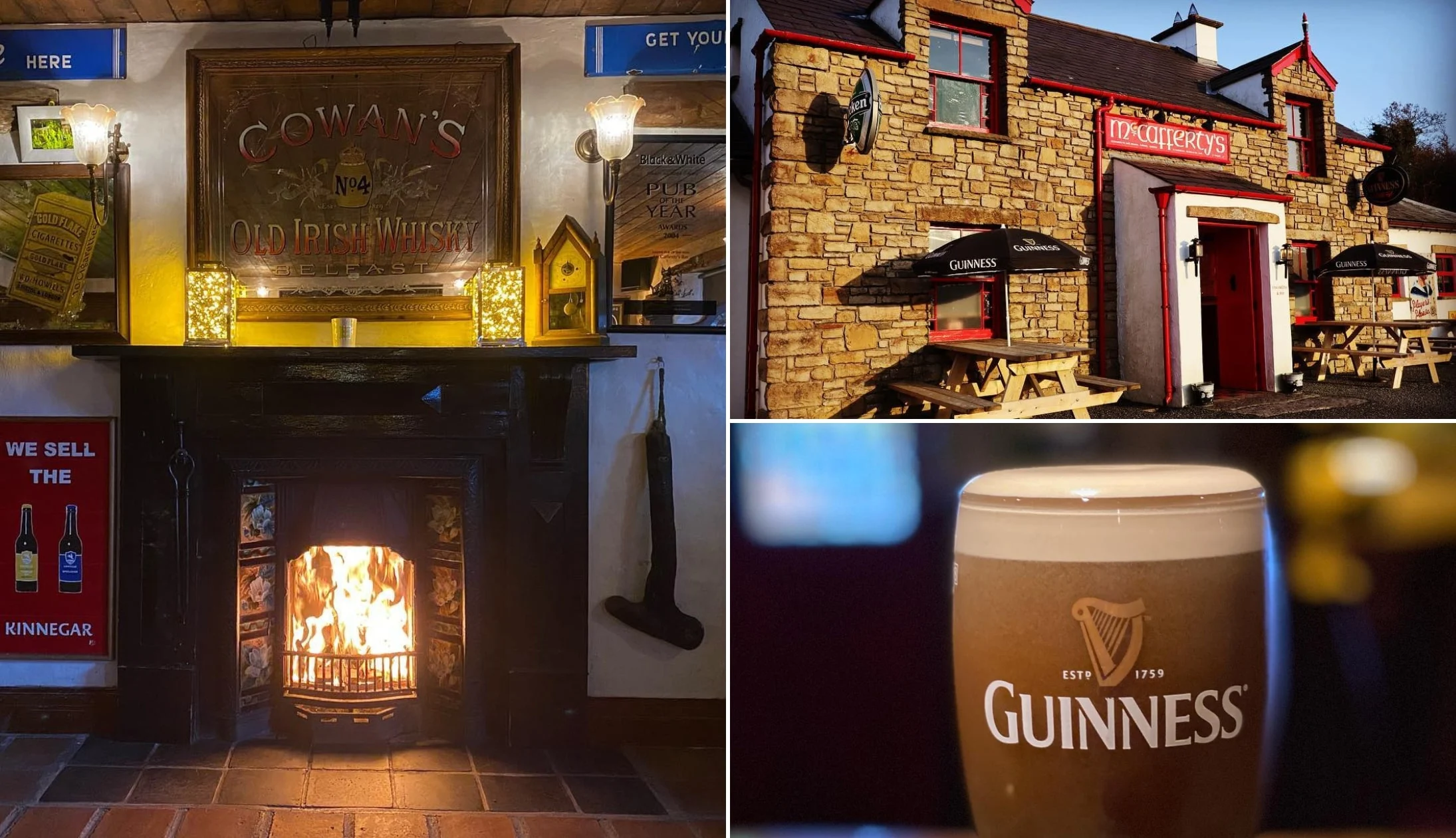
Photos via McCafferty’s Bar on FB
It’s been a long day on the road, so now’s the time to kick back, relax, and enjoy your first night in Ireland.
Letterkenny is home to some fabulous places to get a bite to eat or a pint to sip, and you’ll often also catch a trad session in full swing.
Our Letterkenny food recommendations
There are some excellent restaurants in Letterkenny. Yellow Pepper really is a stunner of a spot. Located on Lower Main St., this former Victorian shirt factory boasts fantastic decor and a cosy atmosphere.
Just around the corner, Lemon Tree is a family-run, Michelin-recommended restaurant that showcases Irish cooking at its very best. On the menu, you can expect everything from Irish Beef Tartare to Lamb Rump, but keep in mind that it changes seasonally.
Alternatively, if you’re looking for a place with cheese boards, an extensive selection of fine wines, and locally brewed craft beers, make sure to check out the House Wine Bar & Tap Room.
Our Letterkenny food recommendations
There are some mighty old-school pubs in Letterkenny, too! Our go-to is generally McCafferty’s (see photos above).
The Cottage Bar is one of the most unique pubs in Letterkenny and Donegal as a whole. This is a traditional Irish pub at its absolute finest.
McGinley’s Bar is another traditional pub that boasts a smoky open turf fire during the cooler months. It’s also one of the longest-established in Letterkenny when it comes to musical entertainment.
Blake’s is another unique pub in Letterkenny, and to describe the interior as quirky doesn’t quite do it justice. It kind of feels like you’ve just stepped foot in someone’s living room, only they’re serving up deliciously creamy pints of Guinness for your pleasure.
Day 2: The trip to Derry
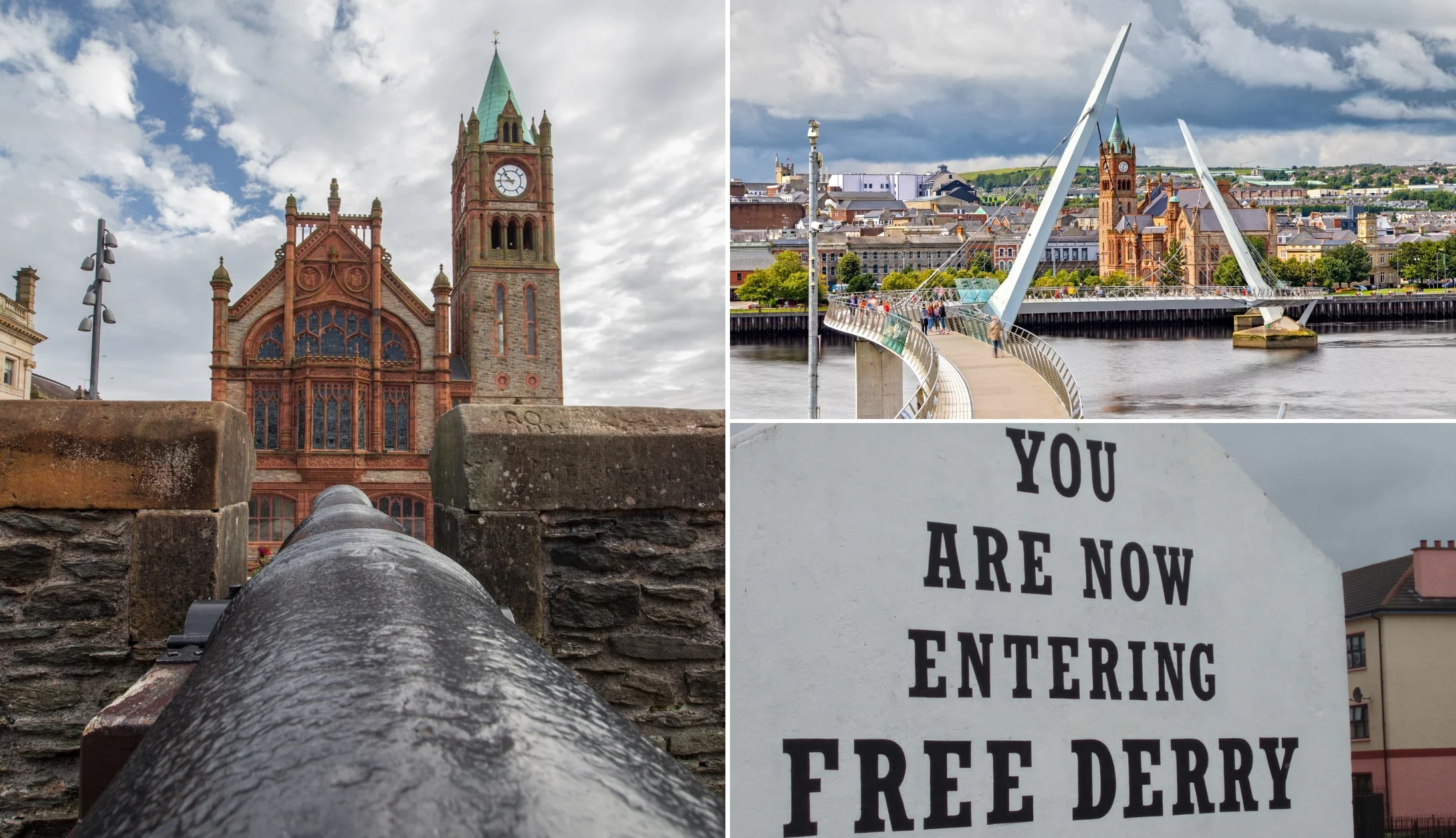
Photos via Shutterstock
After a long day of travelling yesterday, we’ll be taking it a bit easier today. You’ll enjoy a relaxing breakfast before checking out the local museum, and after that, you’ll take a short bus ride to the lively city of Derry in Northern Ireland.
It’s worth noting that in Northern Ireland, the currency switches to Pounds rather than Euros. It can be handy to swap some cash if possible.
Start the day well with a decent breakfast at your accommodation, or check out the Honeypot Coffee House on High Road, just up from Main Street.
We’ll spend the day exploring Derry, stopping over for one night. Here are some of the best places to stay.
Our Derry accommodation recommendations
- Budget: Rose Park House (cosy, great reviews and a 20-minute walk from the centre) and Bishop Gate BnB (excellent reviews and a 10-minute walk from the city centre)
- Mid-range: Number 8 The Townhouse and Shipquay Boutique Hotel (both very central with top reviews)
- Luxury: Bishop’s Gate Hotel (gorgeous and central luxury accommodation)
Stop 1: Donegal County Museum

Photos via Donegal County Museum on FB
Just a 2-minute walk from the Honeypot Coffee House, Donegal County Museum offers a fascinating look into the past. Housed in a gorgeous old stone building, which was once part of the Letterkenny Workhouse, the museum boasts a fantastic collection of artefacts relating to the history and heritage of County Donegal.
Take a journey through time, learning about Donegal in prehistoric times, right up to the 20th century. You’re free to roam the museum at your own pace, and it costs nothing to enter, although a donation is always welcome.
Stop 2: The bus from Letterkenny to Derry
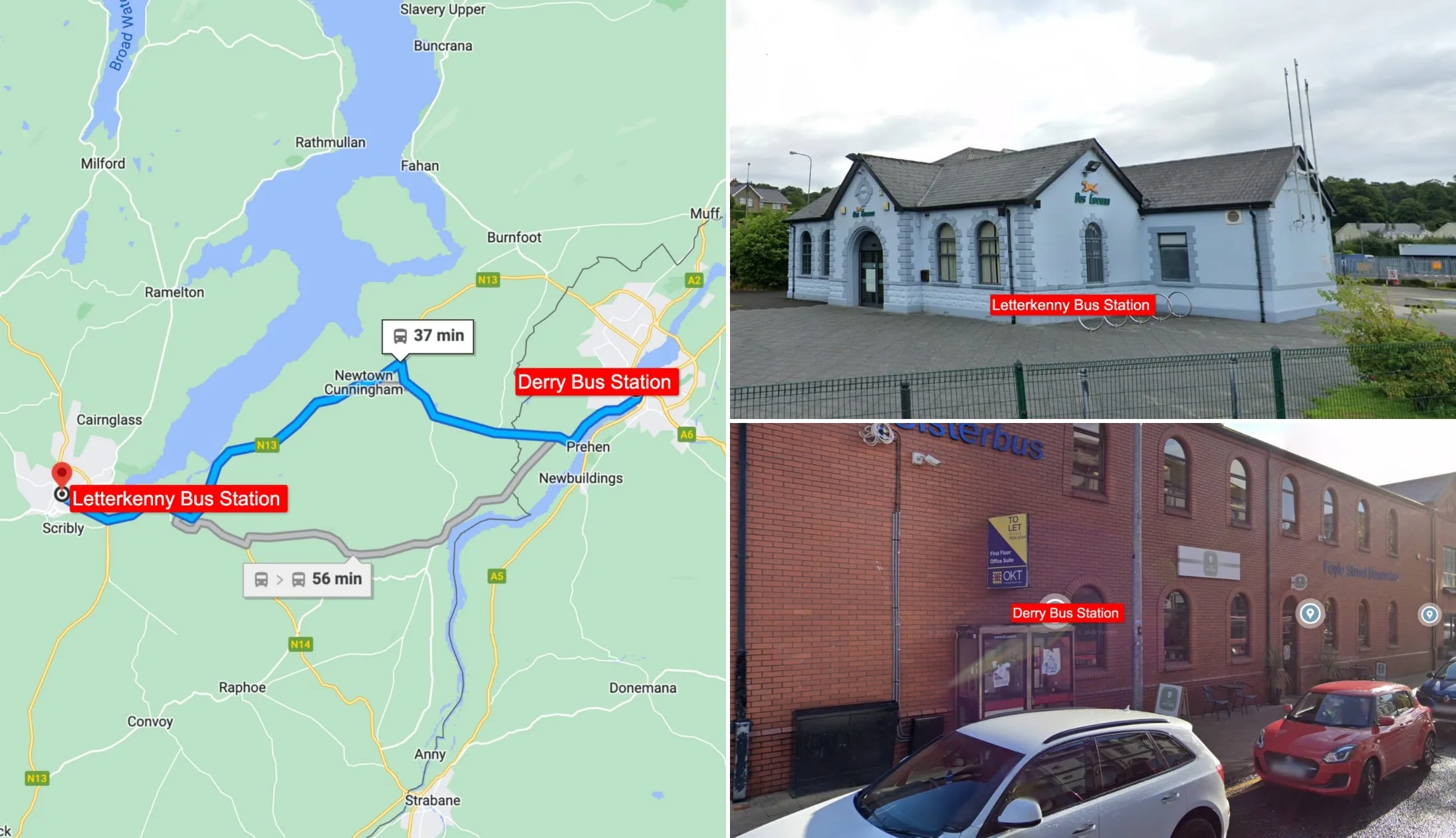
Photos via Google Maps
Letterkenny Bus Station is more or less opposite the bus stop you arrived at yesterday. It’s about a 10-minute walk from Donegal County Museum.
You’ll be jumping on the number 64 Expressway bus, which will take you directly to Derry in about 40 minutes. There are 9 buses a day, so you can be pretty flexible, and tickets cost €8.60.
Welcome to Derry! The bus will drop you off at Foyle Street Bus Centre, which is right next to the old town. From here, it’s easy to walk into town for lunch and the attractions we have lined up for the day.
If you want to head to your accommodation first and drop off your things, all of the following options are less than a 10-minute walk away from the bus station, as well as the middle of the old town.
Stop 3: Lunch
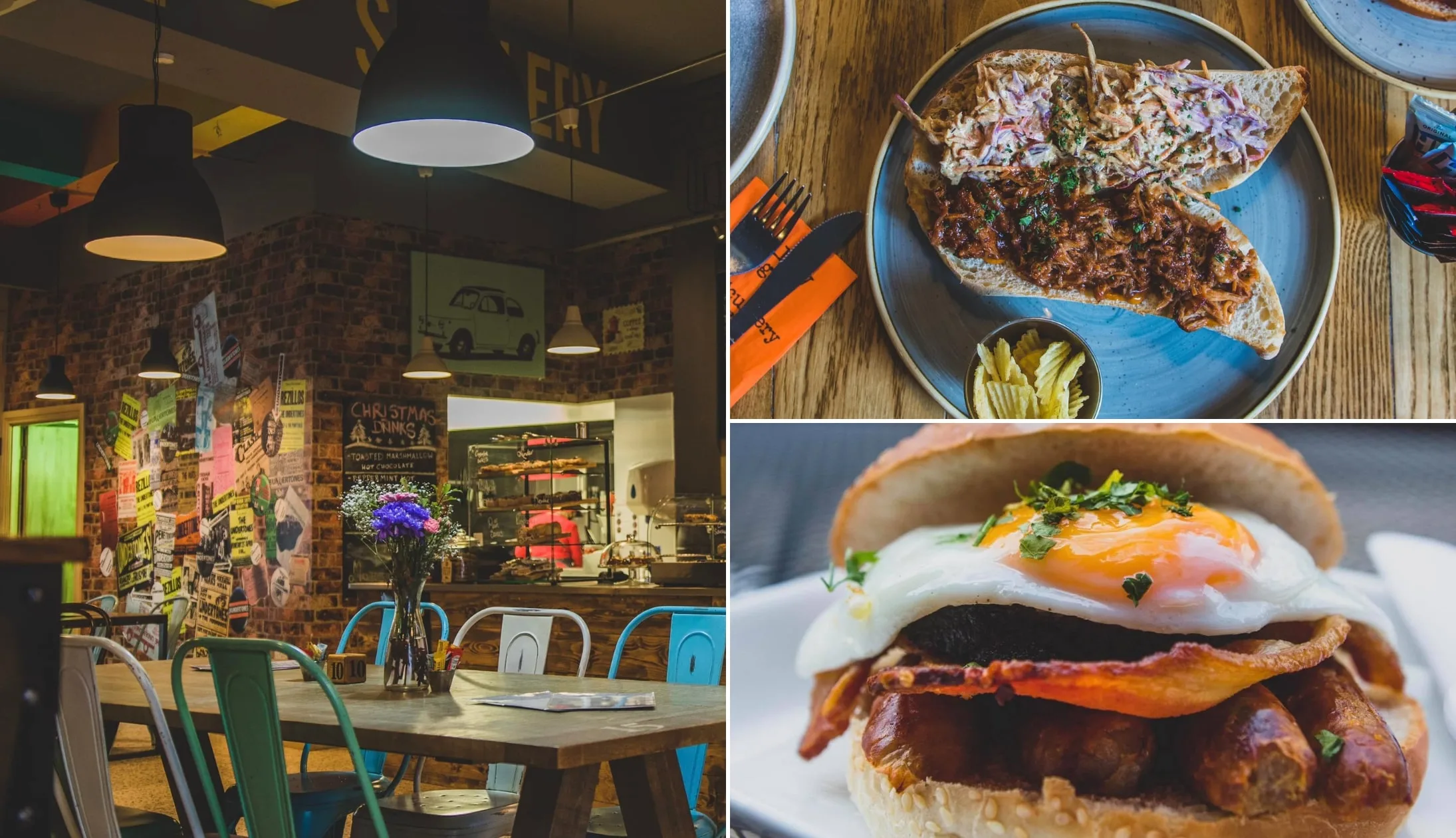
Photos via Scullery Cafe on FB
You should arrive in Derry just in time for lunch. You’ll find tons of great spots in the city centre. The restaurant at the Shipquay Hotel is a superb choice, with a fantastic lunch menu that has light options like sandwiches alongside fish and chips, steaks, and veggie and vegan options.
The Pickled Duck Cafe is another great choice, just a little further up the road. It enjoys a superb location opposite the Guild Hall and a laid-back, no-nonsense menu of tasty dishes to suit all dietary needs. Finally, the Scullery Cafe is a top choice for coffee lovers, and they also serve up a great selection of soups, sandwiches, wraps, and more.
Stop 4: The Walls of Derry
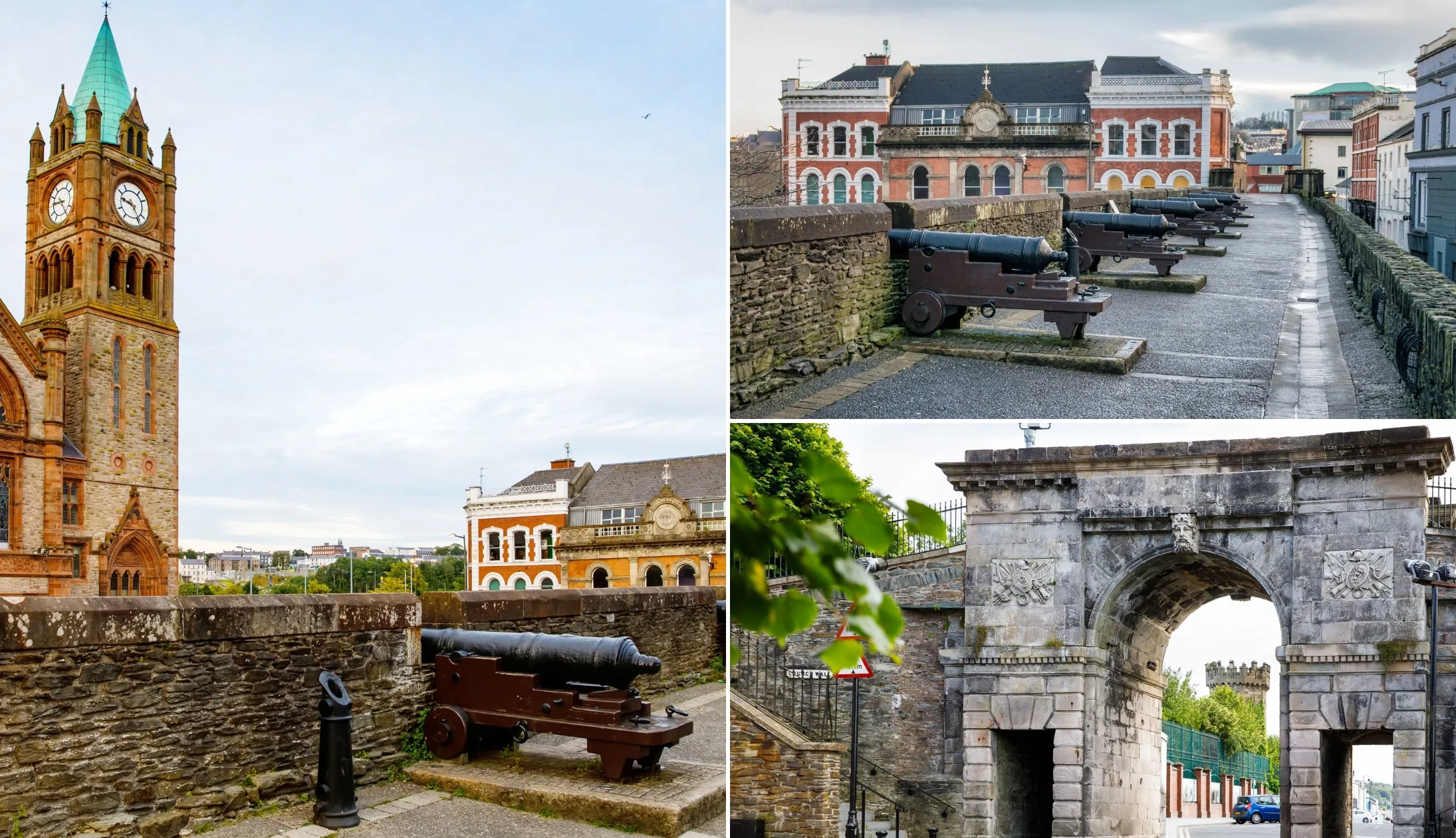
Photos via Shutterstock
Derry is the only fully walled city in Ireland and one of the best examples of a European walled city on earth. Dating back to the early 17th century, the walls circle the original city, standing an impressive 20 feet high. No visit to Derry would be complete without scaling the walls and admiring the view, as you walk around the mile-long oval.
Head to Bishop’s Gate and start your walk there. As you go, you’ll pass numerous watch towers, 6 more gates, and a bunch of mighty cannons.
Stop 5: Free Derry Corner
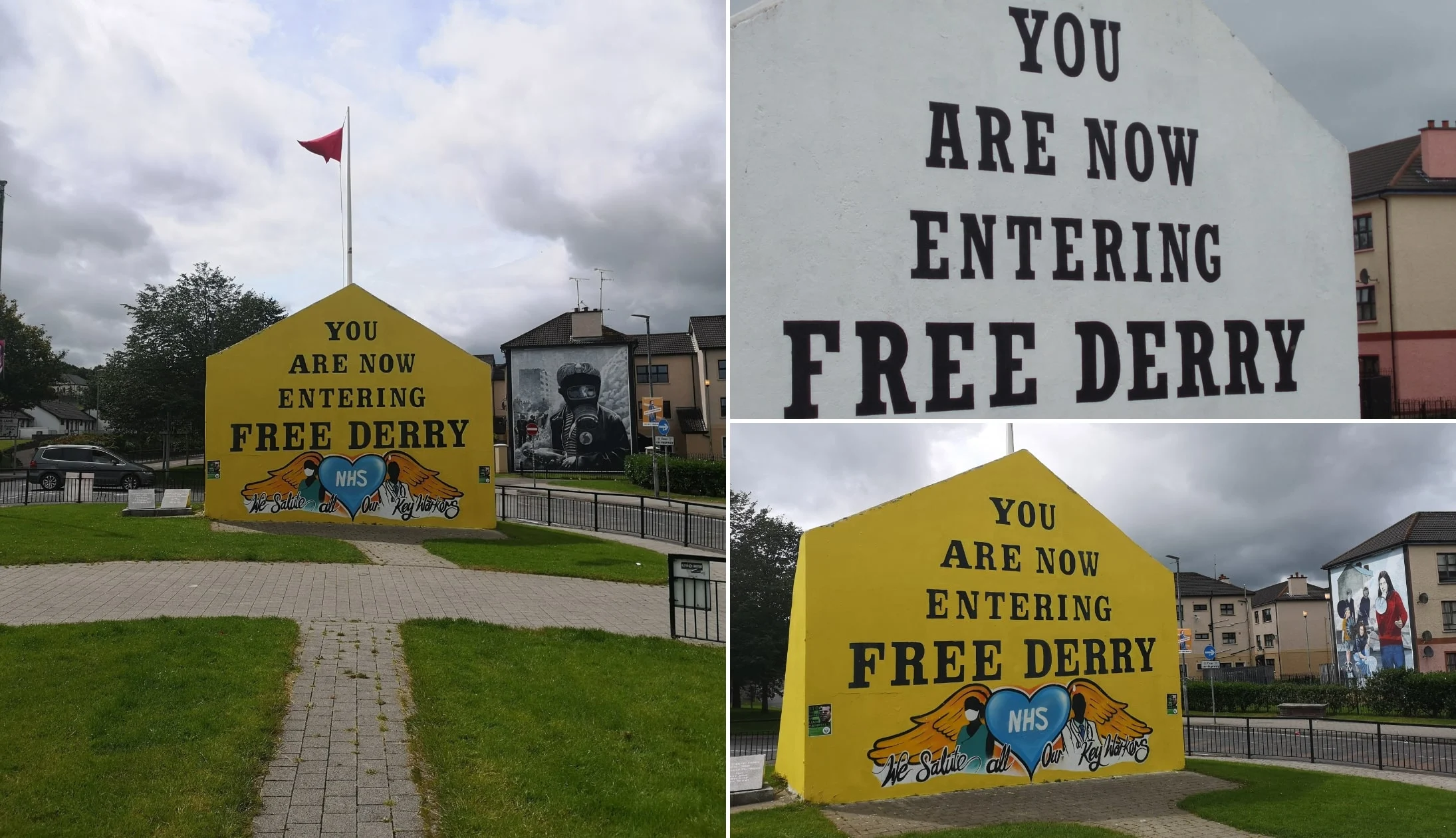
Left and bottom right photo: The Irish Road Trip. Top Right: Shutterstock
Once you’ve come down from the city walls at Bishops Gate, you’re just a 6-minute walk from the iconic Free Derry Corner. Located in the Bogside neighbourhood of Derry, this modern landmark sits on the site where the Battle of Bogside and Bloody Sunday massacre took place. Originally painted in 1969, it’s a hugely important area.
For a more in-depth explanation of the significance of Free Derry Corner, it’s well worth joining a guided Bogside History Tour.
Stop 6: Coffee and the Peace Bridge
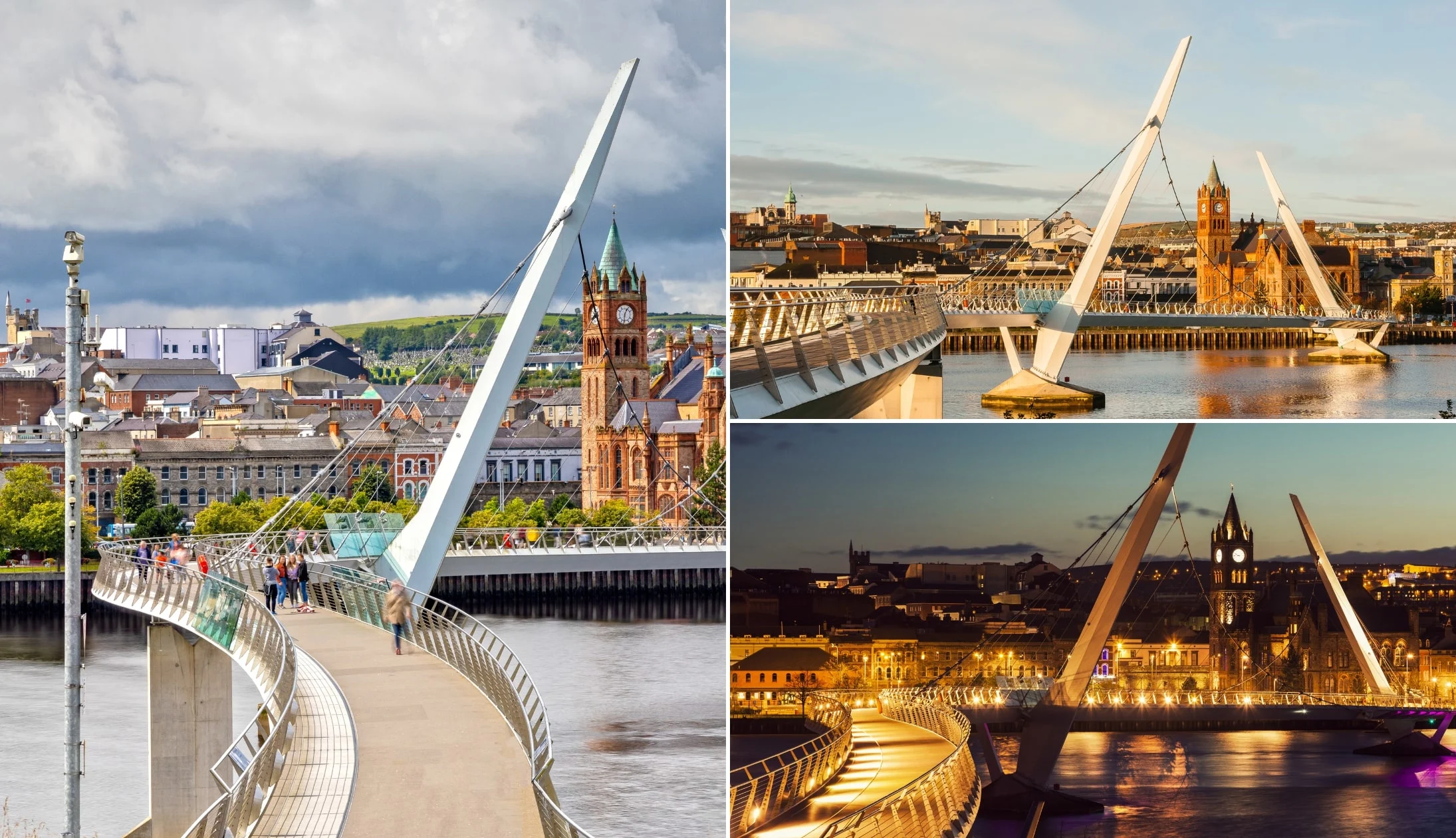
Photos via Shutterstock
Next, you’ll want to make your way towards the River Foyle, a 12-minute walk passing back through the old town. If you fancy a coffee along the way, both Cappuccinos and the Coffee Pot make a great cup, as well as a good selection of cakes and pastries. Take your coffee to go, then head round the corner to the Peace Bridge.
This pedestrian bridge weaves across the river. Made from two identical halves that meet in the middle to form a metaphorical handshake, it was built to bring the east and west sides of Derry closer together, breaking a 400-year animosity between the two sides.
If you’re a fan of “Derry Girls”, there’s a superb mural on the back wall of Badger’s Bar. You can take a slight detour on your way to the Peace Bridge to check it out or drop by after checking out the bridge.
Stop 7: Dinner, drinks and live music
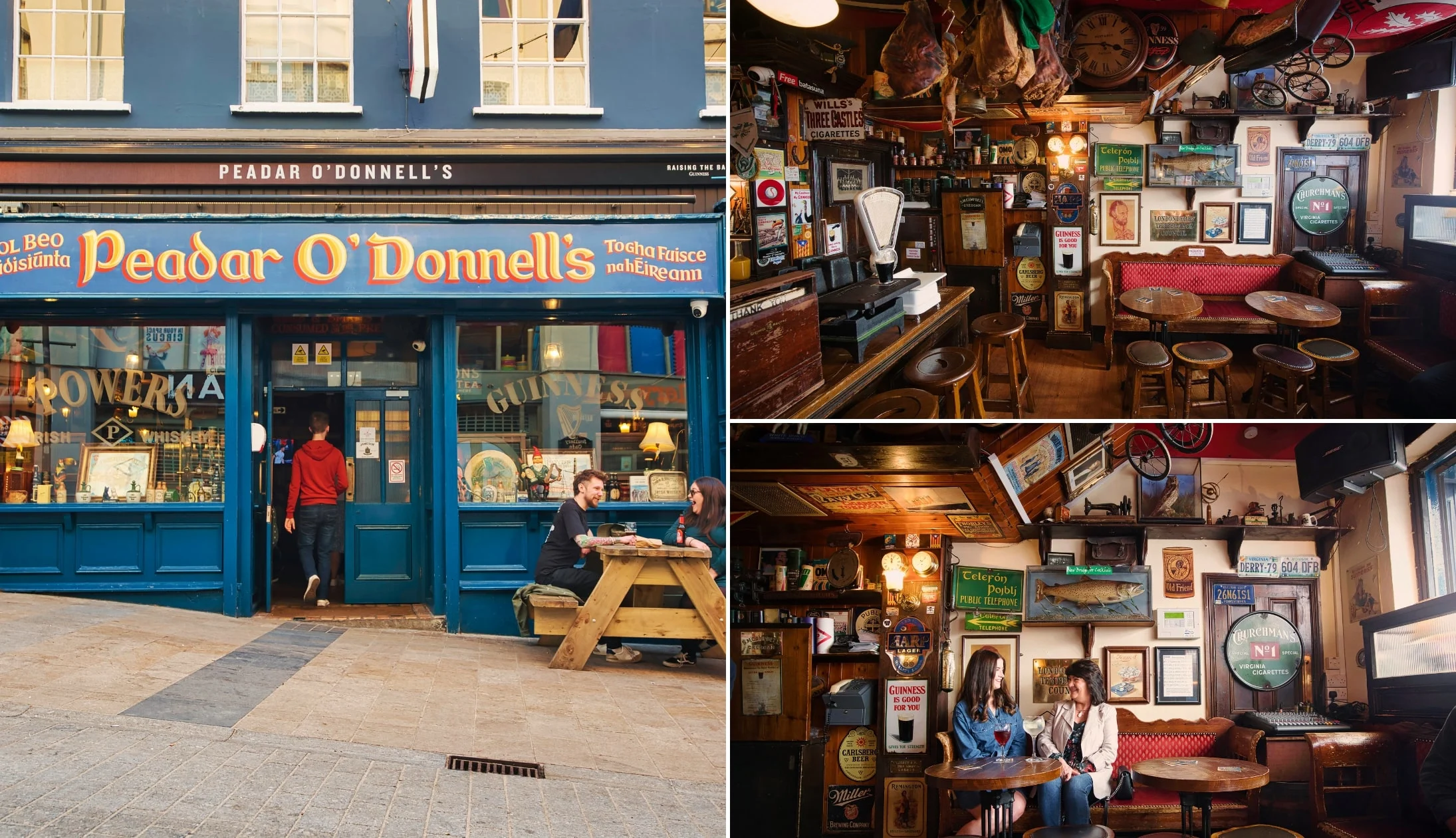
Photos courtesy of Tourism Northern Ireland
Now that you’ve seen the main sights and attractions in Derry City, it’s time to hit the town and enjoy some dinner, drinks, and live music.
Our Derry food recommendations
There’s no shortage of great places to eat out in Derry. If you didn’t check out Ship’s Quay for lunch, it’s also a good choice for dinner, with a larger, more varied menu.
If you’re up for a little fine dining, Browns Bonds Hill is a good choice, with a seasonal menu of beautifully cooked and presented dishes.
For a more laid-back feed, drop by Badgers Bar and Restaurant (check out the Derry Girls Mural on the back wall if you haven’t already!).
Our Derry pub recommendations
Whenever we’re in Derry, we try to drop by Walled City Brewery. It’s a fantastic little brewpub that offers a range of gorgeous beers, mostly brewed on-site.
For a more traditional pub experience, get down to Blackbird, where you’ll find retro decor and a superb gin and whisky selection, as well as cocktails, craft beers, and much more.
Grand Central Bar is another good choice, a cosy little old-school bar with excellent Guinness and regular impromptu trad sessions.
First of all, check out the Dungloe Bar, considered by many to be the best in the city for music. Peader O’Donnel’s is also worth a shot, a quirky and lively bar with live music every Saturday. Right next door, you’ll find The Gweedore Bar, which also does excellent live music on the weekends.
Day 3: The trip to Belfast
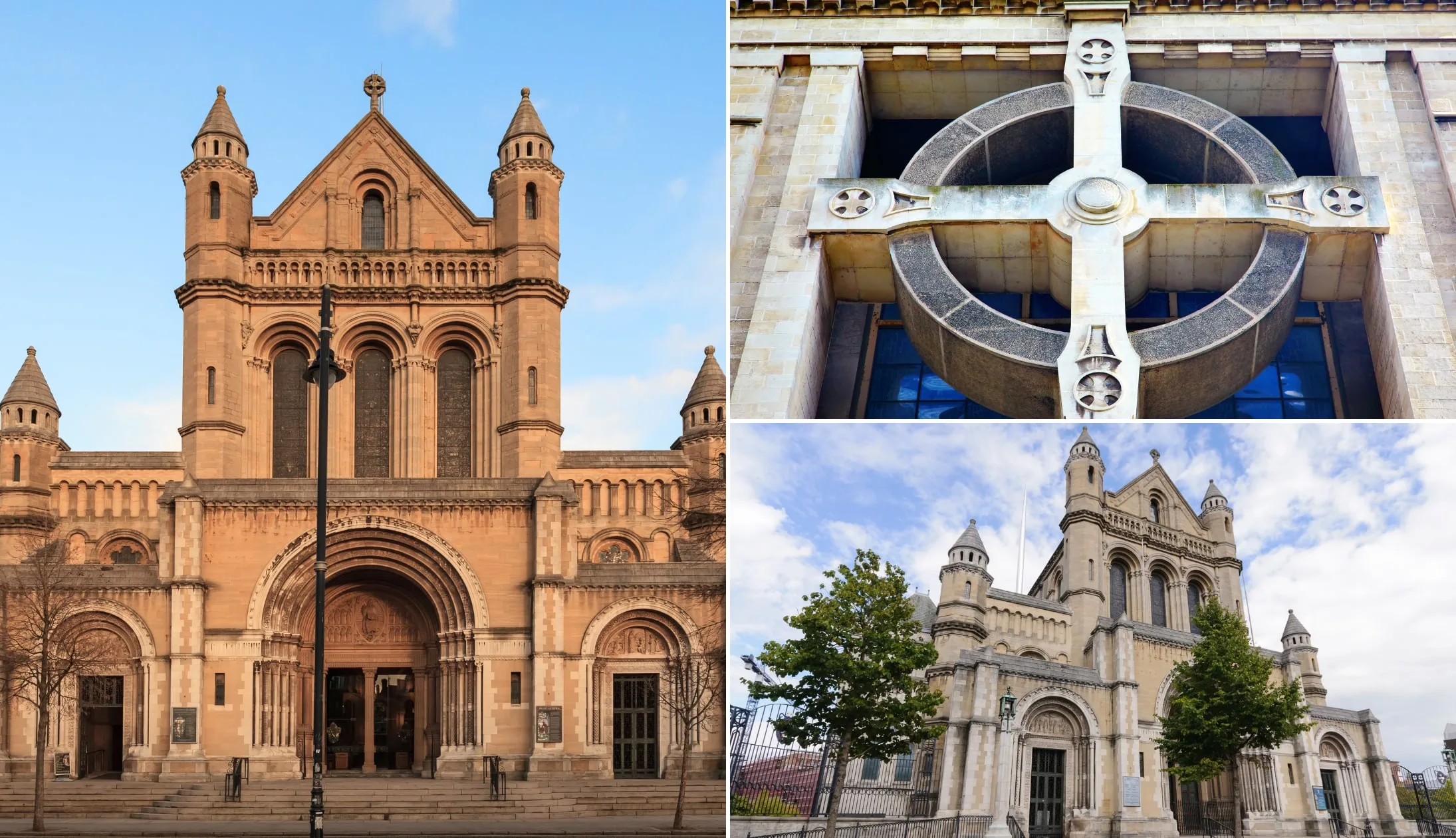
Photos via Shutterstock
After a short but sweet stay in Derry, we’re on the road again, this time to Belfast, the capital of Northern Ireland. You’ll be staying three nights in Belfast.
Let’s start the day right with a slap-up breakfast. Most places you’ll stay offer a good breakfast, but if you prefer to eat out, check out the Scullery Cafe in the town centre for a fabulous full Irish fry. Hidden City Cafe is another top choice, and while they also offer a great fry-up, you’ll find several lighter dishes too, like their gorgeous smoked salmon and scrambled eggs, as well as several veggie options.
Our Belfast accommodation recommendations
- Budget: Vagabonds Hostel(in the city centre with top reviews) and Amica Guesthouse (short bus/drive from the city centre with great reviews)
- Mid-range: Ten Square Hotel and Maldron Hotel Belfast City (both are super central with exceptional reviews)
- Luxury: The Fitzwilliam and The Merchant (both gorgeous, high-end hotels at the heart of the action)
Stop 1: Get the train from Derry to Belfast
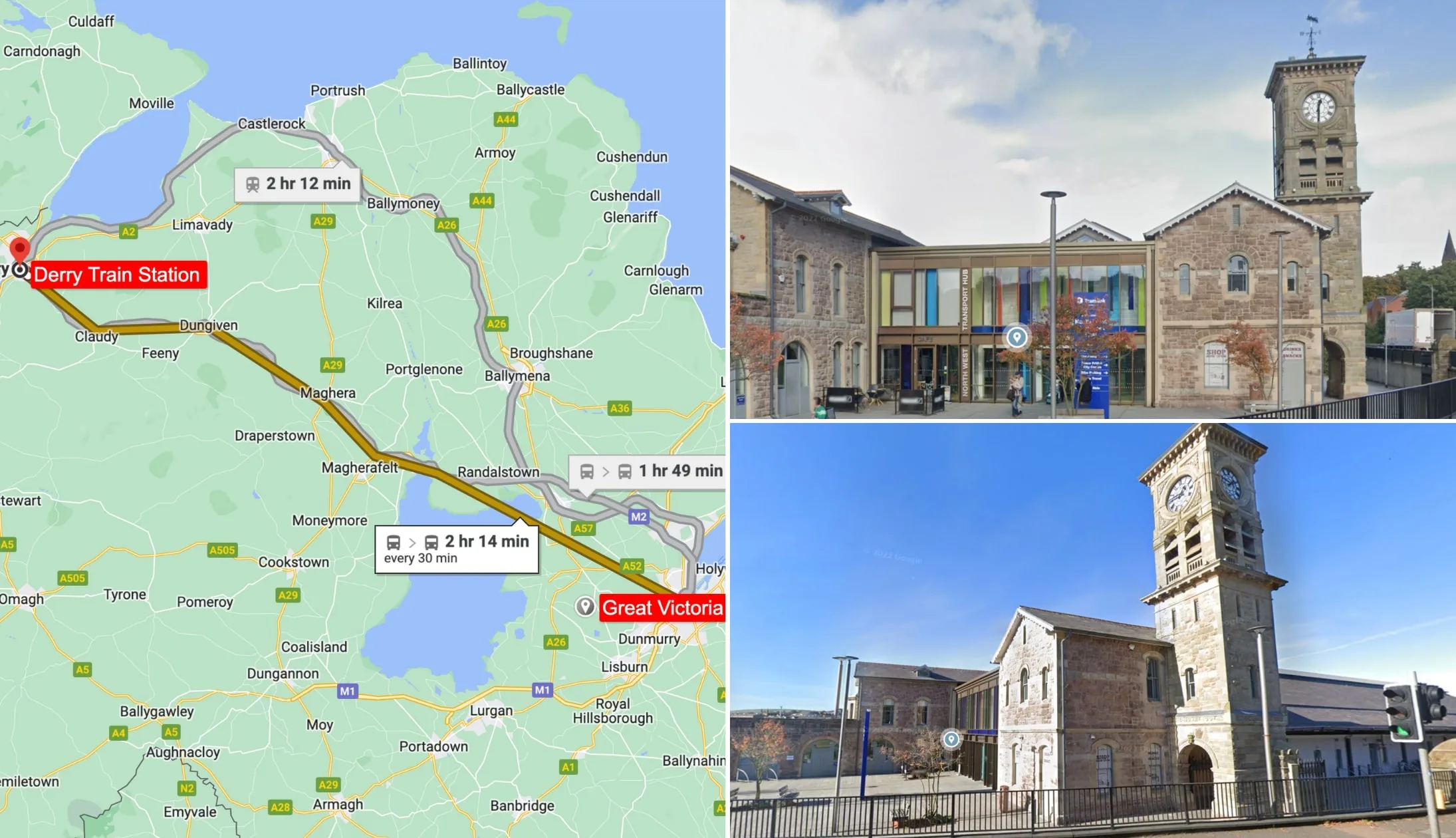
Photos via Google Maps
If you’re staying in the old town, be sure to cross the Peace Bridge as you head to the station, which is about a 20-minute stroll from the town centre. If you’re pressed for time, you can always take a taxi from your accommodation.
You’ll be taking a nice scenic train journey from Derry directly to the centre of Belfast. Jump on NI Railways Translink Line 3, and enjoy coastal scenery as you leave Derry before cutting through the lush green countryside. The train normally takes around 2.5 hours and costs £13 one-way.
The train stops at all the major Belfast stations, including Yorkgate, Lanyon Place, and Great Victoria Street. The last two are the most central, but check which one is closest to your accommodation and jump off there.
Each of these stations is well-served by bus and city train lines, as well as taxis, making it easy to get around. Head to your accommodation, check in, and drop your stuff off before heading back into town for our first attraction of the day.
Stop 2: Crumlin Road Gaol
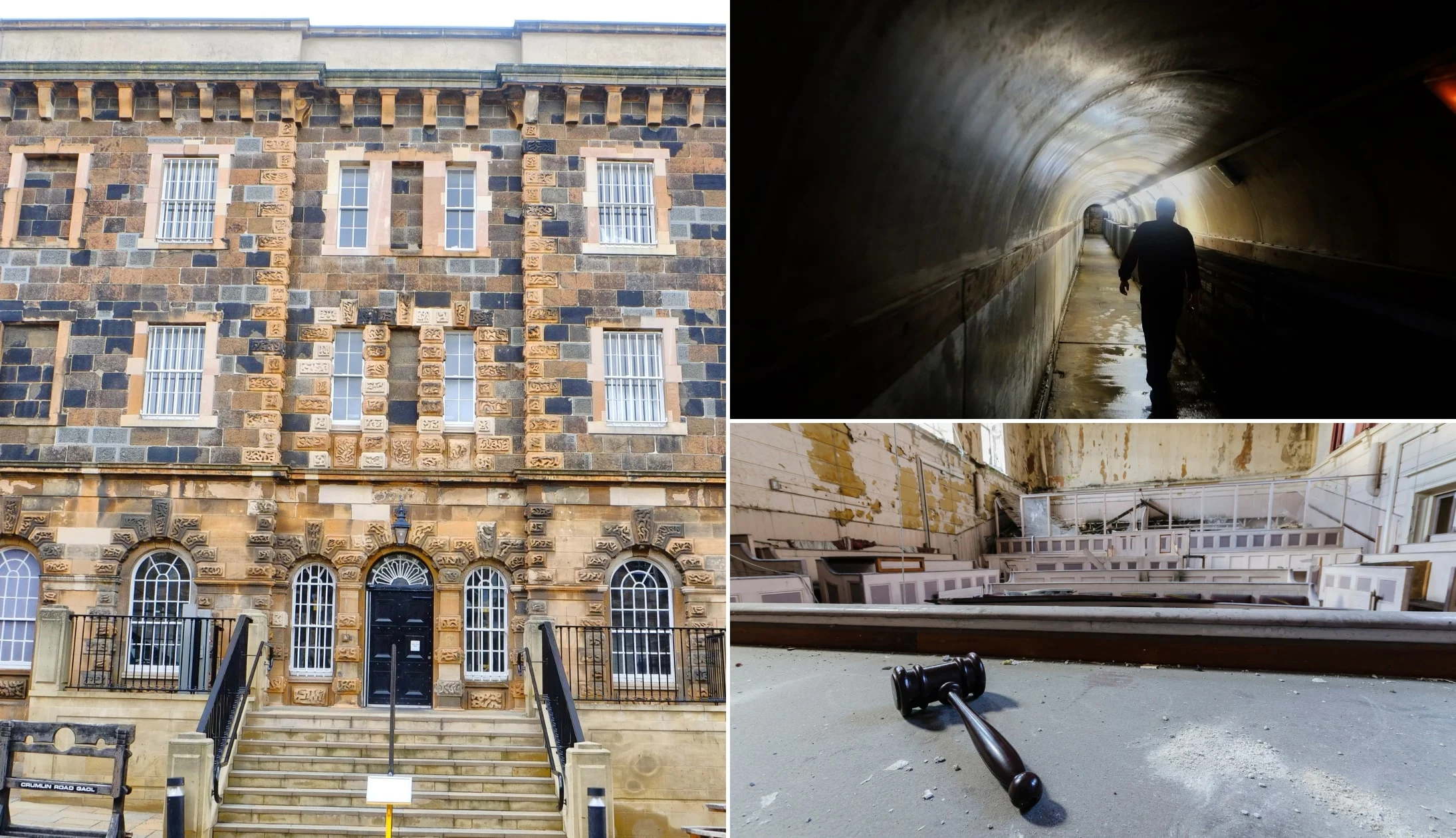
Photos via Shutterstock
Once you’ve settled in Belfast, it’s time to take in some local attractions. Crumlin Road Gaol is a leisurely 16-minute walk away from the city centre.
The self-guided tour takes you on a 70-minute journey through the tunnels and corridors that make up the 150-year-old prison. Complete with information boards and videos, you’ll get to see various parts of the old gaol, including the holding cells, execution chamber, and the prison graveyard.
Stop 3: Lunch
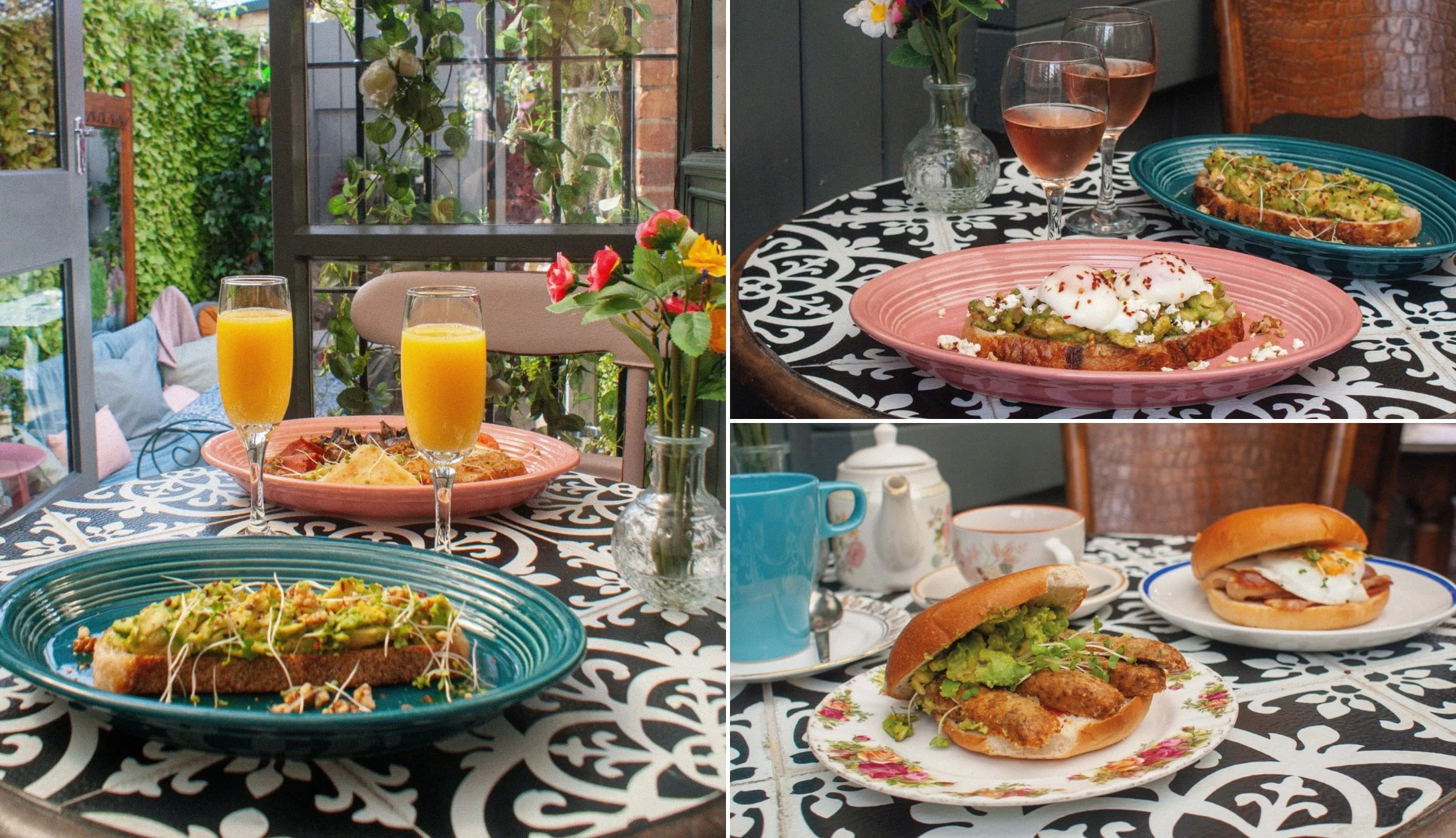
Photos via The Lamppost Cafe on FB
You’ll probably have a mighty hunger after that busy morning. Fortunately, there’s no shortage of stunning places to eat out, especially in the city centre. So, first things first, head to the heart of town, around a 16-minute walk from Crumlin Road Gaol.
You can shave a bit of the walking time off by hopping on a bus at Mater Hospital Station to Central Library. Look for Translink route 11 or 12, or ask the driver. Alternatively, Translink routes 12 and 1 depart from Carlisle Circus Antrim Road station, just around the corner, and also stop at Central Library.
Almost any good pub will do traditional Irish fayre, so if you’re looking for gorgeous soup with soda bread, seafood, stews, and much more, you’ll have plenty of choices. Burger fans should definitely check out Bunsen on Hill Street. With a small, carefully curated menu, you can’t go wrong. Blu is another great choice, with a sleek and modern menu that caters to everyone, although for us, it’s hard to resist the steaks!
Stop 4: Belfast Black Cab Tour
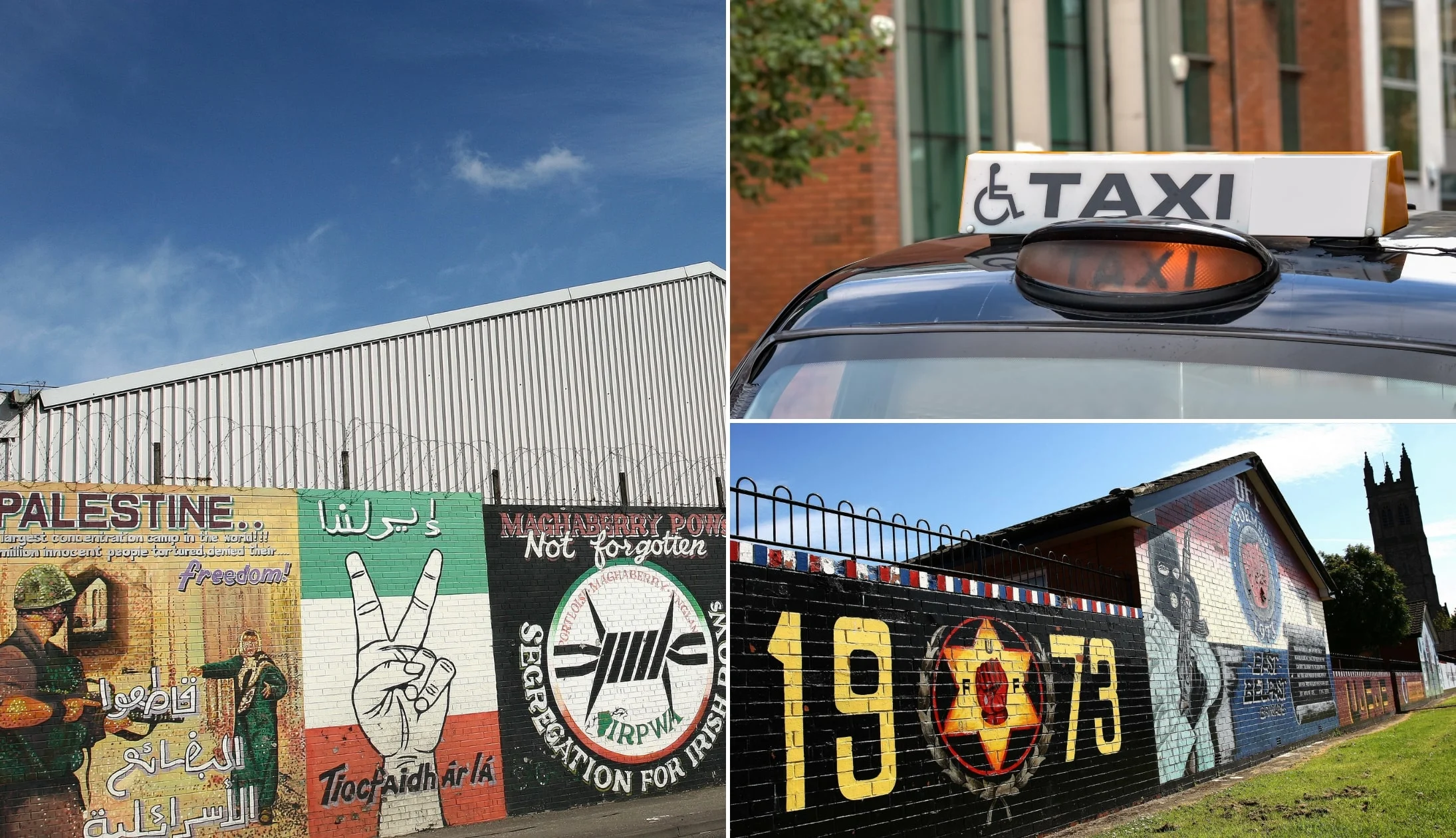
Photos via Shutterstock
Belfast Black Cab tours offers an incredible experience that shouldn’t be missed. Each of the tour guides lived through the Troubles, lending real-life experience to the tours.
You’ll pass through various parts of Belfast that you might not feel comfortable visiting by yourself. All the while, your guide will regale you with stories and first-hand accounts of the history behind each place.
You’ll also see a lot of fantastic murals and other sights, like the iconic Belfast Peace Wall. It’s a great way to learn more about Belfast’s long, rich, and sometimes sad history.
When you book the tour they’ll explain where they’ll pick you up (they’re usually fairly flexible).
Stop 5: St. Anne’s Cathedral

Photos via Shutterstock
The Belfast Black Cab Tour should drop you back in the Cathedral Quarter, just a short walk away from St Anne’s Cathedral.
This is the focal point of the Belfast Cathedral Quarter and is unusual because it serves two separate dioceses (an ecclesiastical district under the jurisdiction of a bishop) and therefore has two bishop’s seats.
Dating back to 1899, the cathedral is popular both as a place of worship and with tourists. Built in the Romanesque style, it’s characterised by its semi-circular arches and attracts its fair share of visitors thanks to its wealth of interesting features, such as the Spire of Hope, the Titanic Pall, and the Tomb of Lord Carson.
Stop 6: Dinner, drinks and live music
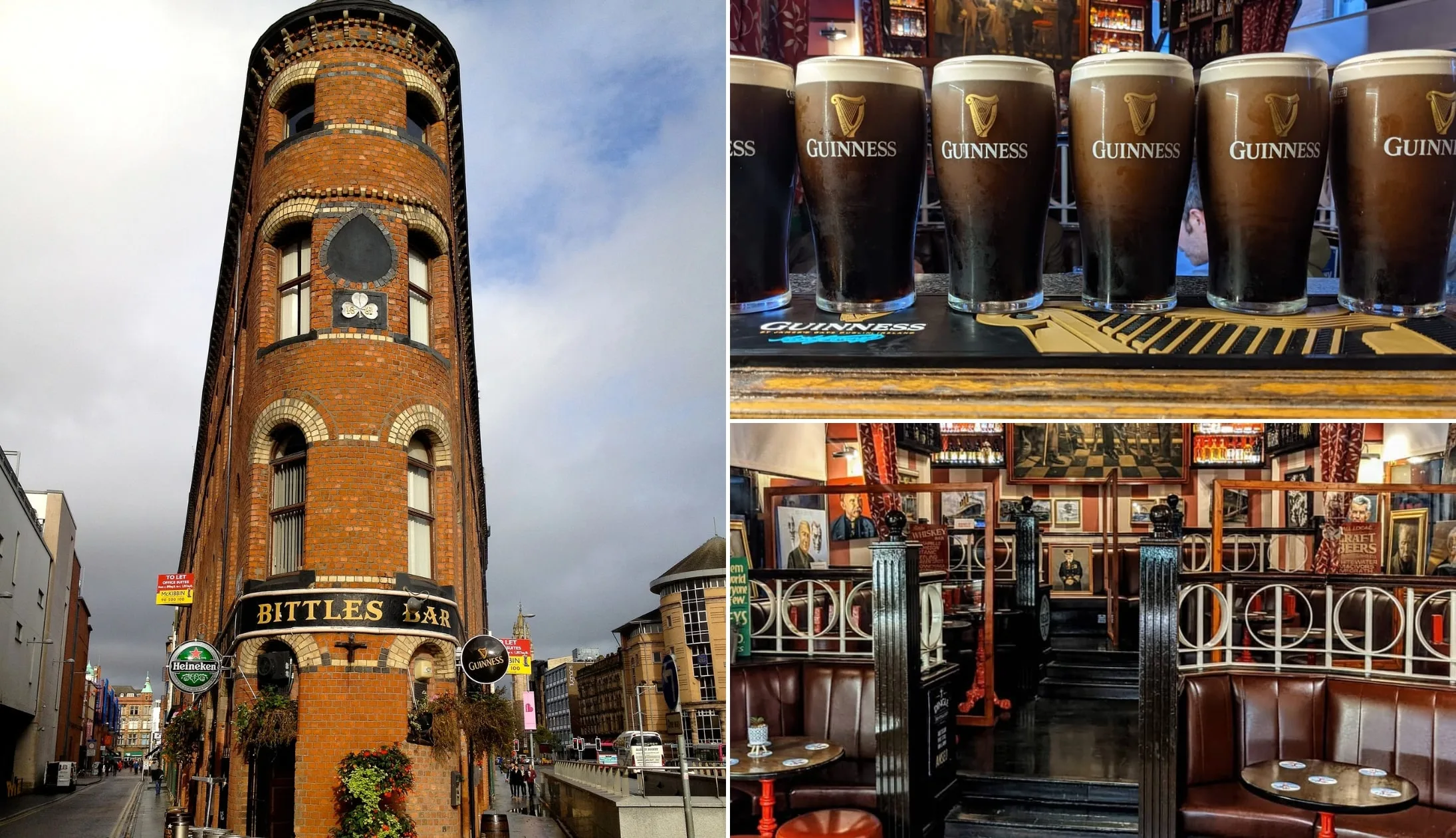
Photo left: Silvia Franceschetti (CC BY-SA 3.0). Others via Bittle’s Bar on FB
You’ll find tons of options for food, drink, entertainment, and plenty of live music back in the Cathedral Quarter, so whether you go back to your accommodation to freshen up first or head straight out is up to you.
Our Belfast food recommendations
There’s some outstanding restaurants in Belfast City. First up, Deanes is a Belfast institution and a must-visit while you’re in the city. There are three venues to choose from, each focusing on something different; Deanes Meat Locker, Deanes Love Fish, and Deanes at Queens.
Whichever you choose, you’re in for a fine feed. EDO is another favourite of ours, a stunning tapas and cocktail bar with incredible sharing platters.
Or, for a fancy meal, head to The Ginger Bistro, near the Belfast Opera House. Their menu is out of this world, though that’s no surprise when you consider it was voted the best restaurant in Northern Ireland.
Our Belfast pub recommendations
There are countless incredible pubs and bars in Belfast for a tasty after-dinner tipple. Check out traditional options like the unmistakable Bittles Bar, with its stunning range of local beer and Irish whisky.
The Duke of York is another old-school boozer, walls adorned with knick-knacks from yesteryear and serving up a fine pint of Guinness.
Finally, we couldn’t forget Madden’s Bar, a cosy, traditional pub complete with a roaring wood-burning stove and a friendly atmosphere. Somewhat overlooked, it’s a hidden gem, beloved by those in the know!
Traditional musicians from across Ireland come to play at Kelly’s Cellars every Tuesday, Wednesday, Thursday, and Saturday.
Other fantastic options for music include Fibber Magees, another charmingly old-fashioned pub with a lively atmosphere, and the John Hewitt.
Day 4: Belfast City
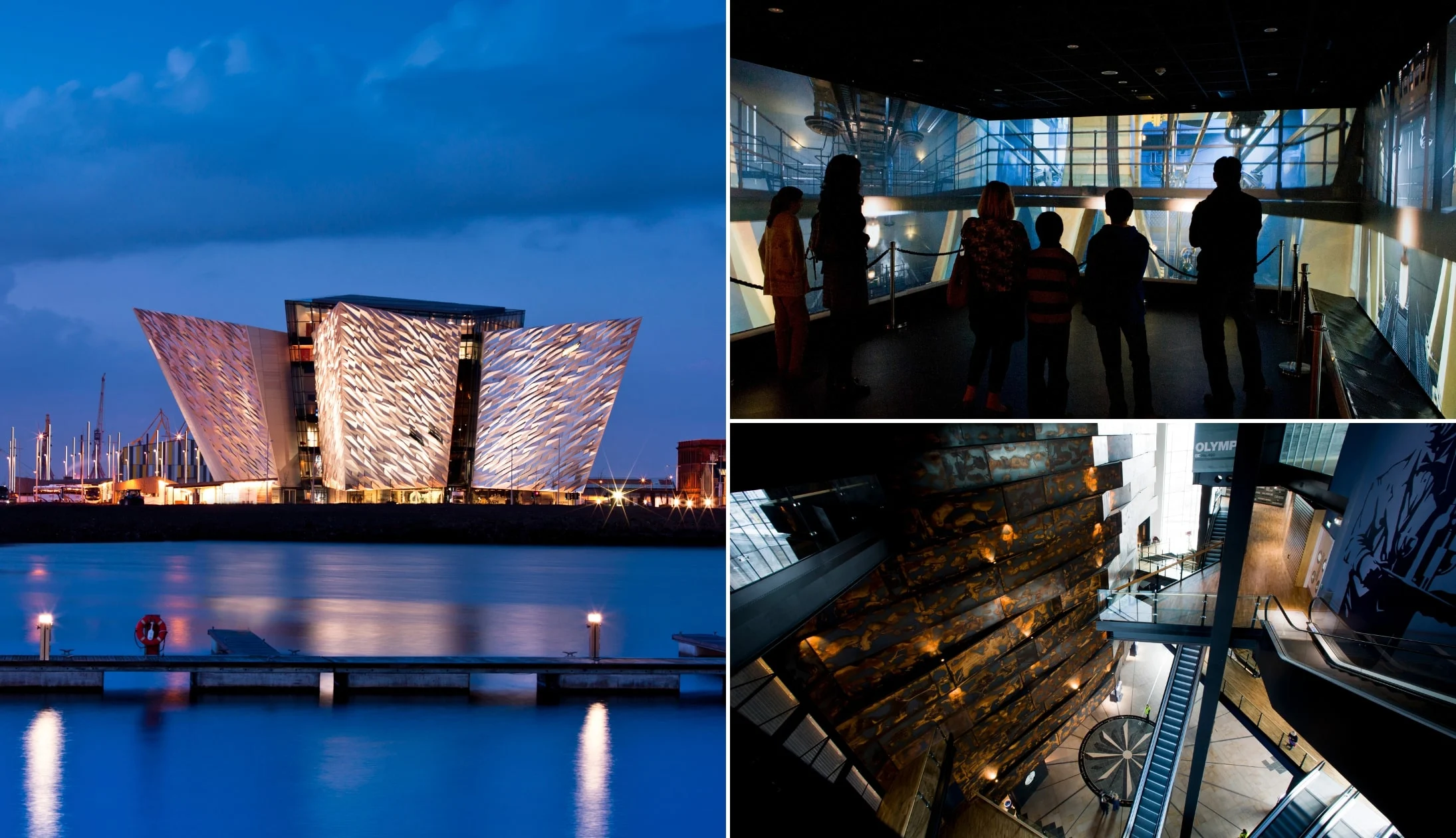
Photos by Chris Hill via Tourism Ireland
We’ve got a pretty active day today and you’ll get the chance to stretch your legs on some of the best walking trails in and around Belfast City. It might be worth grabbing some snacks and water from a shop before you head out on your first hike.
We’ve got quite an active day lined up, so you’ll want to grab a hearty breakfast at your accommodation or in a nearby cafe. We’d recommend Established Coffee on Hill Street for a decent selection of cooked breakfasts, great coffee, and pastries. Alternatively, The Pocket on Upper Church Lane does a stunning full Irish fry and a bunch of veggie and vegan options.
Once you’ve had a good feed, it’s worth stocking up on water and snacks, as you’ll be out walking for a lot of the day.
Stop 1: Get the bus up to Belfast Castle
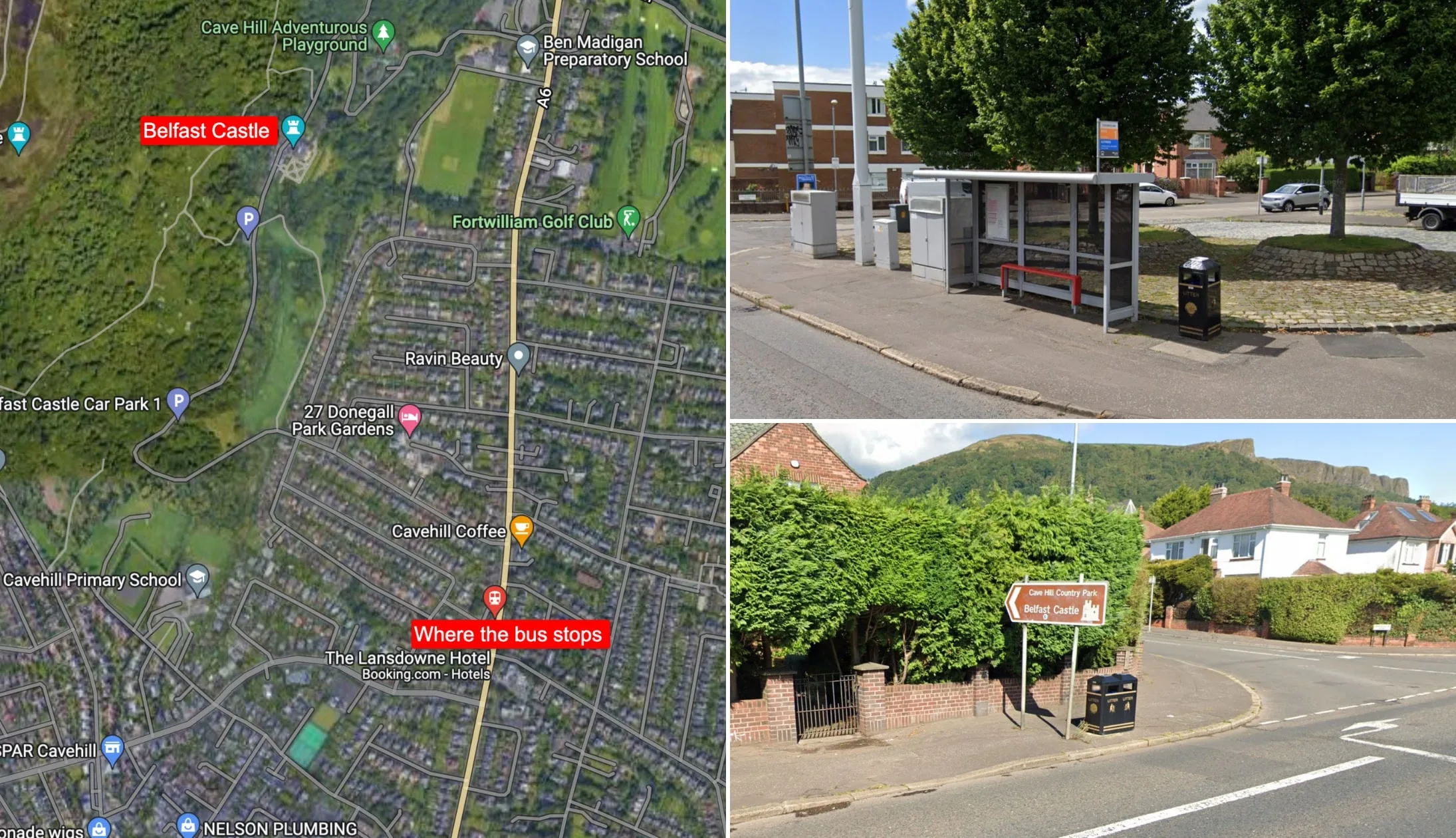
Photos via Google Maps
There are several direct bus options that’ll take you from the city centre to Belfast Castle and the start of the walk we’ll be doing this morning.
The journey should take around 30 minutes or so by bus. Catch the Translink Metro Bus Route 1a departing from Upper Queen Street or Victoria Square in the centre of Belfast, and hop off at Strathmore Park stop on the Antrim Road.
From there, the route to the Castle is clearly signposted.
Stop 2: The Cavehill Walk

Photos via Shutterstock
The Cavehill walk is hands down one of the best walks in Belfast, offering those that conquer it unbeatable views out over Belfast City. Now, there are several different trails to tackle at Cavehill Country Park, with each ranging in difficulty level, but the most popular is a circular route that starts and ends at Belfast Castle.
Depending on your pace and the weather, this walk should take between 1.5 and 2 hours minimum. The walk is a circular route that is a distance of 4.5 miles. Allow at least 2 hours to be safe. The Cavehill Walk is challenging, and a good level of fitness is needed. The paths are unsurfaced and steep in parts, so good walking boots are advised, especially if it’s a wet day.
Stop 3: Belfast Castle
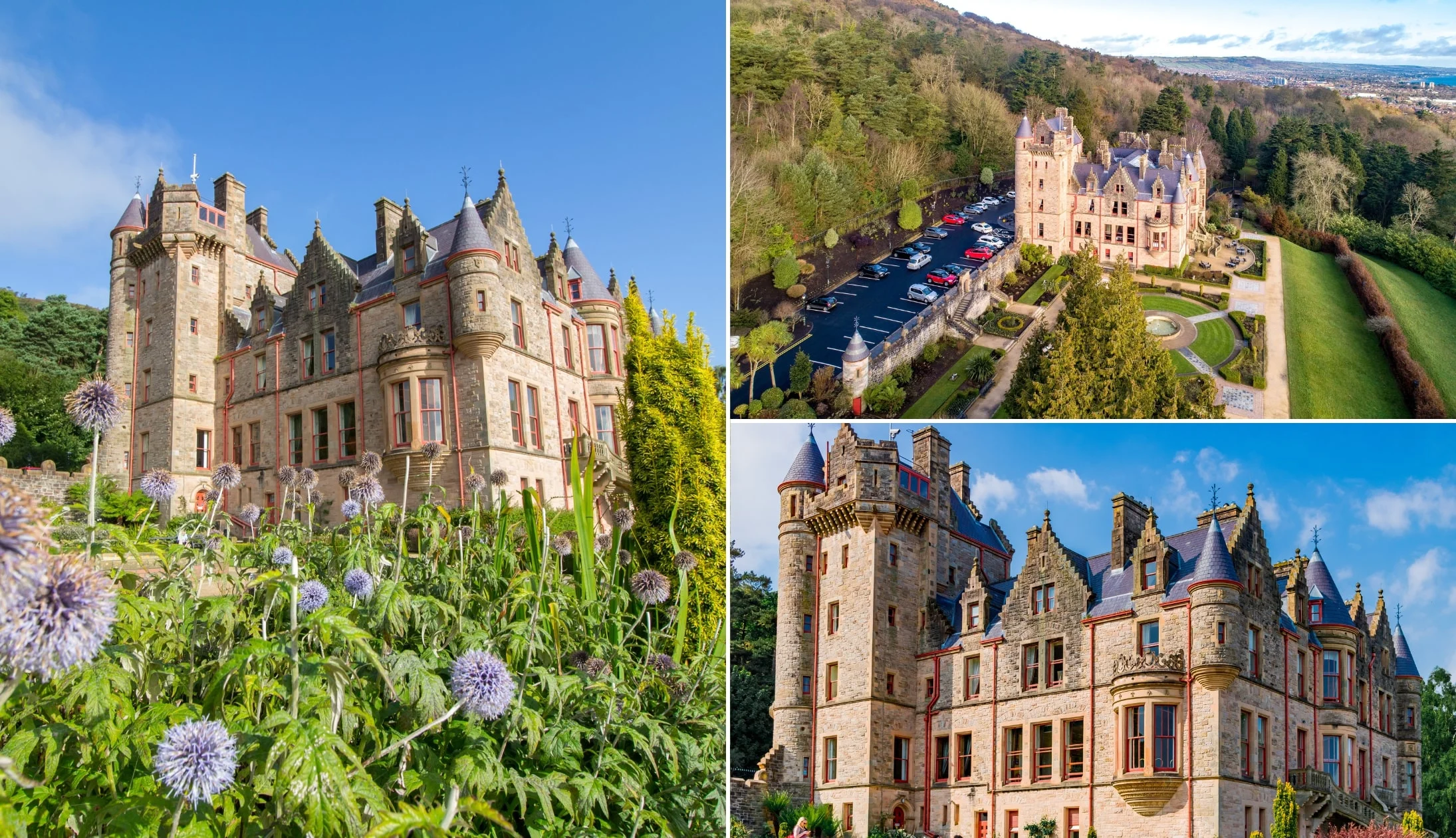
Photos via Shutterstock
After enjoying your walk, why not take a look around the Disney-esque Belfast Castle? The gorgeous turreted castle dates back to 1862, although a castle has stood on this site since the 12th century. The current iteration is absolutely stunning inside and out, and it’s well worth taking a self-guided tour of the gorgeous grounds, gardens, and public rooms on the ground and first floors.
Be sure to head up to the second floor to check out the Cave Hill Visitor Centre too. It’s free to visit and has four rooms of exhibits and an 8-minute film about Cave Hill and Belfast Castle. In fact, there’s no fee at all to visit the castle, though you may want to take some cash for the cafe!
Stop 4: The bus back into the city

Photos via Google Maps
When you’re ready, make your way back down to the street where you got off the bus and look out for Cavehill Coffee.
The bus stop is right outside of it. There are several buses that will take you back into Belfast City.
Stop 5: Lunch

Photos via The Lamppost Cafe on FB
Once you’ve finished up at the castle, jump back on the same bus back into town and explore the Cathedral Quarter. The beating heart of Belfast, you’ll find plenty of great places to grab lunch. If you’re lucky enough to be in town on a Friday, Saturday, or Sunday, be sure to drop by St George’s Market, a short 5-minute walk from the Victoria Square bus stop.
This vibrant marketplace boasts deliciously fresh produce and a wealth of arts and crafts. It’s also home to some great places to eat, serving up an array of dishes, from soup and seafood to foreign cuisine and pies. Alternatively, check out The Lamppost Cafe for some comforting home-cooked dishes, including a number of vegan options.
Stop 6: SS Nomadic
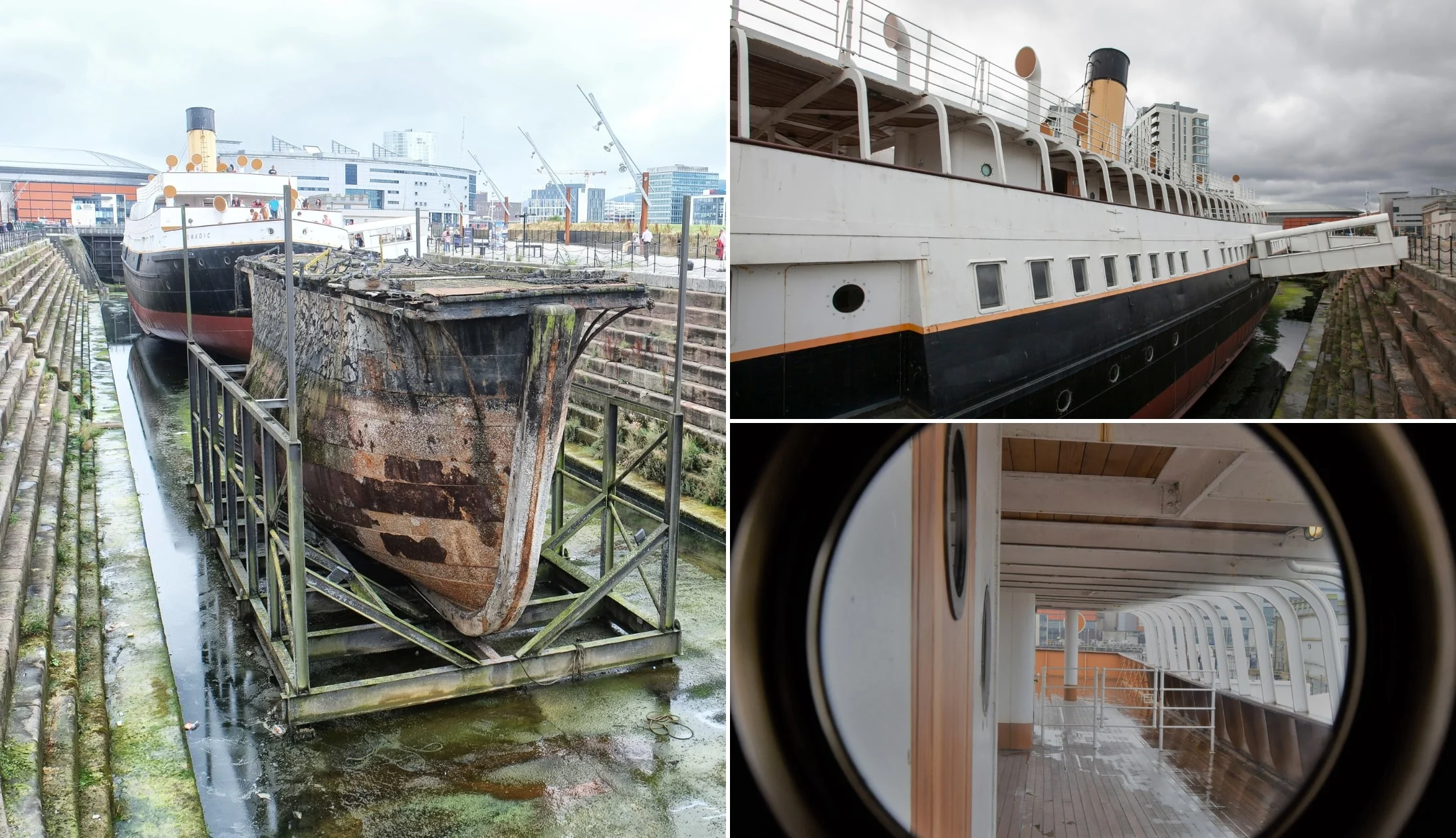
Photos via Shutterstock
After enjoying a tasty lunch, it’s a 20-minute walk to our next stop, SS Nomadic. The SS Nomadic is moored at Hamilton Dock in the Titanic Quarter of Belfast and is part of the Titanic Experience, the next stop after this. Admission to the SS Nomadic is included in your ticket to the Titanic Experience, though you can pay an additional £10 for a guided tour.
SS Nomadic has a long and interesting history. Launched in 1911, it was originally used to ferry passengers onto cruise liners, including the Titanic. During the war, it served as a minesweeper in France. It’s a fascinating ship to walk around, and there are loads to see along the way.
Stop 7: Titanic Experience

Photos by Chris Hill via Tourism Ireland
Just a 5-minute walk from SS Nomadic, the Titanic Experience is one of Belfast’s most popular attractions. Located right on the slipways where RMS Titanic was designed, built and launched, the enigmatic Titanic Museum tells the now-infamous story incredibly well. Visitors can expect exhibits, replica staterooms, photos, documents and 21st-century technology. You’ll see, hear and even SMELL the shipbuilding process during your tour!
Stop 8: Dinner, drinks and live music

Photo left: Silvia Franceschetti (CC BY-SA 3.0). Others via Bittle’s Bar on FB
You’ll find tons of options for food, drink, entertainment, and plenty of live music back in the Cathedral Quarter, so whether you go back to your accommodation to freshen up first or head straight out is up to you.
Our Belfast food recommendations
There’s some outstanding restaurants in Belfast City. First up, Deanes is a Belfast institution and a must-visit while you’re in the city. There are three venues to choose from, each focusing on something different; Deanes Meat Locker, Deanes Love Fish, and Deanes at Queens.
Whichever you choose, you’re in for a fine feed. EDO is another favourite of ours, a stunning tapas and cocktail bar with incredible sharing platters.
Or, for a fancy meal, head to The Ginger Bistro, near the Belfast Opera House. Their menu is out of this world, though that’s no surprise when you consider it was voted the best restaurant in Northern Ireland.
Our Belfast pub recommendations
There are countless incredible pubs and bars in Belfast for a tasty after-dinner tipple. Check out traditional options like the unmistakable Bittles Bar, with its stunning range of local beer and Irish whisky.
The Duke of York is another old-school boozer, walls adorned with knick-knacks from yesteryear and serving up a fine pint of Guinness.
Finally, we couldn’t forget Madden’s Bar, a cosy, traditional pub complete with a roaring wood-burning stove and a friendly atmosphere. Somewhat overlooked, it’s a hidden gem, beloved by those in the know!
Traditional musicians from across Ireland come to play at Kelly’s Cellars every Tuesday, Wednesday, Thursday, and Saturday.
Other fantastic options for music include Fibber Magees, another charmingly old-fashioned pub with a lively atmosphere, and the John Hewitt.
Day 5: The Causeway Coast
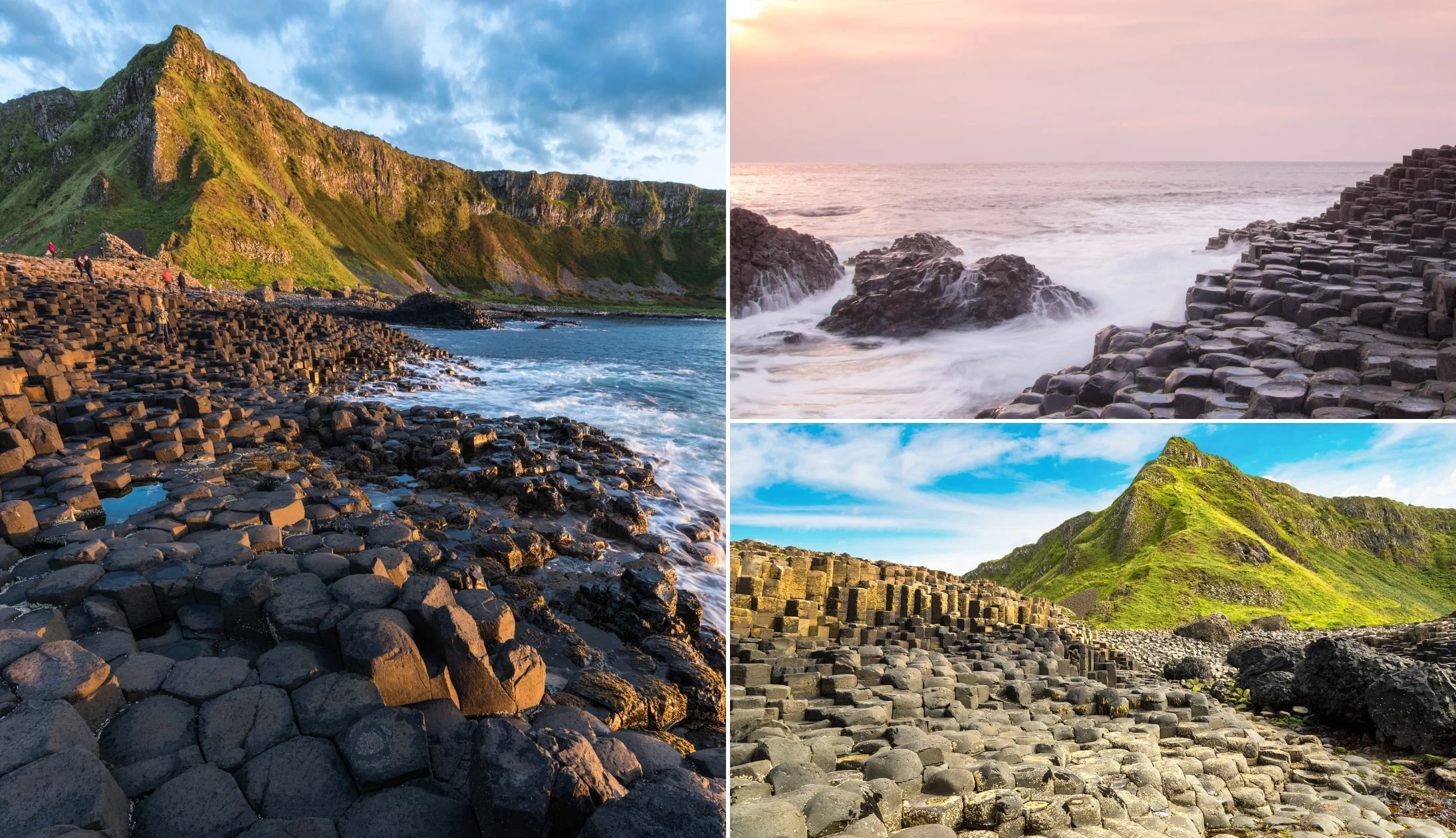
Photos via Shutterstock
After a fantastic day enjoying the sights of the city, it’s time to hit the road and check out the incredible Causeway Coast.
There are a bunch of tours to choose from, including ones that bring you to the Game of Thrones locations.
We’ve picked this 9.5-hour tour with exceptional reviews that does a full-day trip to the Giants Causeway while taking in a clatter of attractions along the way.
You’ve got an action-packed day ahead of you, so it’s a good idea to get a hearty breakfast in you before you start! We’d heartily recommend the Lamppost Cafe on Newtownards Road for a slap-up cooked Irish breakfast—they also have a cooked vegan breakfast.
Stop 1: Carrickfergus Castle
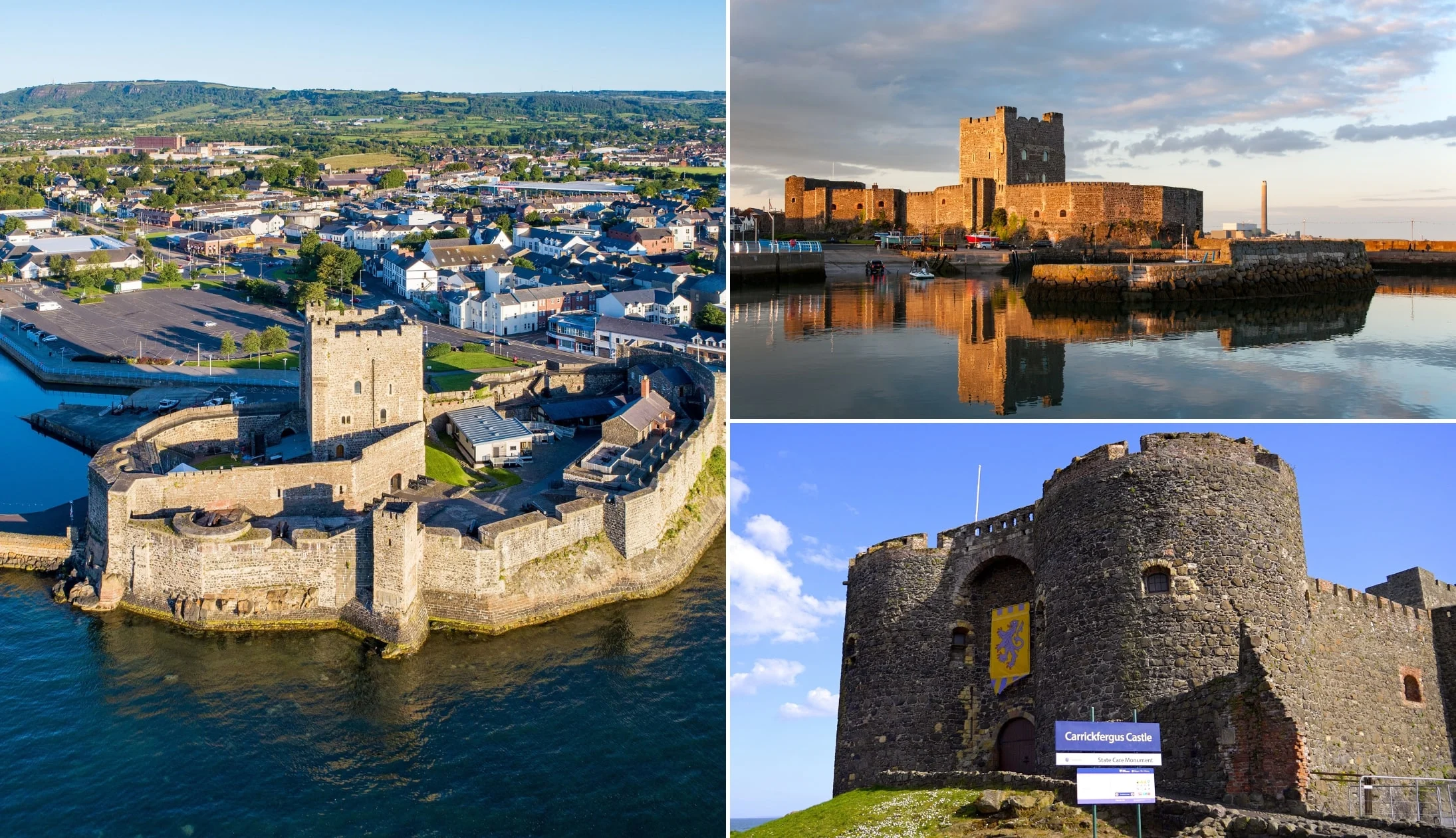
Photos via Shutterstock
Carrickfergus Castle is one of the most well-known and best-preserved castles in Ireland.
It’s just 25 minutes from Belfast City Centre, making it an ideal first stop on your way to the Causeway Coast. While you won’t be going in for the tour, you’ll get plenty of time to enjoy the surroundings and get some photos.
Dating back to the 12th Century, this epic fortress boasts huge walls that protect it from the sea, plus a number of mighty towers. It’s been the site of countless battles over the years, and it’s no surprise that it’s home to a ghost.
Stop 2: Cushendun Caves
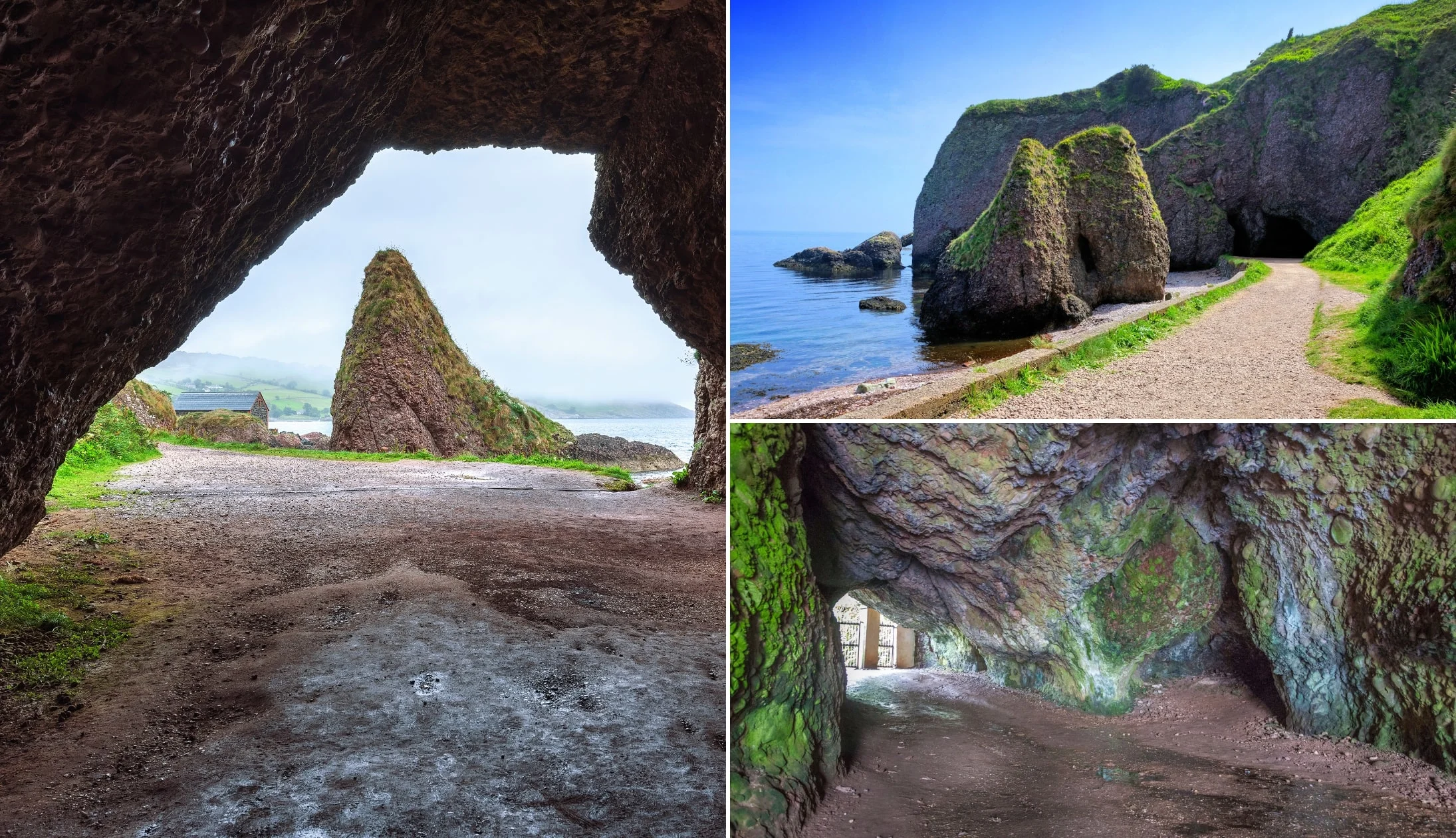
Photos via Shutterstock
The coast road is absolutely stunning between Carrickfergus Castle and your next stop, the Cushendun Caves, with sights like the epic Black Arch along the way.
Formed over hundreds of millions of years, these days, the caves are most famous for being one of many Game of Thrones filming locations in Ireland.
The caves formed the backdrop for the Stormlands and were the setting for a couple of important scenes from the series in season 2 and again in season 8.
While the place is incredibly impressive to explore, it’s not an overly large area, and most people only spend about 15-20 minutes getting around them. It’s also completely free to visit, which makes it a nice stop on the Causeway Coastal Route.
Stop 3: Carnlough
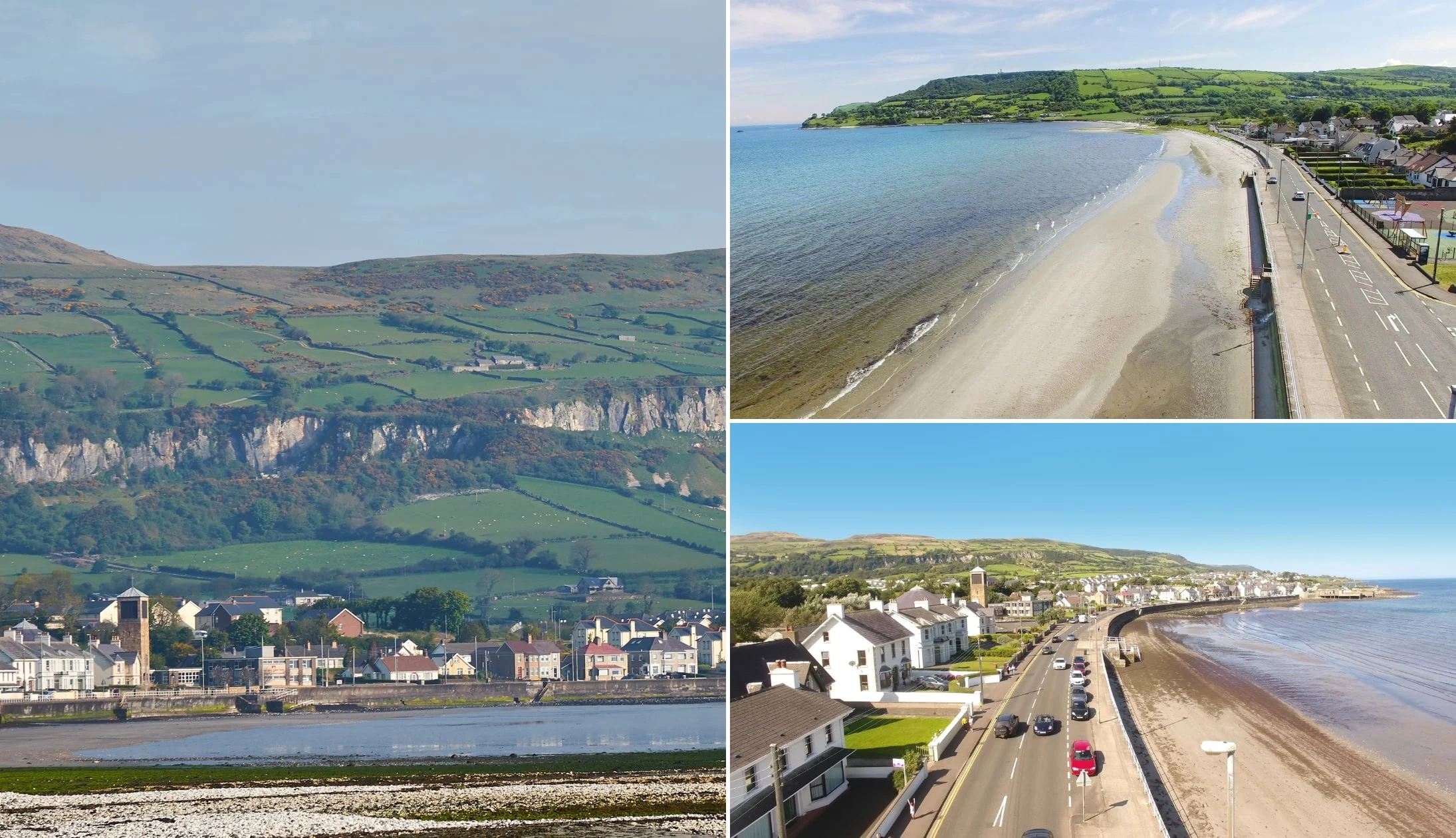
Photos via Shutterstock
The charming village of Carnlough is a top place to visit, and it’s located at the foothills of Glencloy. One of the 9 Glens of Antrim, it’s famed for its beautiful harbour, from which small fishing vessels and pleasure boats set out to sea.
The harbour was another Game of Thrones filming location and was used in several scenes in the show. If time allows, it’s worth strolling through the village and enjoying the gorgeous views from the waterfront.
Stop 4: Ballintoy for Lunch
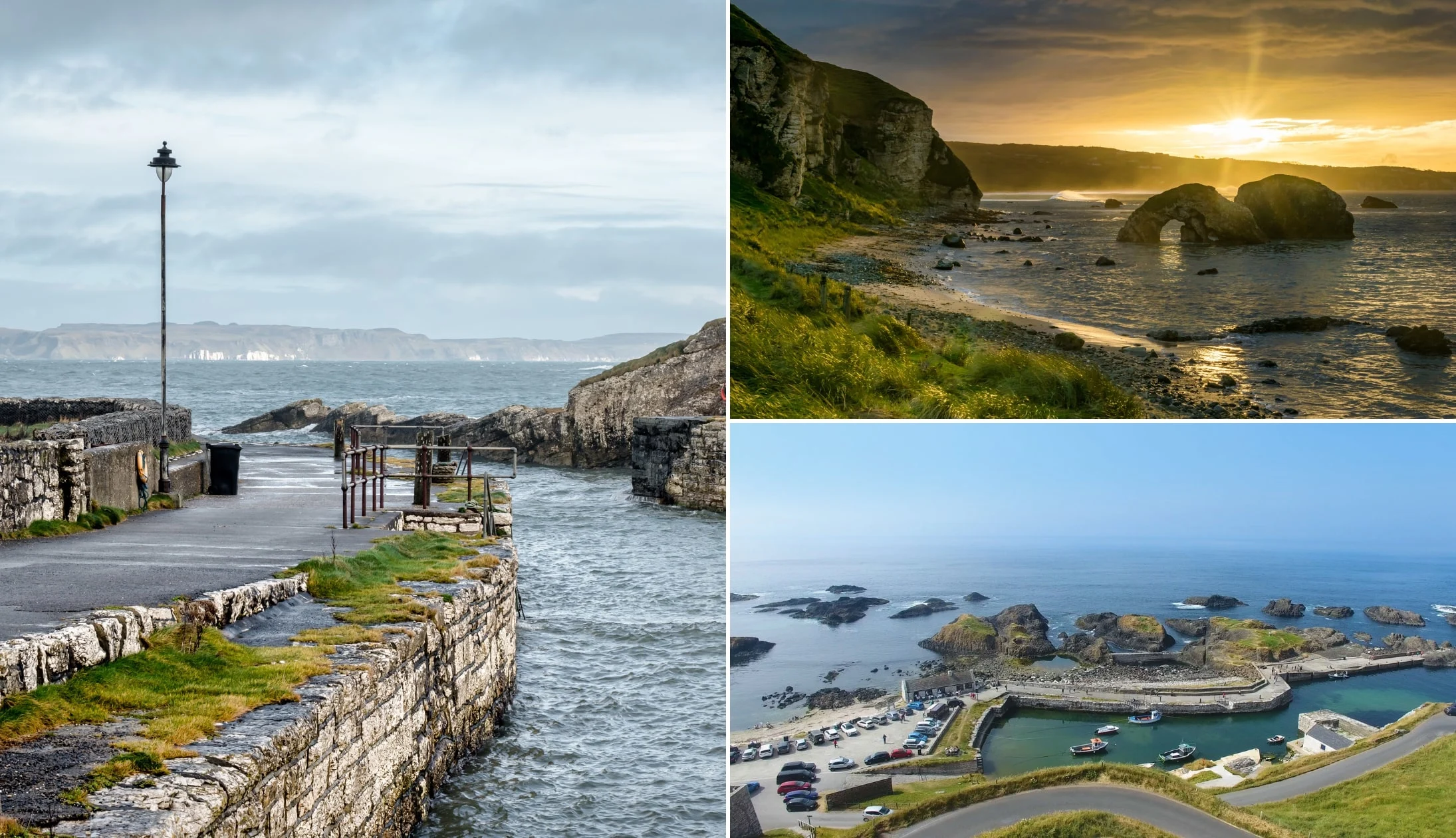
Photos via Shutterstock
The quirky Ballintoy Harbour is one of the more well-trodden stop-offs on the Causeway Coastal Route.
Based in the picturesque village of the same name, Ballintoy Harbour is home to everything from sea stacks and rocky islands to amazing cliff tops and more.
Of course, there’s a Ballintoy Harbour Game of Thrones link too! It was one of several filming locations and was used for the exterior Pyke shots and to stand in as the Iron Islands.
For lunch, you’ll be heading to the Fullerton Arms, where you’ll find a stunning menu that takes in a range of fresh seafood dishes, as well as steaks, pasta, burgers, pies, and much more.
Whenever we visit, the Strangford Rope Mussels served with Irish wheaten bread are a must, available in a variety of sauces.
Stop 5: Giants Causeway

Photos via Shutterstock
The legendary landscape of the Giants Causeway boasts more than 40,000 basalt pillars, jutting proudly out from the sea. In Irish folklore, the path was used by the hero Fionn Mac Cumhaill to get to Scotland, where he fought an enemy giant.
It was formed more than 60 million years ago and has been studied by geologists for more than 300 years, making it one of the most important and unique nature reserves on earth.
You’ll spend some time climbing over the ancient stones while your guide regales you with the myths and legends that surround this world-famous attraction.
Stop 6: Dunluce Castle
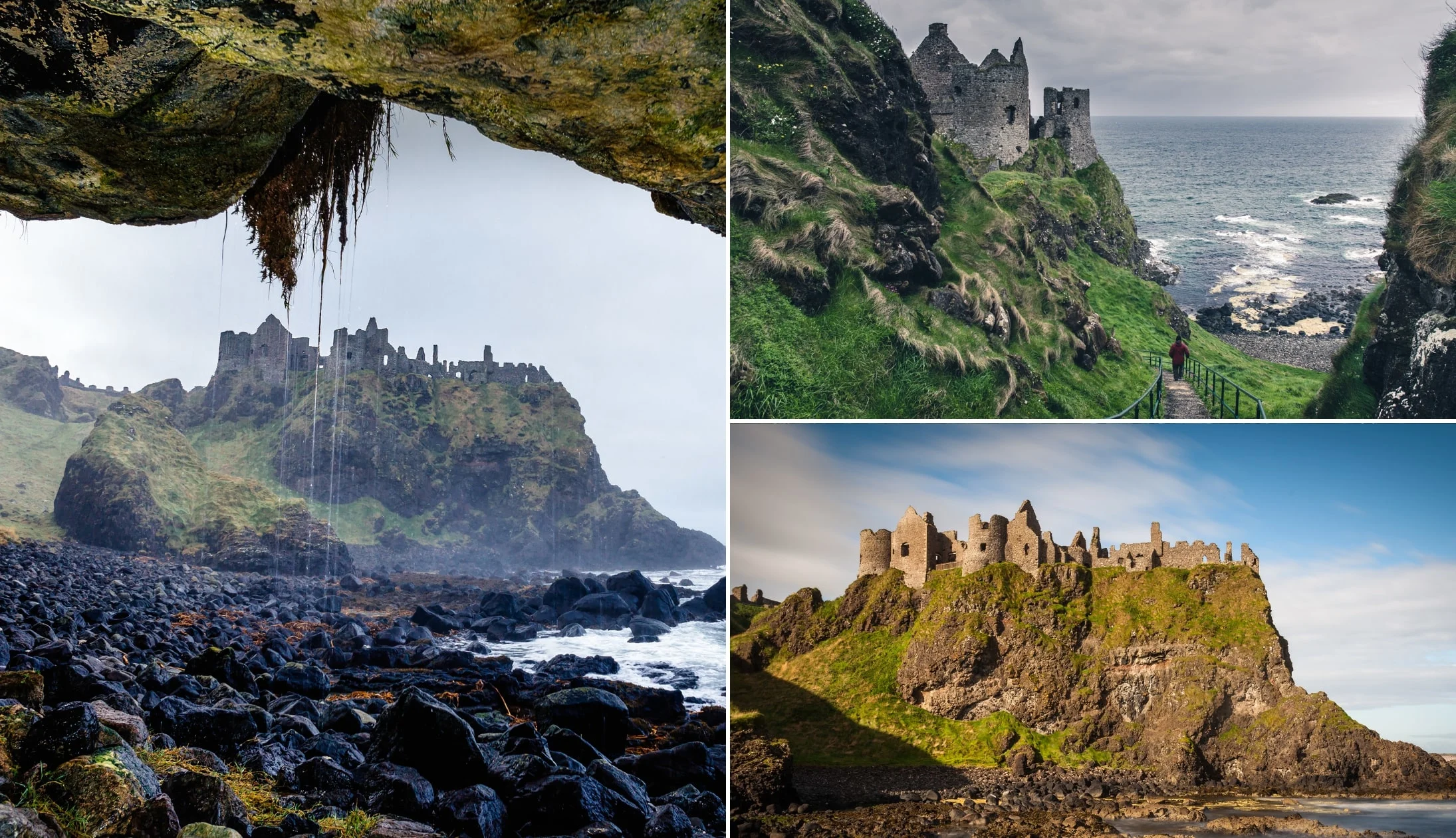
Photos via Shutterstock
Your next stop is the legendary Dunluce Castle. It’s a fantastic place to wander around, taking in the castle ruins and getting some nice photos. The castle dates back to the 1500s and is rich in history.
Of course, there are several legends, most notably the Dunluce Banshee, whose wails and screams are said to haunt the Northeast Tower.
It’s another top spot for Game of Thrones fans, too—the castle served as the Greyjoy fortress on the Iron Isles.
Stop 7: The Dark Hedges
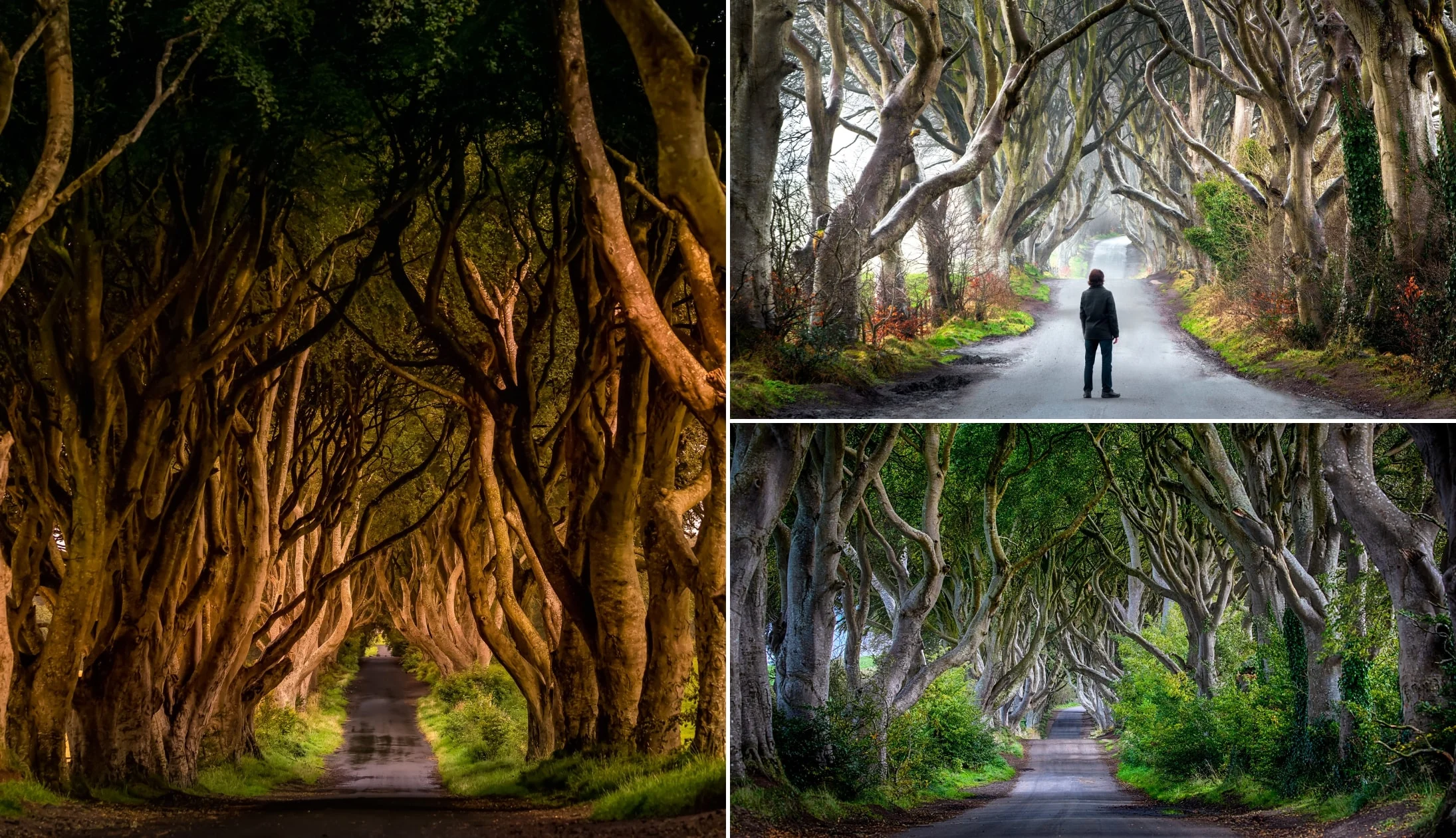
Photos via Shutterstock
Your final stop before heading back to Belfast is the epic Dark Hedges. It’s here that you’ll find an avenue lined with 150 beech trees that has delighted photographers, painters and directors for many a year.
Once again, there’s a big aul Dark Hedges Game of Thrones link! If you’re a fan of the insanely successful HBO series, then you’ll probably recognise the Dark Hedges as ‘The Kings Road’.
The avenue features in Season 2, Episode 1: ‘On the King’ s Road’. The Dark Hedges were featured during a scene where Arya Stark escaped from King’s Landing.
The hedges date to 1755 and were planted alongside the road running up to Gracehill House in an attempt to make the road up to the estate more formidable. Looks like it worked! Grab some photos, look out for the spooky Grey Lady, and then it’s back on the coach to Belfast for dinner and drinks.
Stop 8: Back to Belfast for the night
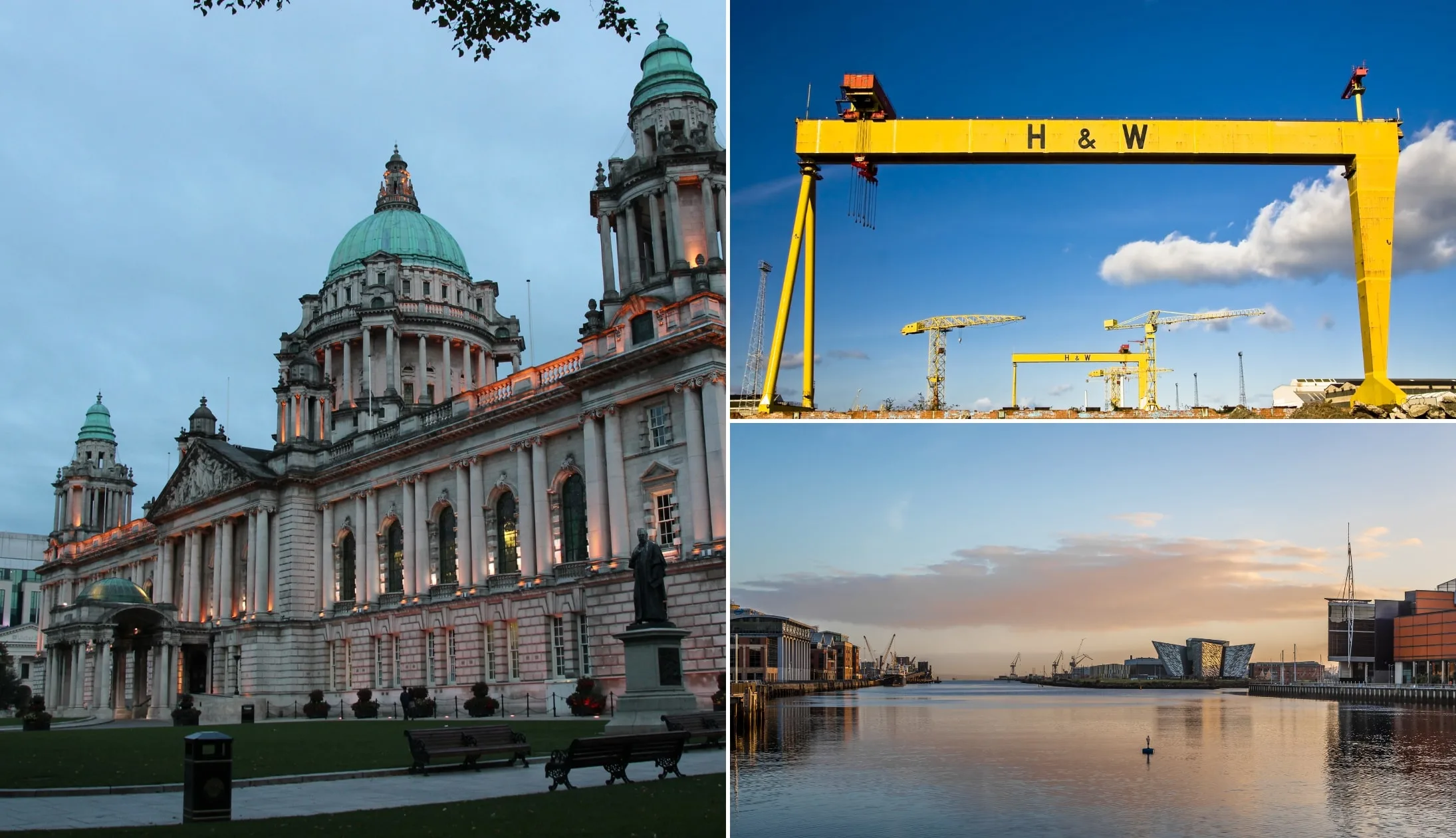
Photos via Shutterstock
Taking a more direct route back will have you in Belfast in about an hour and 30 minutes or so.
Once you’re there, you should have ample time to freshen up at your accommodation before hitting the town and getting some dinner and drinks in.
Our Belfast food recommendations
There’s some outstanding restaurants in Belfast City. First up, Deanes is a Belfast institution and a must-visit while you’re in the city. There are three venues to choose from, each focusing on something different; Deanes Meat Locker, Deanes Love Fish, and Deanes at Queens.
Whichever you choose, you’re in for a fine feed. EDO is another favourite of ours, a stunning tapas and cocktail bar with incredible sharing platters.
Or, for a fancy meal, head to The Ginger Bistro, near the Belfast Opera House. Their menu is out of this world, though that’s no surprise when you consider it was voted the best restaurant in Northern Ireland.
Our Belfast pub recommendations
There are countless incredible pubs and bars in Belfast for a tasty after-dinner tipple. Check out traditional options like the unmistakable Bittles Bar, with its stunning range of local beer and Irish whisky.
The Duke of York is another old-school boozer, walls adorned with knick-knacks from yesteryear and serving up a fine pint of Guinness.
Finally, we couldn’t forget Madden’s Bar, a cosy, traditional pub complete with a roaring wood-burning stove and a friendly atmosphere. Somewhat overlooked, it’s a hidden gem, beloved by those in the know!
Traditional musicians from across Ireland come to play at Kelly’s Cellars every Tuesday, Wednesday, Thursday, and Saturday.
Other fantastic options for music include Fibber Magees, another charmingly old-fashioned pub with a lively atmosphere, and the John Hewitt.
Day 6: The trip to Dublin
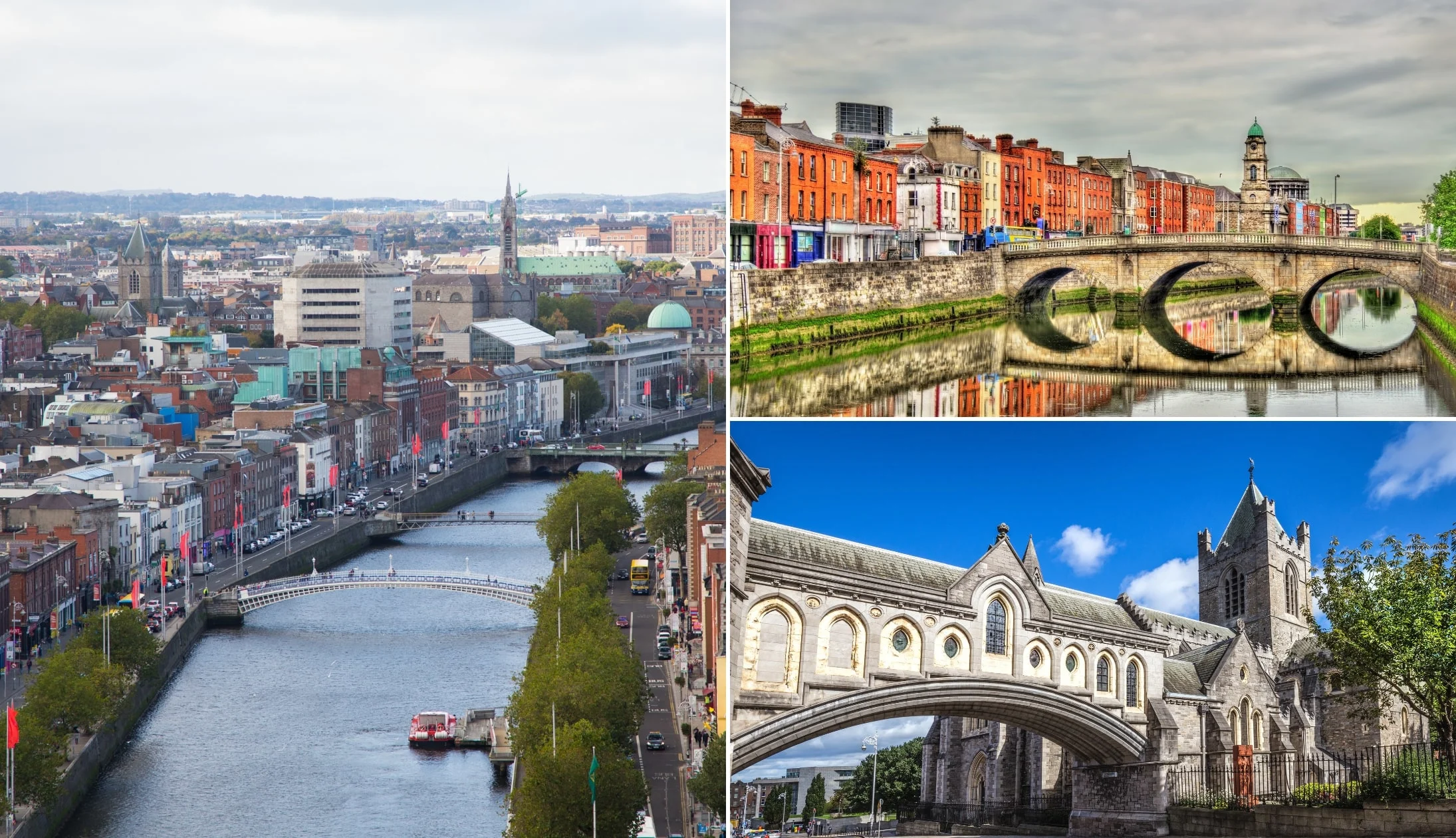
Photos via Shutterstock
Next stop, Dublin City! We’ll be taking the train to the vibrant and historic Dublin City, where we’ll be spending three nights.
Before you catch your train, enjoy a decent breakfast at your accommodation, or check out one of the cafes from yesterday. Alternatively, you’ll find shops at the train station if you want to buy something to go.
Recommended accommodation in Dublin
- Budget: Abigail’s Hostel (Temple Bar), Jacobs Inn (central hostel) and the Generator Hostel (short walk from the city)
- Mid-range: Dublin Skylon Hotel (just outside the city), Wren Urban Nest (Temple Bar) and the Harding Hotel (very central)
- Luxury: The Merrion (St. Stephen’s Green – very central) and The Westin (just off Grafton Street)
Getting around Dublin + money savers
- Time savers: If you want to avoid walking where possible, it’s worth getting a ticket for the Hop On Hop Off Bus around Dublin. It goes to or near all of the main sites on this itinerary plus plenty more.
- Money saver: If you’re visiting the ‘main’ Dublin attractions, the Dublin Pass can save you €€€ (here’s how)
Stop 1: Belfast Lanyon Place Train Station
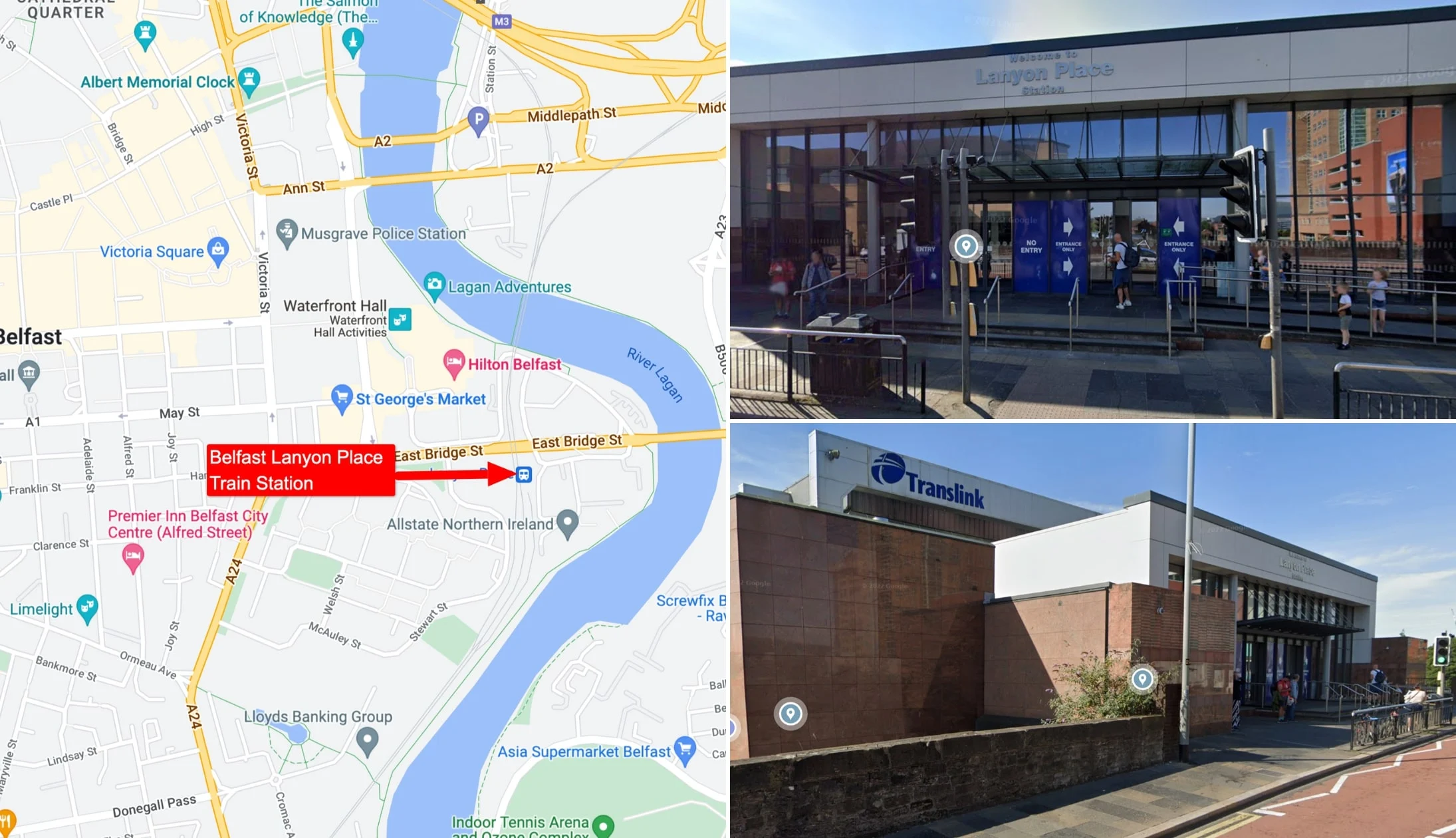
Photos via Google Maps
After a good feed, it’s straight to the train station. Lanyon Place is just a short walk from the Cathedral Quarter, or you can take a cab there from your accommodation.
There are multiple trains to Dublin every day, more or less every four hours or so, and the journey will typically take just over two hours, passing through some gorgeous scenery along the way. Tickets generally cost €15 – €22.
Stop 2: Dublin Connolly Train Station
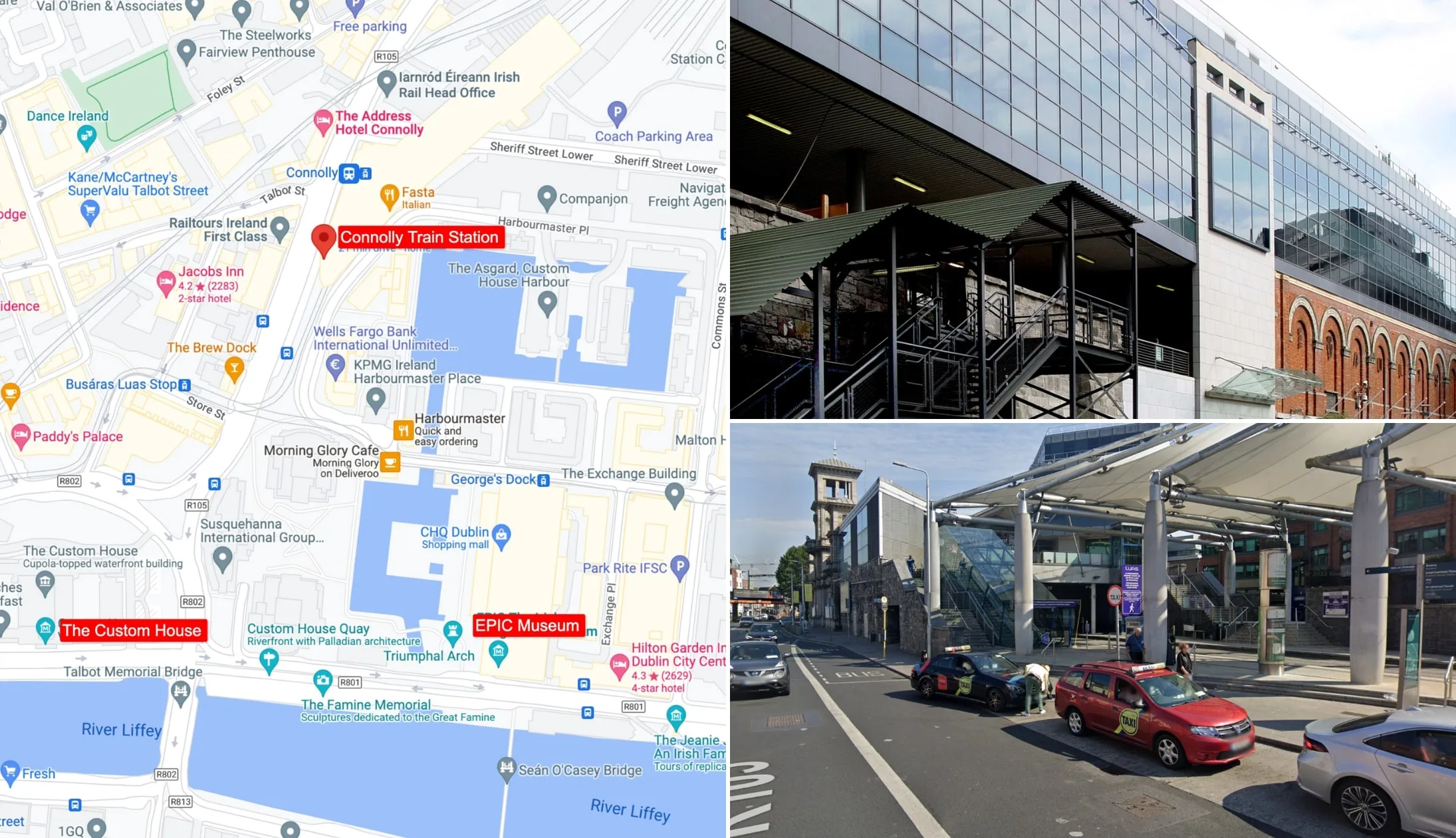
Photo left and bottom right: Google Maps. Other: Shutterstock
Welcome to Dublin, the capital of the Republic of Ireland! From Connolly Station, it’s about a 10-minute walk to Trinity College or 20 minutes to Temple Bar.
Head straight to wherever you’re staying. Check-in and leave the car behind you. The city is very walkable.
Stop 3: Trinity College
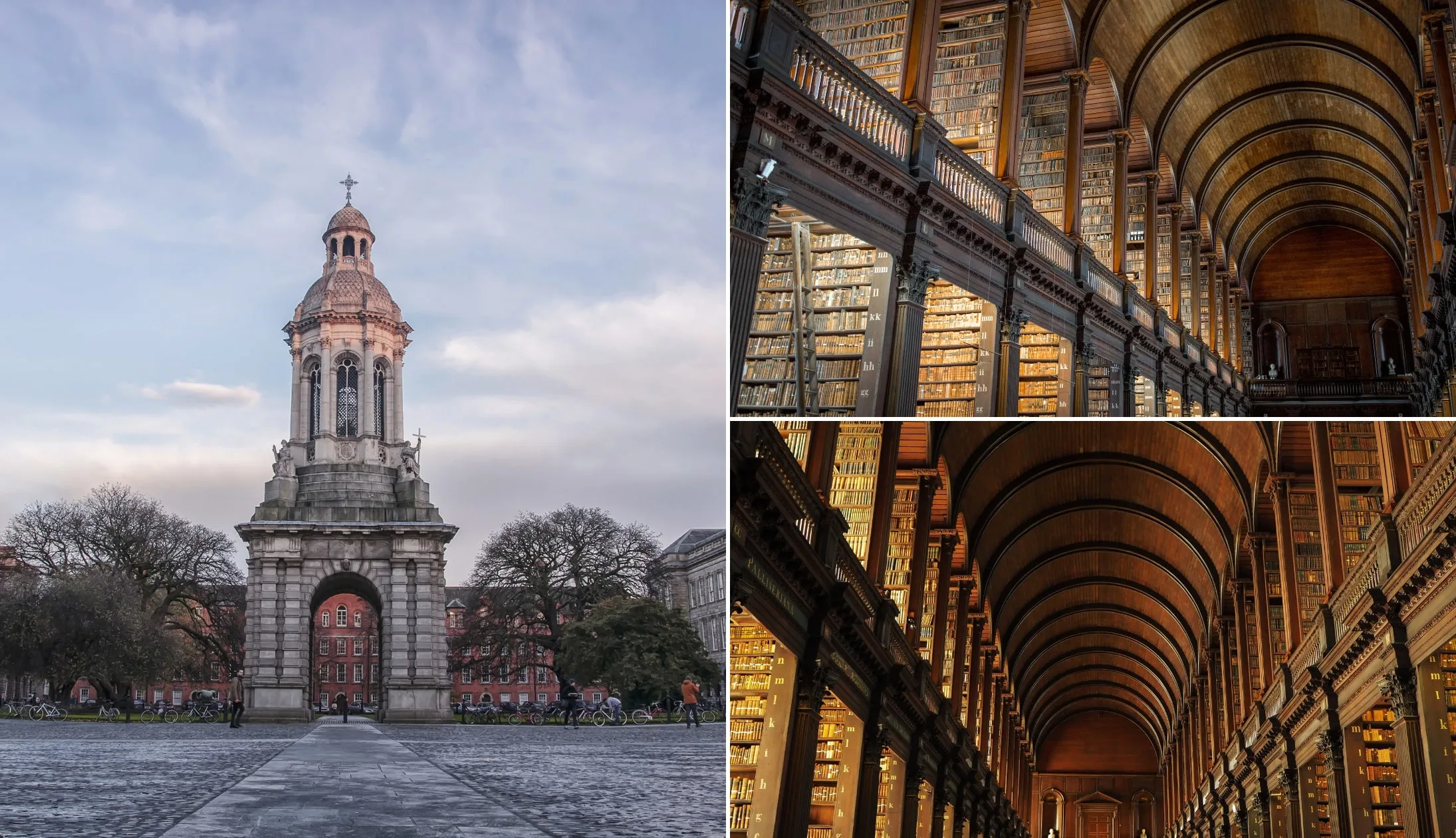
Photos via Shutterstock
When you’re ready, head straight for Trinity College to see the Book of Kells, arguably the most famous cultural attraction in Dublin.
If you can, we highly recommend pre-booking your tickets online, as the queues can get really long (bordering on ridiculous!). This fast-track ticket allows you to dodge the queue and gets you into Dublin Castle, too!
Spend around one hour seeing the Book of Kells, walking around the exhibit, and taking in the beauty of the Old Library. After that, give yourself another 20 minutes or so to walk around the university campus.
Stop 4: Lunch
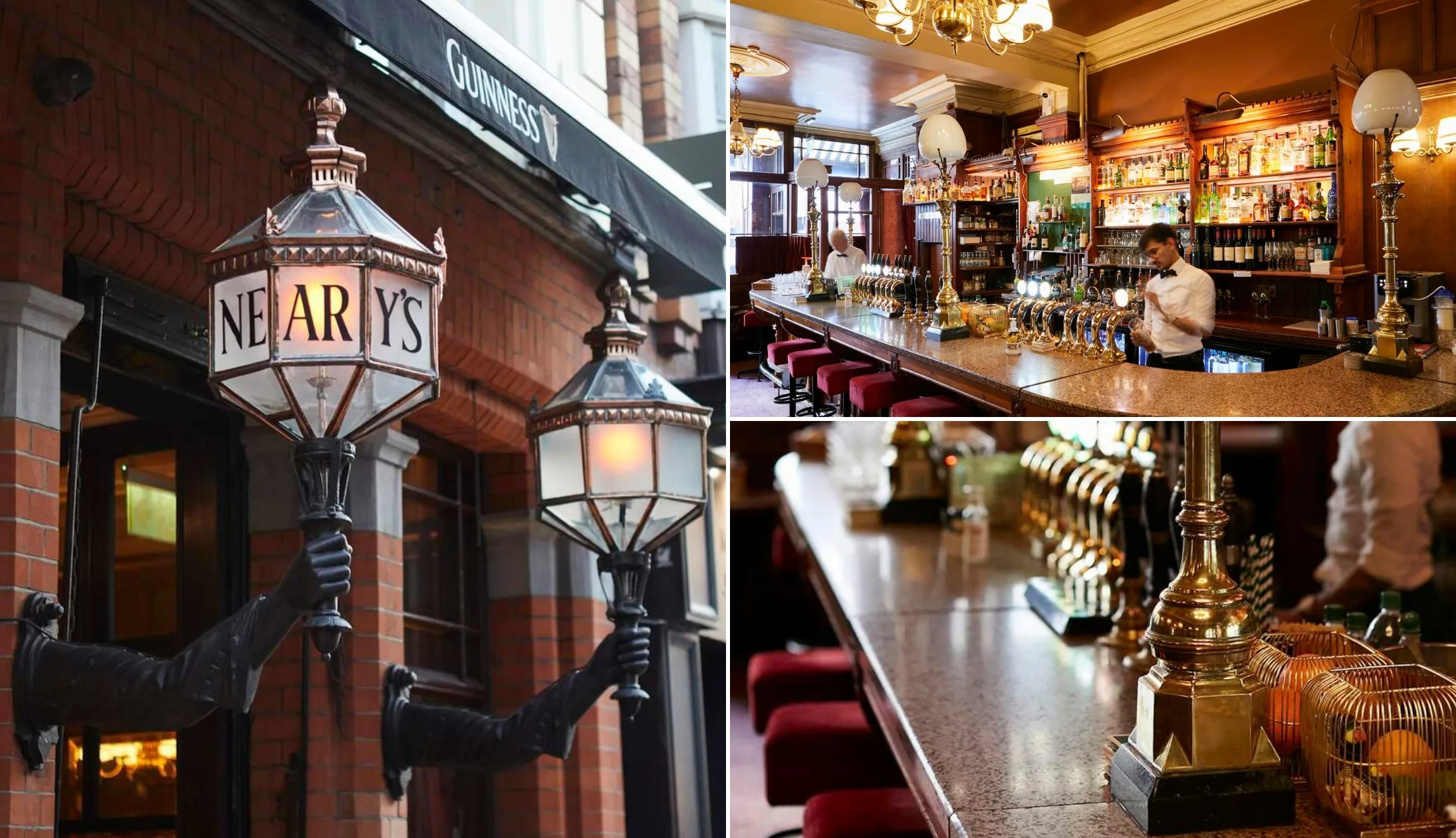
Photos © Tourism Ireland
There’s plenty of great restaurants in Dublin, but for lunch we suggest you head to Neary’s. It’s just up the road from Trinity College, along the bustling Grafton Street.
This old-school pub is a classic and it serves up a range of simple lunch options, like sandwiches, soup, toasties, and Carlingford Oysters, all washed down with a tasty pint of Guinness.
Affordable and delicious, we can’t recommend it highly enough. Sprout and Co on Dawson Street is another good shout for a quick, light lunch that tastes great and is close to Trinity College.
Stop 5: The Ha’penny Bridge (via Temple Bar)
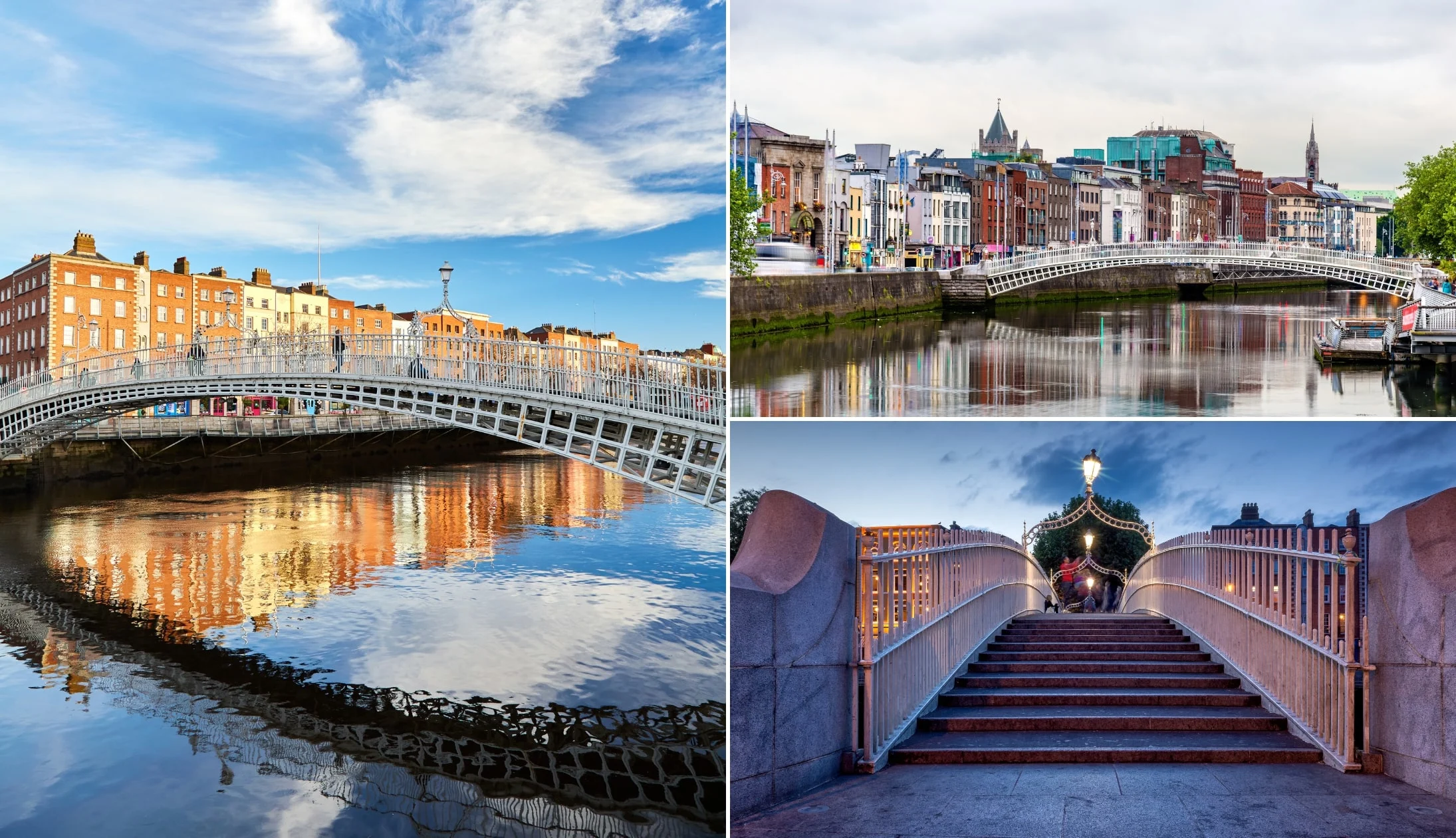
Photos via Shutterstock
The Ha’penny Bridge is an iconic sight in Dublin and crossing it is a must. From Neary’s, it’s about a ten-minute walk that passes through the vibrant Temple Bar area.
As you pass through Temple Bar, you’ll see why this is the nightlife capital of Dublin, with endless pubs and clubs lining the streets.
The bridge itself is a quaint little footbridge over the River Liffey. In the old days, you’d have to pay a toll of half a penny to cross, hence the name.
If you fancy a coffee after your walk, head to Vice Coffee Inc, just over the bridge for a superb brew. You’ll also find tons of shops and pubs to enjoy on either side of the bridge.
Stop 6: Dublin Castle
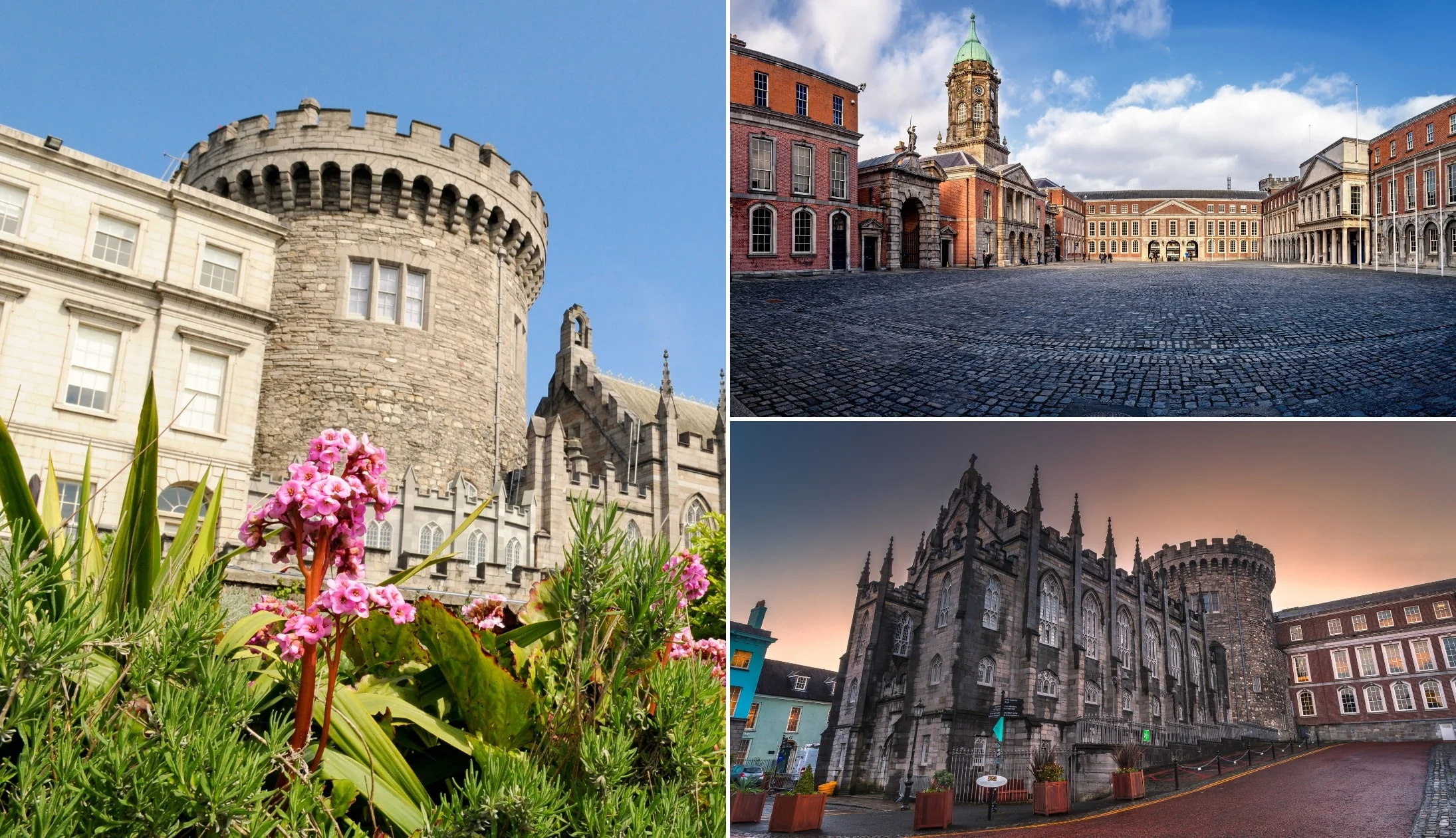
Photos via Shutterstock
Next on the itinerary is Dublin Castle. Nestled in the city centre, the castle dates back to the 13th century and was the seat of the English for over 700 years. Today, it’s an important government complex and the site of Presidential Inaugurations and key State events.
The castle is around 10 minutes from the Ha’penny Bridge on foot. There’s no admission fee to explore the grounds, but if you want to have a look inside, you’ll need to purchase tickets for either a self-guided tour or a guided tour.
Guided tours include access to the State Apartments, Exhibitions, Chapel Royal, and the Mediaeval Undercroft. Self-guided tours include access to the State Apartments and Exhibitions only.
Stop 7: Christ Church Cathedral
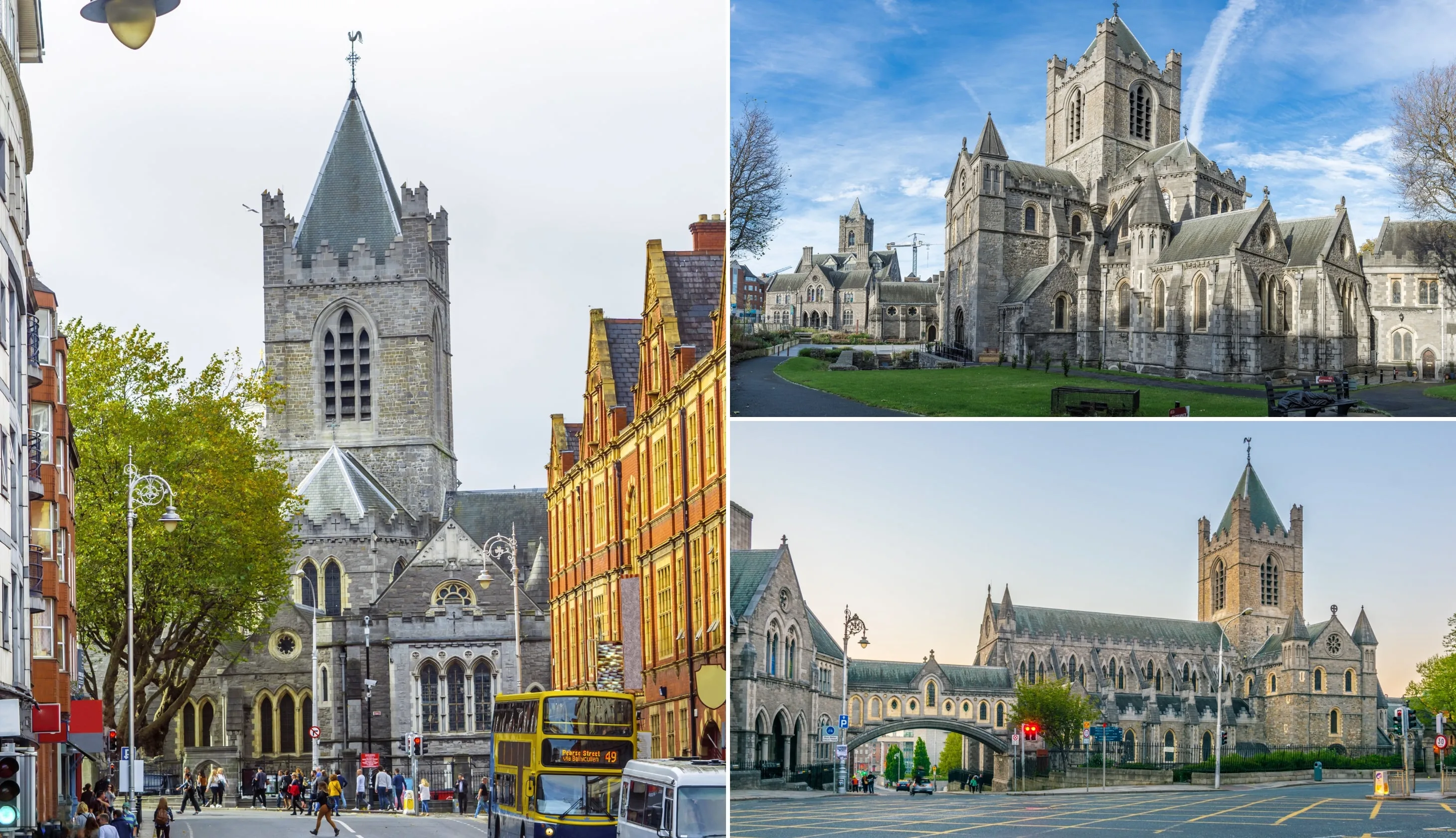
Photos via Shutterstock
Christ Church Cathedral (a 6-minute stroll from the castle) is another of Dublin’s top attractions and dating back more than 1,000 years, it’s pretty much as old as the city itself!
Steeped in history, it was originally founded by Viking king Sitruic Silkenbeard, but it’s come a long way since those early days (you can grab a ticket online here).
After admiring the stunning architecture from the outside, you can take a self-guided audio tour inside the cathedral.
Along the way, you’ll discover Strongbow’s grave and explore the crypts, which are home to a wealth of artefacts and exhibits, with such treasures as the mummified cat chasing a mummified rat inside an organ pipe.
Listen out for the record-breaking bells of Christ Church, and if you’re really lucky, you might catch the choir in action.
Stop 8: Guinness Storehouse
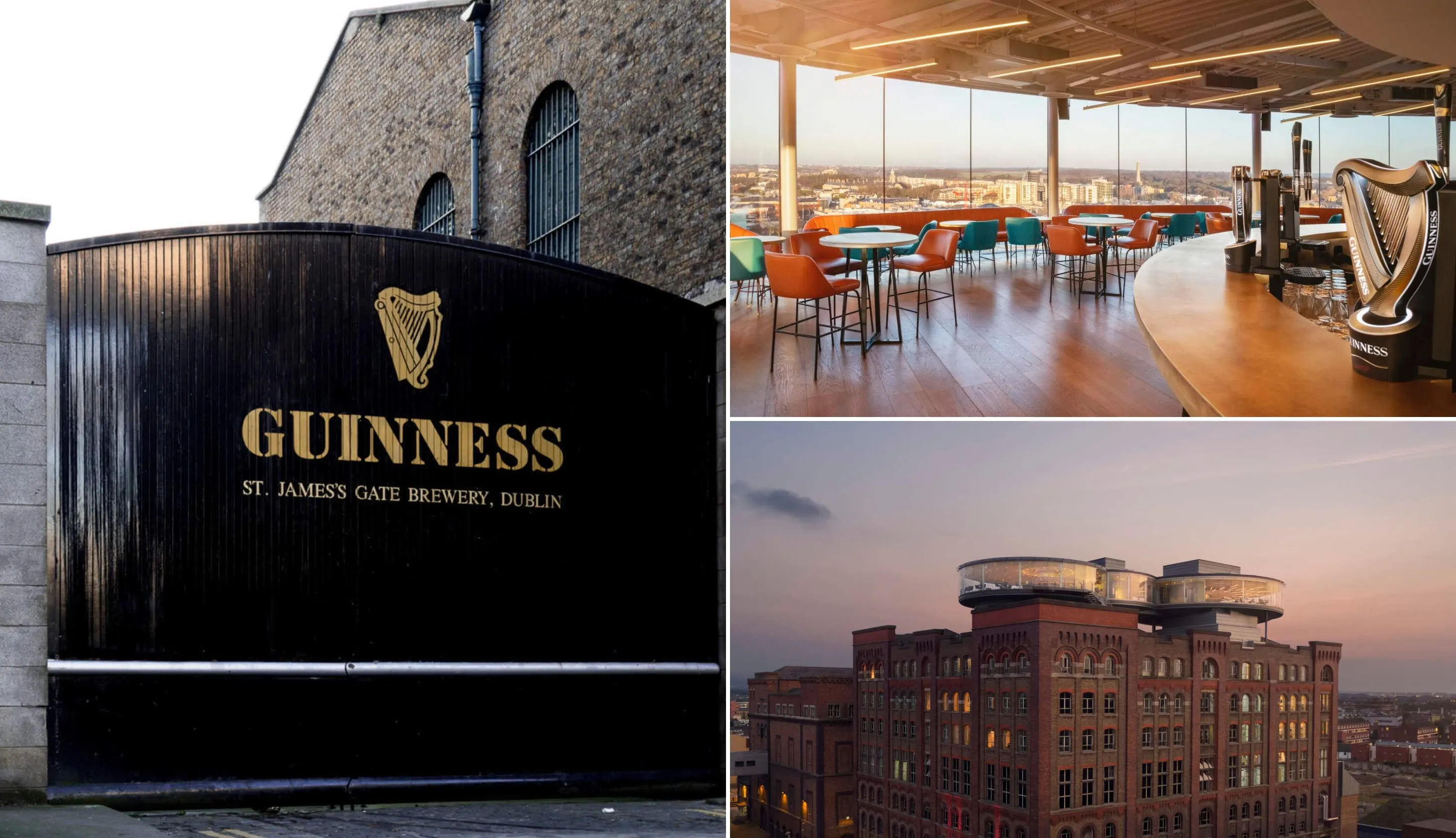
Photos © Diageo via Ireland’s Content Pool
Next up is another iconic Dublin attraction, the Guinness Storehouse, a 15-minute walk from Christ Church. Dublin is the home of Guinness, and this tour of the brewery is a must for anyone with a love for the black stuff.
In fact, even if you’re not a fan of beer, this is a fantastic attraction to visit. Book your tickets in advance to avoid the queues. You can do a self-guided tour, but the guided-tour is, in our minds, the better option.
Along the way, you’ll hear a number of humorous tales, enjoy some of the brand’s most iconic adverts, and sample the brew at various stages of the process.
To finish, you’ll get a free pint in the fantastic Gravity Bar. Situated on the seventh floor, you’ll enjoy great views over the city as you sink a pint or two.
Stop 9: Dinner, drinks and live music
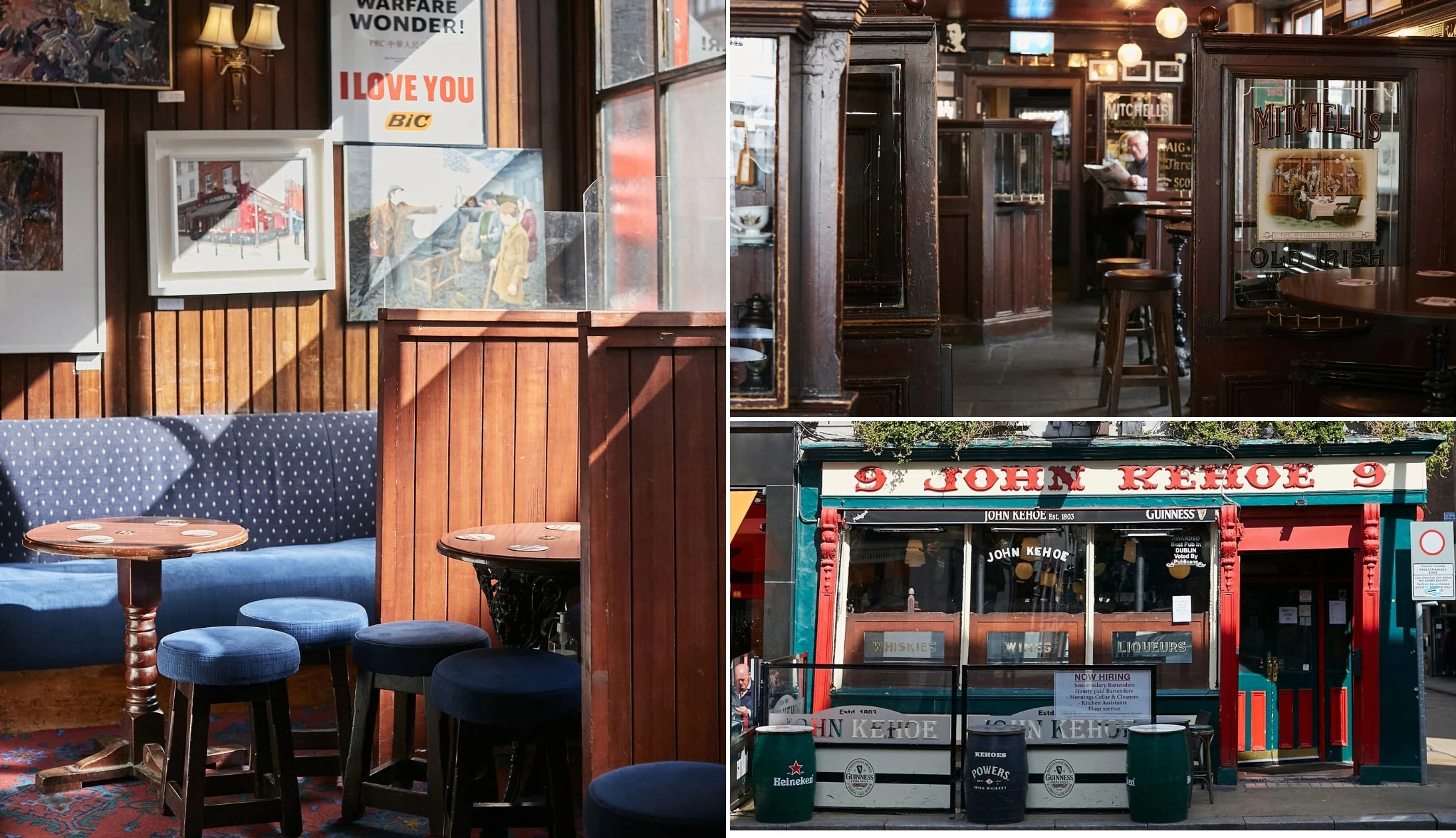
Different trad bars in Dublin. © Tourism Ireland
When you’ve finished at the Guinness Storehouse, you’ll probably be ready for dinner. For our first night in Dublin, we’ve got a few treats lined up.
Our Dublin food recommendations
There’s endless excellent restaurants in Dublin. However, if we had to pick one or two…
The first would be The Bull and Castle – it’s always a good choice and it’s right across the street from the Christ Church Cathedral.
An FX Buckley steakhouse (a Dublin institution), they offer a great range of steaks cooked to perfection, paired with their incredible beef dripping chips.
The Vintage Kitchen is an alternative, but it’s best to book in advance as it’s incredibly popular. A BYOB (bring your own bottle) place, the food is phenomenal, with a small but diverse menu that features classic Irish dishes with a contemporary twist.
Our Dublin pub recommendations
There’s certainly no shortage of great pubs in Dublin. If you’re a fan of old-school pubs, follow our Dublin pub crawl guide – it contains a short route with some of the city’s finest trad bars.
McNeils on Capel Street is an authentic Dublin pub, complete with wood panelling, impromptu folk sessions, and plenty of beers on tap.
The Long Hall is another must-see. Part Victorian time capsule, part vibrant boozer, it enjoys a fantastic atmosphere and is one of the most visually stunning pubs in the city.
You’ll find trad sessions at Pipers Corner every night of the week. O’Donoghues Bar on Merrion Row is another must-visit, with vintage decor and frequent trad sessions. It’s best-known as the home of the Dubliners, who used to play here regularly.
The Celt on Talbot Street is another great choice for live music, and while it’s not always trad, the bands are normally really good.
Day 7: Mighty Meath and Louth
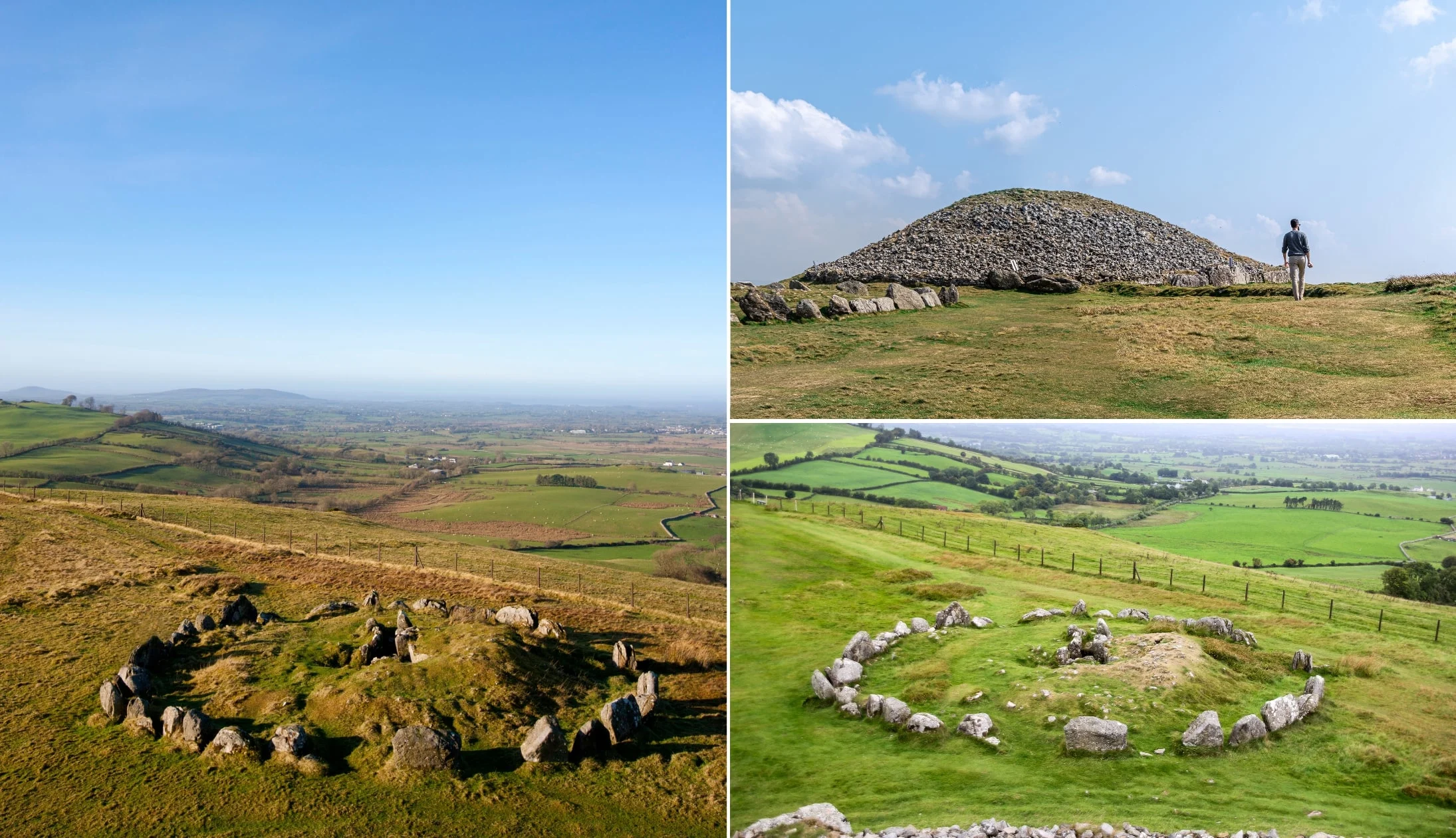
Photos via Shutterstock
Today we’ll be exploring the gorgeous counties of Meath and Louth, with a particular focus on the incredible Boyne Valley. There’s a fantastic coach tour of this area that takes in some of the best historical and cultural sights in Ireland. We’ll take a closer look down below.
Today’s 10-hour organised day trip leaves from the same spot, near the Molly Malone statue. There aren’t too many breakfast options open this early, so once again, we recommend Keoghs Cafe as they open at 6am.
Keep reading below for an overview of the tour, but please note that 1, you may not always physically stop at all of these sights and 2, these tours are subject to change, so always check with the provider in advance.
Stop 1: Hill of Uisneach
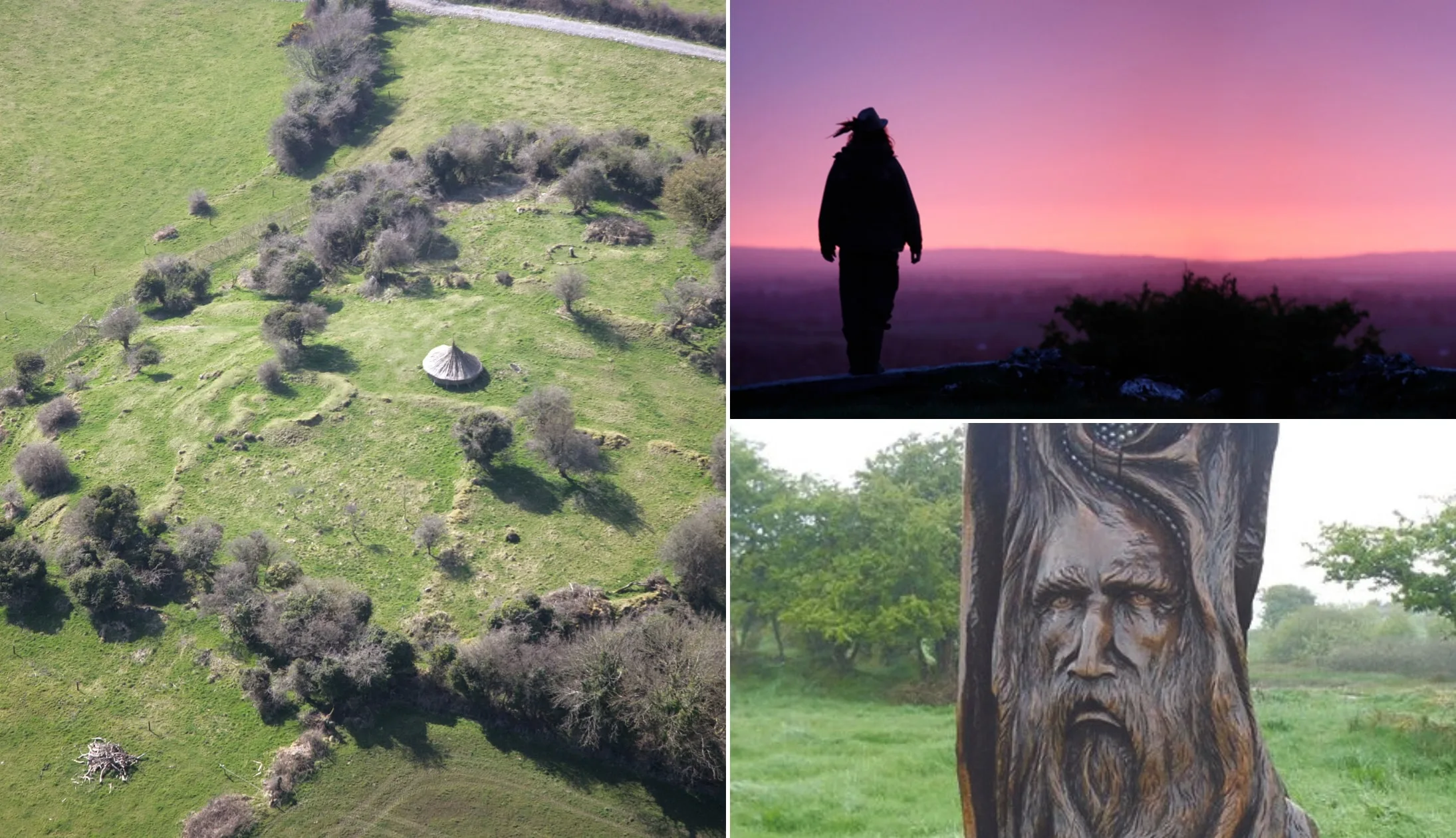
Photos via Shutterstock
Considered by many to be the centre of Ireland, the Hill of Uisneach is one of the most sacred and historic sanctuaries in the world. Sitting in the heart of the ancient Kingdom of Mide, a stroll across the ancient landscape follows in the footsteps of High Kings, Gods, and Goddesses.
The Hill of Uisneach is part of a working farm and on private land. The only access to the Hill is via a guided tour, but due to Covid-19 restrictions, there’s a chance it may not feature on your itinerary.
Stop 2: Fore Abbey
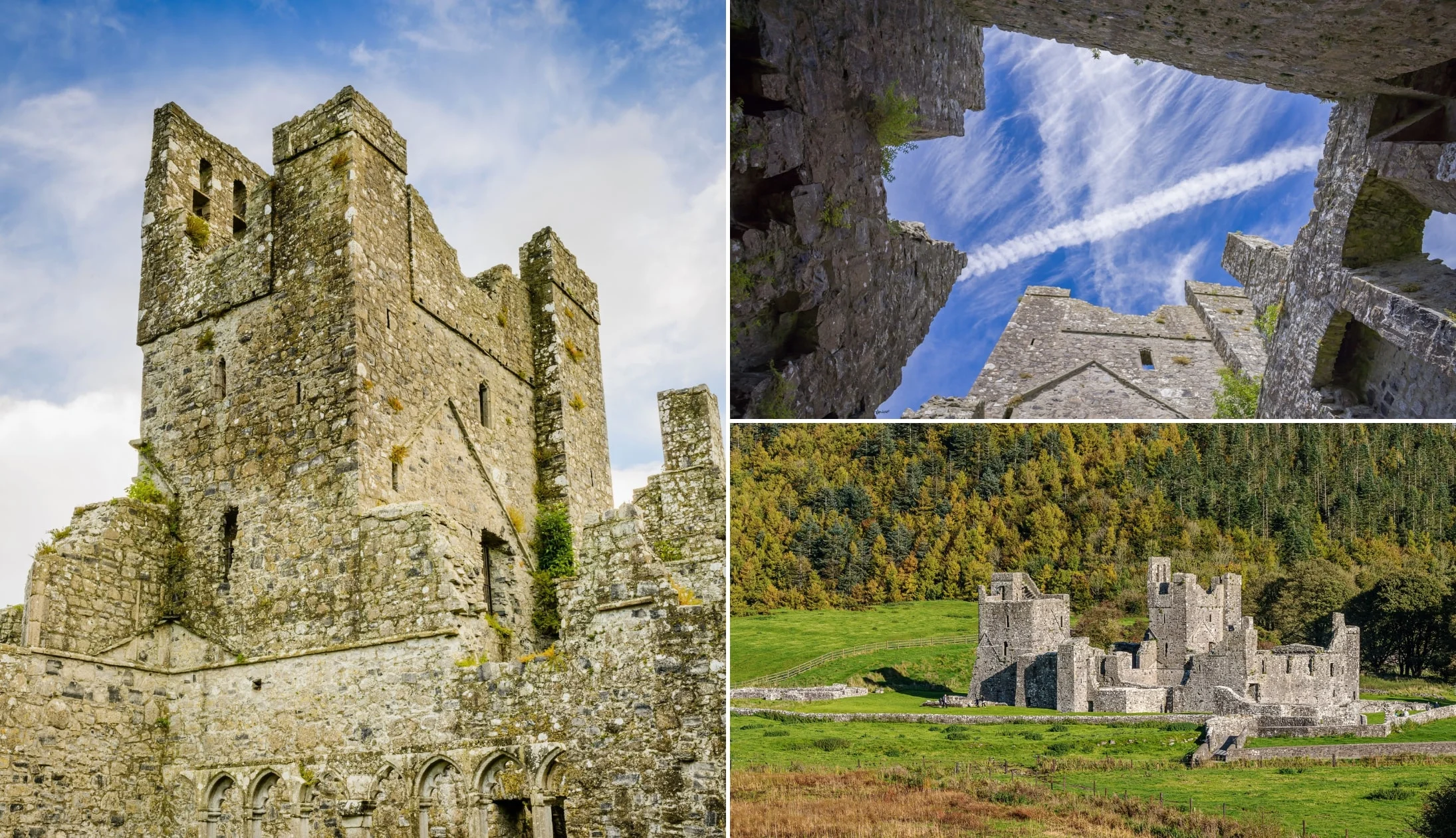
Photos via Shutterstock
Walk among the ruins of a Benedictine Abbey that dates back to the year 630 AD. Despite its age, it has been remarkably well-preserved and is a superb place to ramble, take photographs, and reflect on the ancient history of the place. Located just north of Lough Lene, it’s surrounded by gorgeous scenery and makes for a tranquil stop on your tour.
Stop 3: Loughcrew Passage Tombs

Photos via Shutterstock
The Loughcrew Passage Tombs, located on a site known as the Hills of the Witch, date back to 3000 BC. They’re spread over four rolling peaks that stand proud of the surrounding landscape. Your guide will take you around the site as you explore the mythology and ancient history of these incredible monuments.
Please note that the walk up to the cairns is very steep and may prove difficult for those with low levels of fitness.
Stop 4: Trim Castle
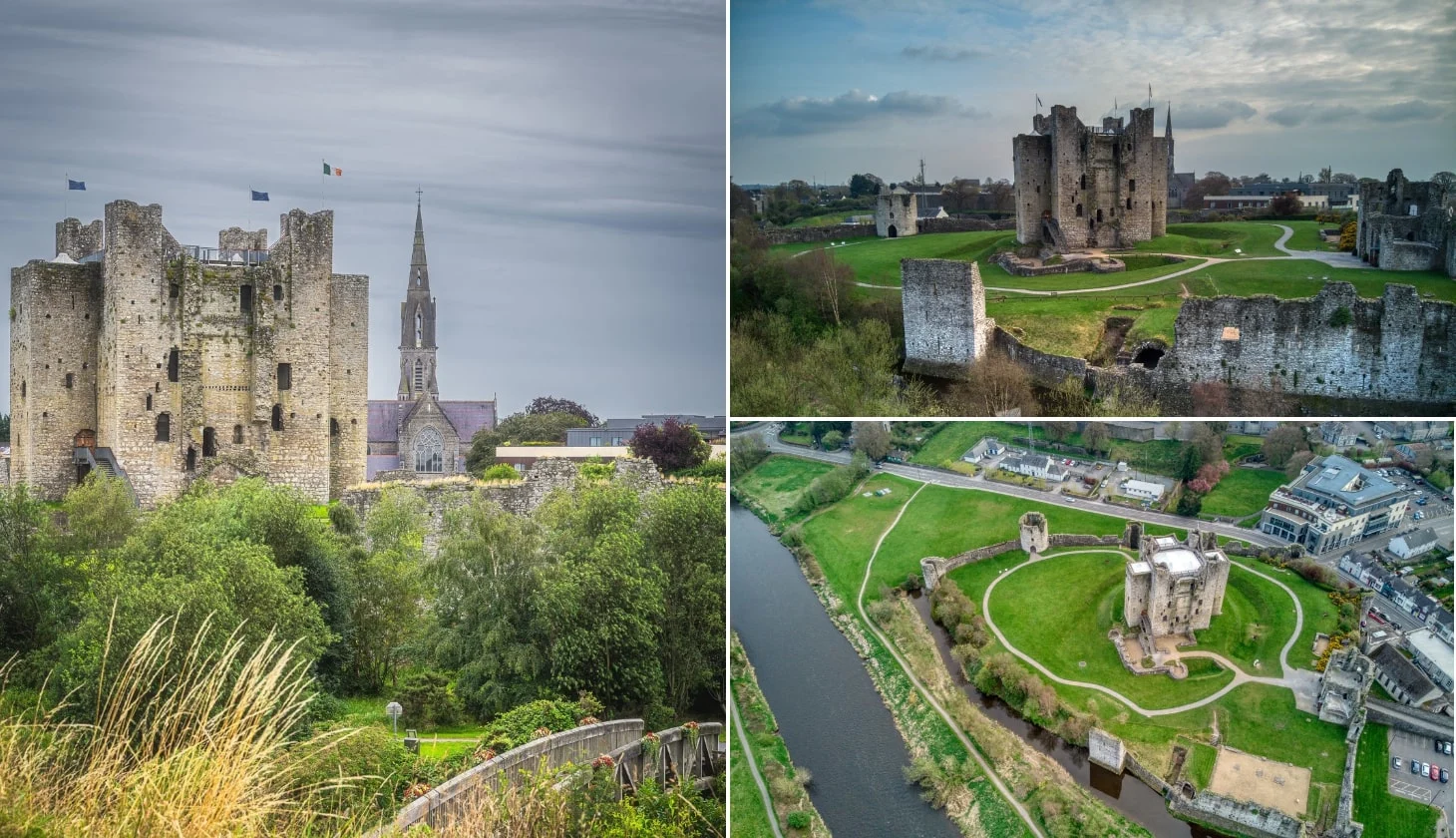
Photos via Shutterstock
Trim Castle dates back to the 12th century and is steeped in history as the site of many battles and raids. Despite its tumultuous history, it remains in great shape, with an intact tower house and walls. You’ll take a guided tour that lasts about 45 minutes.
Along the way, you’ll explore the various halls and chambers, before heading to the top of the castle to admire the amazing views of the surrounding town and countryside. If you don’t fancy going inside, you can enjoy a couple of lovely riverside walks around the outside of the castle.
Stop 5: Hill of Tara
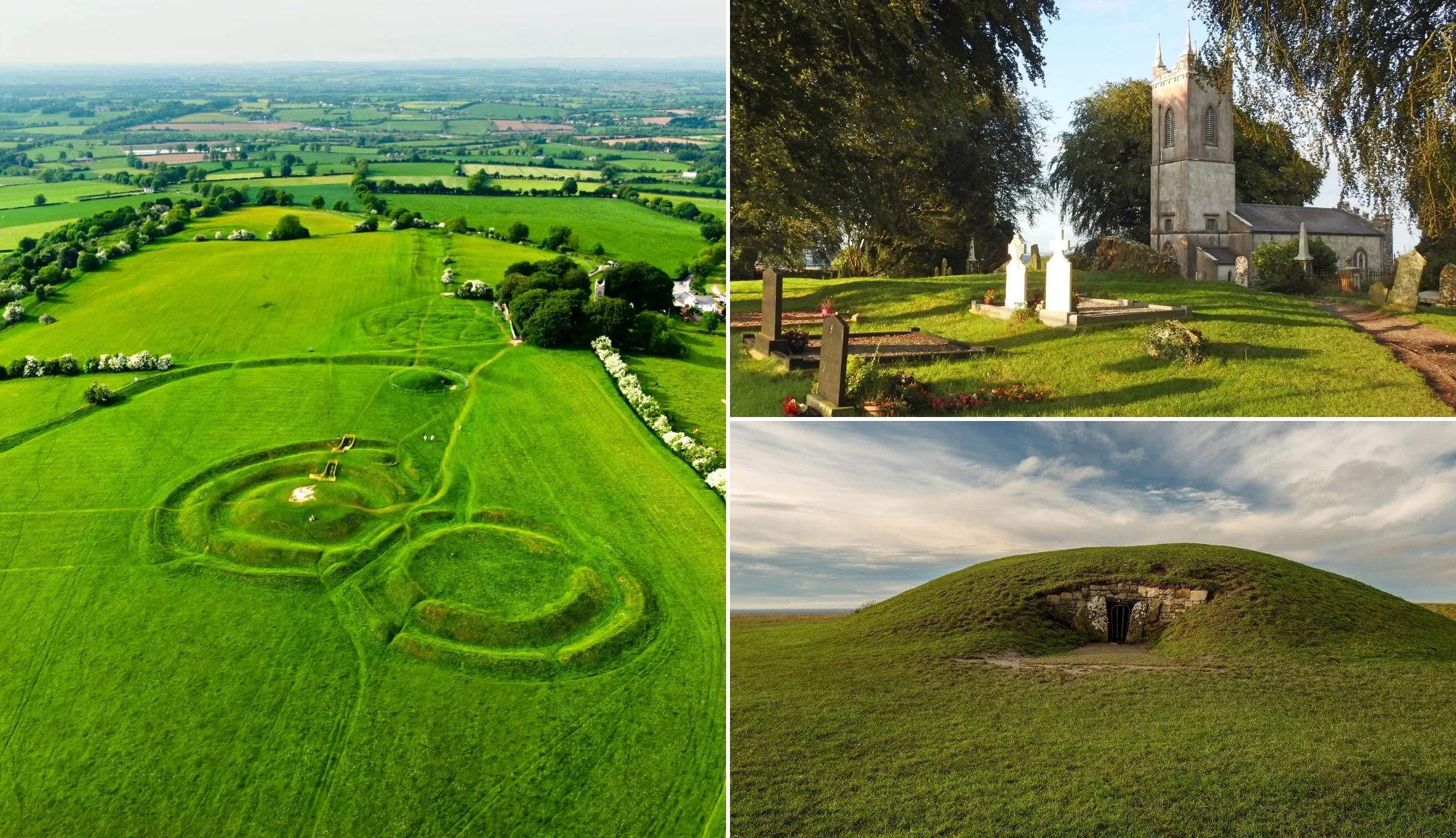
Photos via Shutterstock
Your final stop of the day is the iconic Hill of Tara. Dating back to the Iron Age, this hilltop is a veritable archaeological treasure trove and was formerly the seat of the High Kings of Ireland. The area is awash with ancient monuments, including passage tombs and burial mounds that date back thousands of years.
You can enjoy a nice walk up onto the hills to get a better look at the various ancient sites. The surrounding scenery is also breathtaking, and you can see why it was so important to the High Kings of Ireland. If you fancy a coffee, drop by Maguires Cafe and Gift Shop to refuel.
Stop 6: Back to Dublin for the night

Different trad bars in Dublin. © Tourism Ireland
With the tour over, it’s time to head back to Dublin, just in time for a bit of dinner. Check our suggestions from yesterday and enjoy some of the best pubs and restaurants that Dublin has to offer. Need more ideas? We’ve got you covered.
Our Dublin food recommendations
There’s endless excellent restaurants in Dublin. However, if we had to pick one or two…
The first would be The Bull and Castle – it’s always a good choice and it’s right across the street from the Christ Church Cathedral.
An FX Buckley steakhouse (a Dublin institution), they offer a great range of steaks cooked to perfection, paired with their incredible beef dripping chips.
The Vintage Kitchen is an alternative, but it’s best to book in advance as it’s incredibly popular. A BYOB (bring your own bottle) place, the food is phenomenal, with a small but diverse menu that features classic Irish dishes with a contemporary twist.
Our Dublin pub recommendations
There’s certainly no shortage of great pubs in Dublin. If you’re a fan of old-school pubs, follow our Dublin pub crawl guide – it contains a short route with some of the city’s finest trad bars.
McNeils on Capel Street is an authentic Dublin pub, complete with wood panelling, impromptu folk sessions, and plenty of beers on tap.
The Long Hall is another must-see. Part Victorian time capsule, part vibrant boozer, it enjoys a fantastic atmosphere and is one of the most visually stunning pubs in the city.
You’ll find trad sessions at Pipers Corner every night of the week. O’Donoghues Bar on Merrion Row is another must-visit, with vintage decor and frequent trad sessions. It’s best-known as the home of the Dubliners, who used to play here regularly.
The Celt on Talbot Street is another great choice for live music, and while it’s not always trad, the bands are normally really good.
Day 8: Wicklow’s Wonders
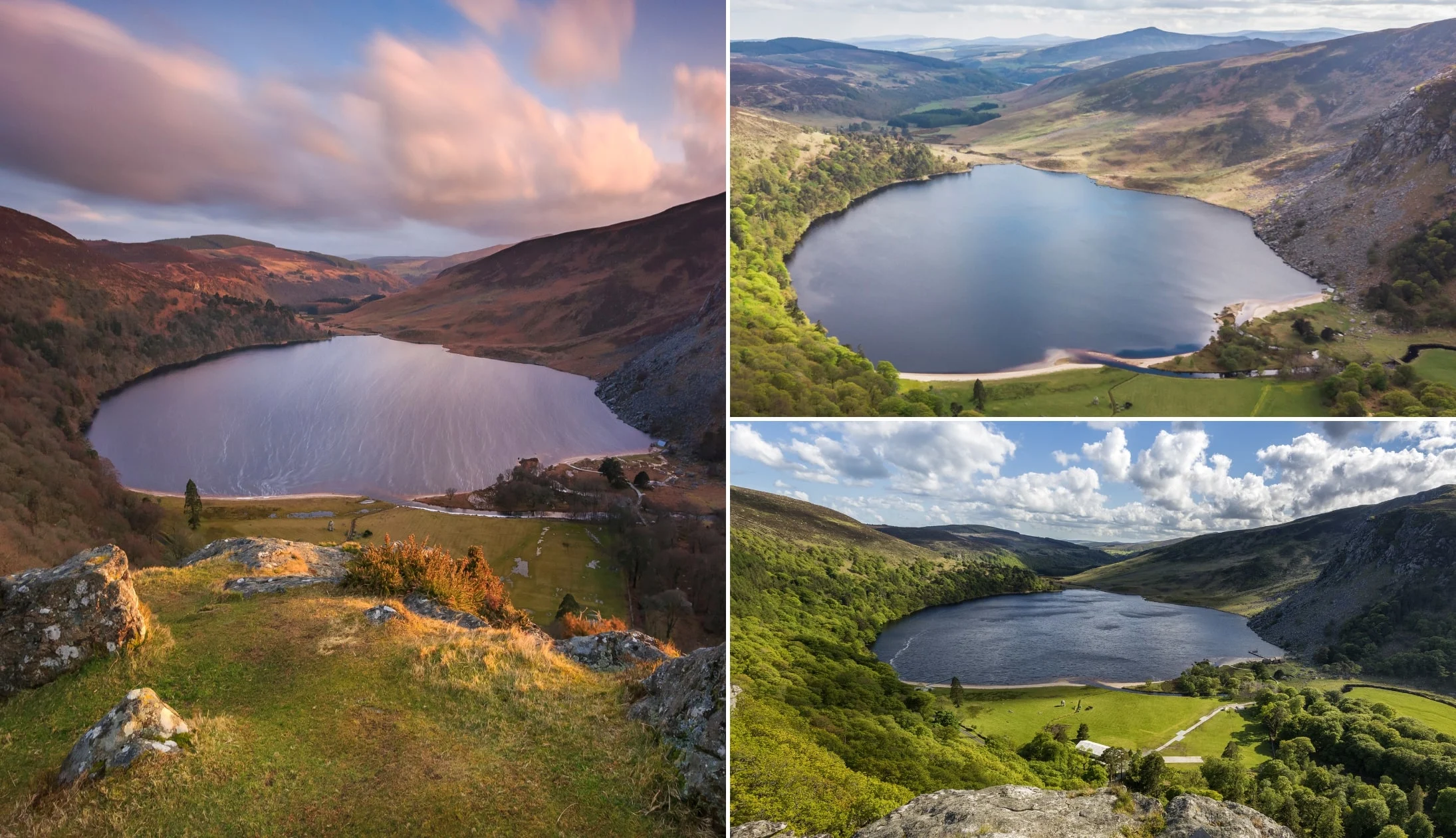
Photos via Shutterstock
Day 8 takes us into the stunning natural beauty of the Wicklow Mountains, just south of Dublin City. Depending on the time of year, you’ll have different options for seeing Glendalough and the Wicklow Mountains National Park.
During the off-season, St Kevin’s Bus is the best way to visit these places. If you are here during the peak season, take a guided tour like the one we’ve outlined below.
Option 1: St Kevin’s Bus
The St Kevins Bus Service has been operating the Dublin to Glendalough bus since 1927. The bus leaves from St Stephen’s Green North (across from Stephen’s Court in Dublin City Centre) and drops you near the Glendalough Visitor Centre.
Option 2: Wicklow Mountains National Park & Guided Walking Tour
This option includes a fully guided day tour of Wicklow with a guided walk in the Irish countryside. You’ll stop for lunch along the way and take in the magnificent Sally Gap in the heart of the Wicklow Mountains and various film locations before arriving at Glendalough National Park and Monastic site.
We’ll give a brief overview of the various stops along the tour but bear in mind that the actual tour you take may differ depending on weather, number of guests, and traffic conditions. However, the trip should take around 8 hours. Be sure to check with the provider in advance for full details.
Stop 1: Sally Gap
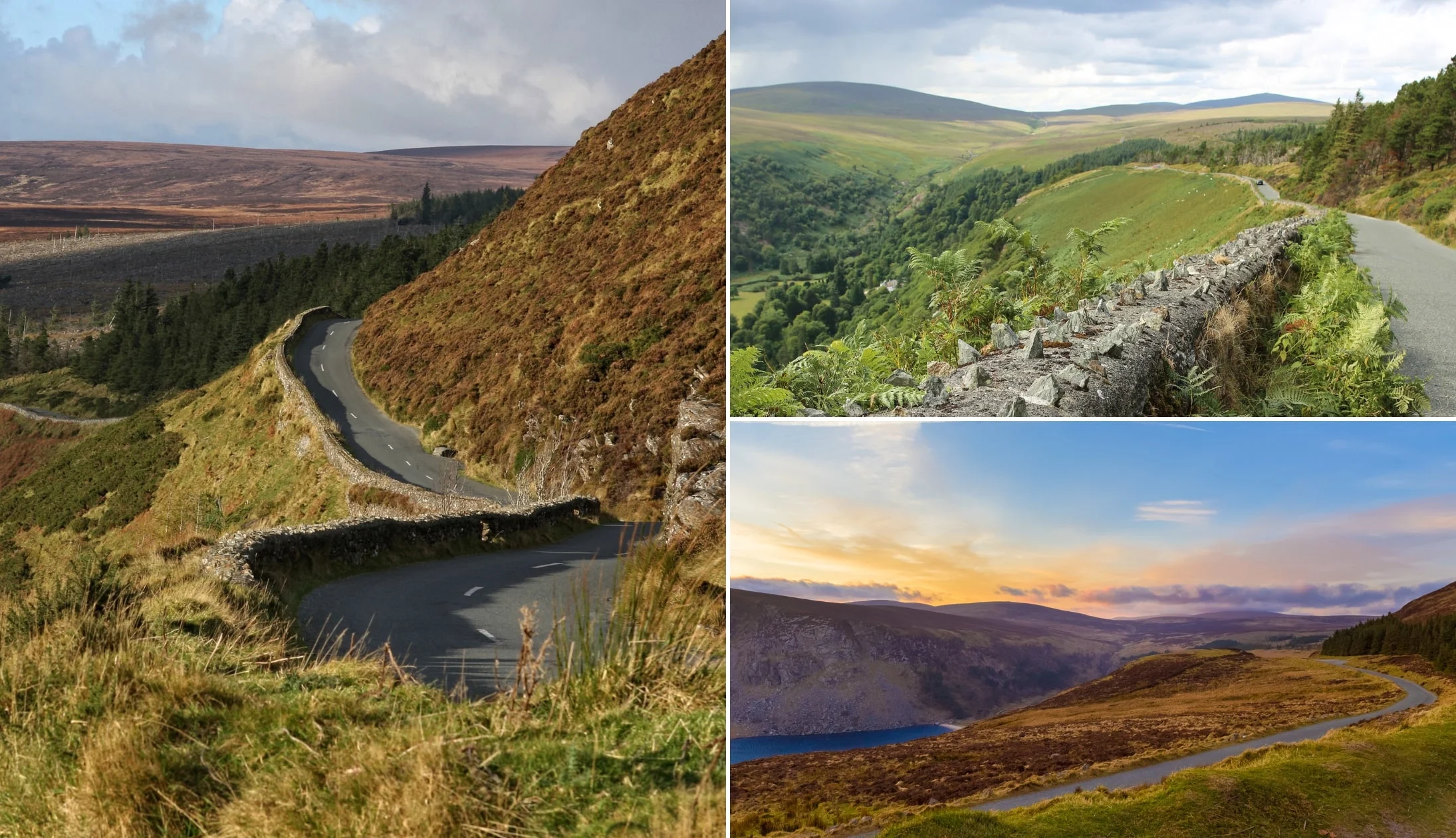
Photos via Shutterstock
From the pickup point, you’ll be heading to Glendalough in the heart of the Wicklow Mountains via the Sally Gap, a wonderful, remote wilderness in the shape of a crossroads.
From Sally Gap, you can enjoy a number of sights from the road, including the mighty Lough Tay, better known as the Guinness Lake, and Glenmacnass Waterfall, a beautiful 80-metre cascade that tumbles down the mossy rocks into the river below.
Stop 2: Glendalough Monastic City
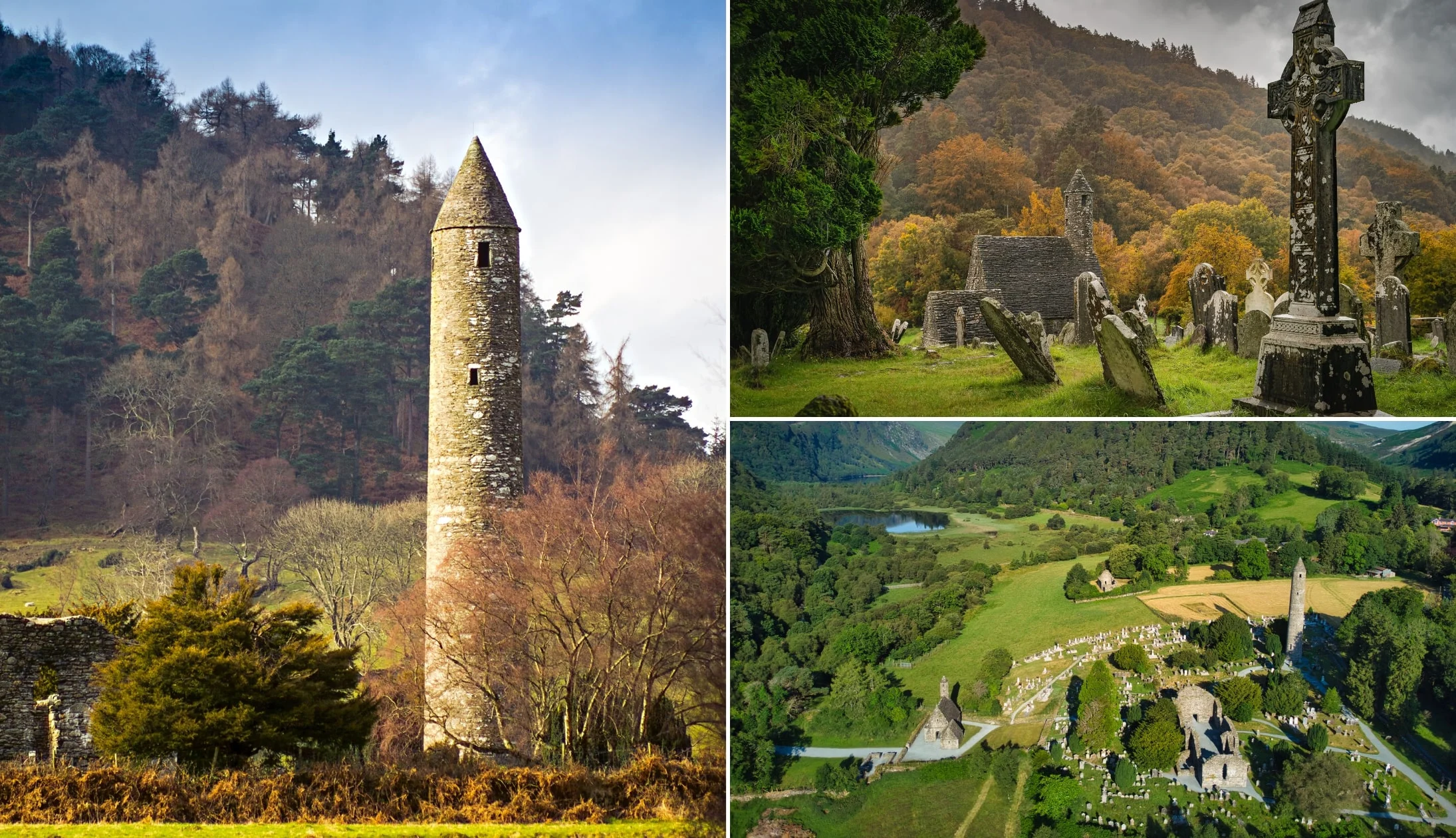
Photos via Shutterstock
Your first stop will be the magnificent Glendalough Monastic City. It’s a superb place to take a walk around and discover the various ruins, many of which are many hundreds of years old. Founded by St. Kevin in the sixth century, it’s home to ancient round towers, churches, and tombs, as well as an extensive graveyard.
Stop 3: The Lakes at Glendalough
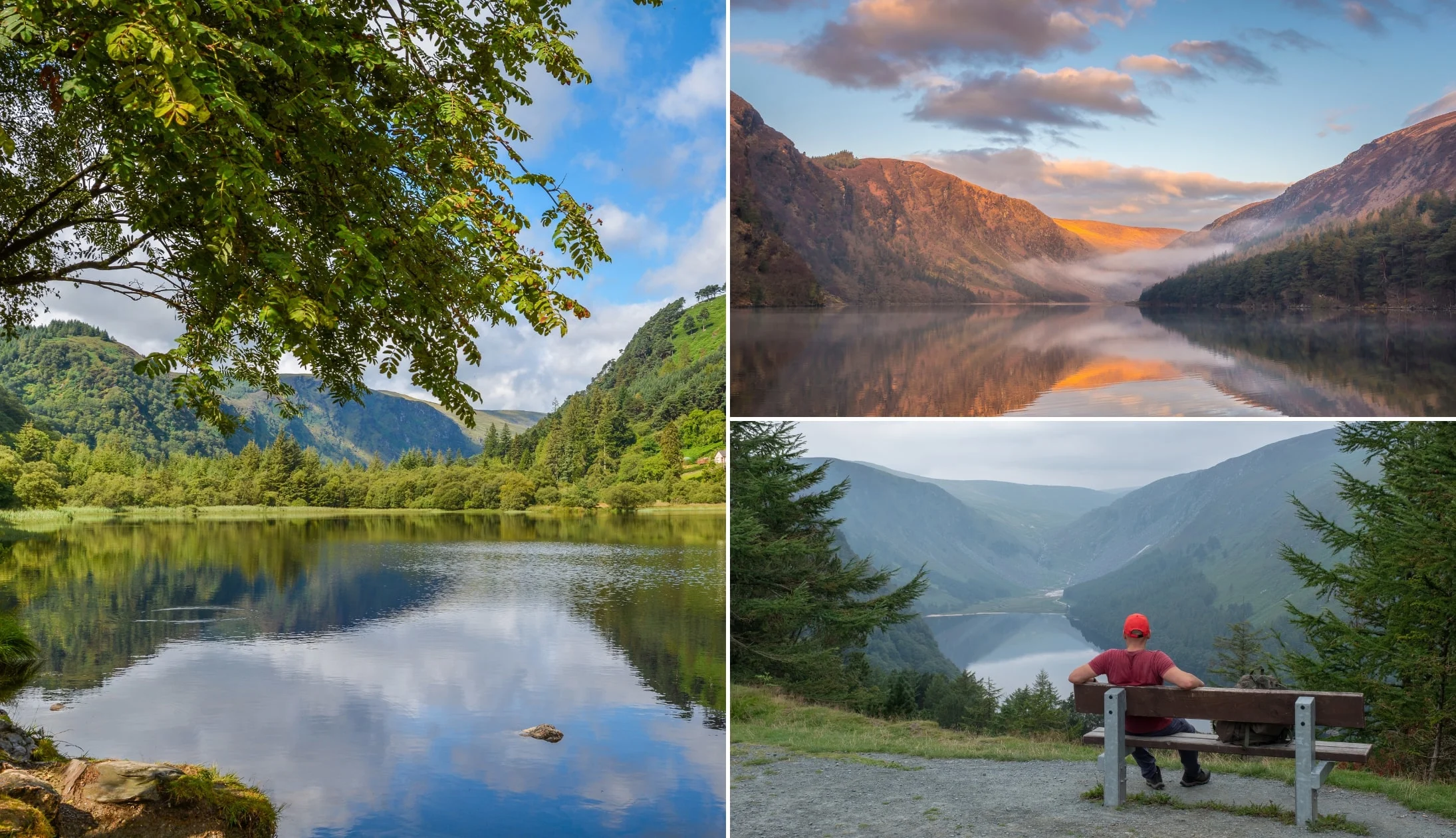
Photos via Shutterstock
There are two stunning lakes at Glendalough, the smaller Lower Lake, and the larger Upper Lake. There are plenty of nice walks in the area that see you ambling along the edge of both lakes, taking in the rugged, natural beauty of the area.
Your guide will most likely take you on one of the shorter, easier-going routes in the park, where you can enjoy the spectacular scenery and fresh air. You’ll also find places to eat at Glendalough Upper Car Park, right on the shores of the Upper Lake.
Stop 4: Powerscourt House and Gardens
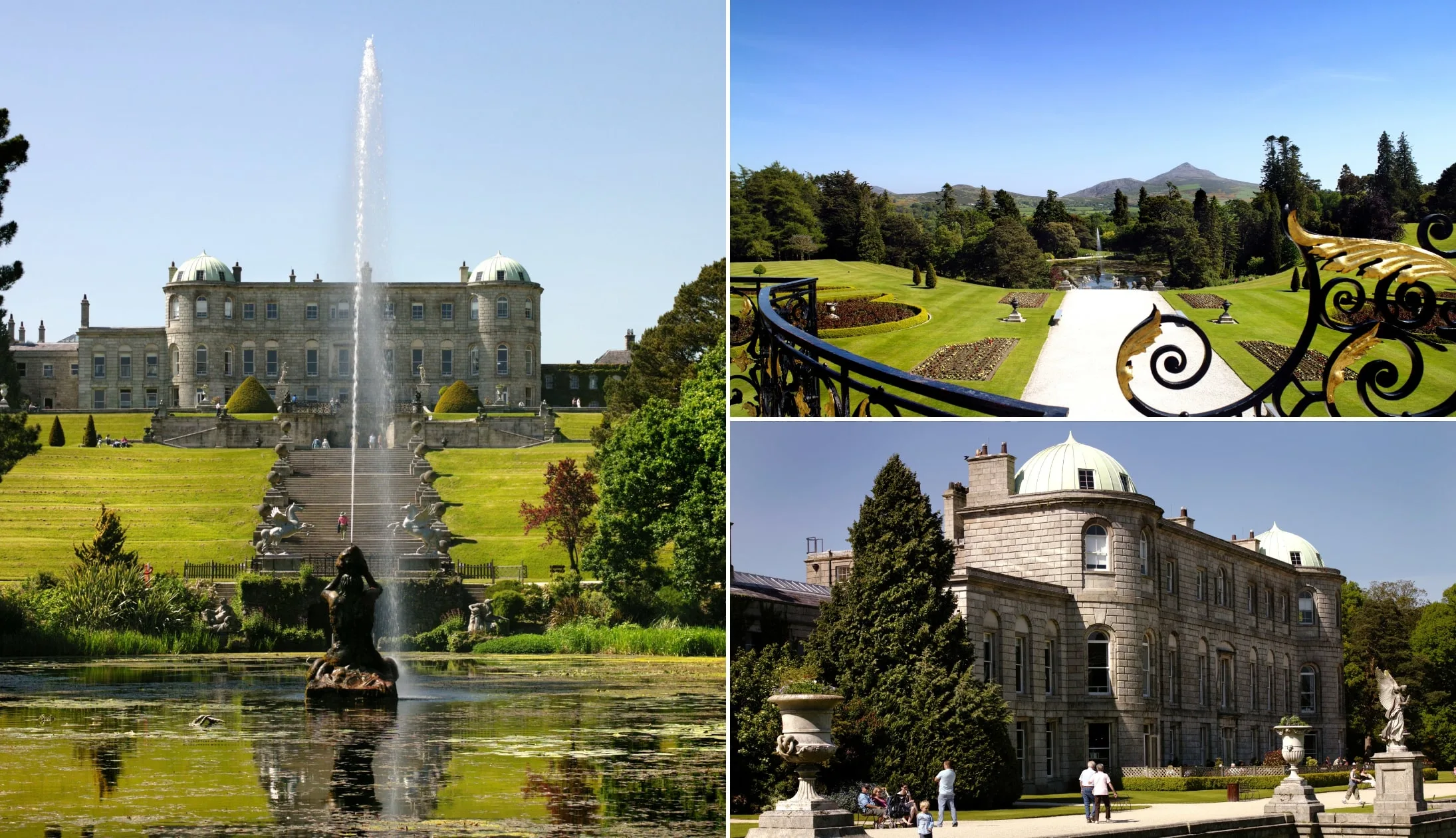
Photos by Chris Hill via Failte Ireland
Our next stop is a 35-minute coach ride away to the breathtaking Powerscourt House and Gardens. The Powerscourt Estate gardens are some of the most beautiful in Ireland and cover an incredible 47 acres of land. You can wander through the formal gardens, sweeping terraces, statues and secret hollows. The gardens were designed from 1731 onwards, with various sections worth exploring.
The grand house overlooks Sugarloaf Mountain and has been voted as one of the top houses and mansions worldwide by Lonely Planet. You can take a tour through the house and also enjoy some bespoke shopping with stores such as Design Loft, Global Village and Avoca Stores located inside.
Admission costs €11.50 for an adult, €9.00 for seniors, €8.50 for students, and €5.00 for children, or you can purchase a family ticket for €26.00. There’s a lot to take in here, so it’s worth allowing at least two hours for your visit.
Stop 5: Back to Dublin for the night

Photos via Shutterstock
After enjoying the stunning scenery of the Wicklow Mountains, it’s time to head back to Dublin for the night for dinner, drinks, and maybe a little music. It’s your last night in Dublin, so make sure to check out any of the places you didn’t get around to visiting yet.
Our Dublin food recommendations
There’s endless excellent restaurants in Dublin. However, if we had to pick one or two…
The first would be The Bull and Castle – it’s always a good choice and it’s right across the street from the Christ Church Cathedral.
An FX Buckley steakhouse (a Dublin institution), they offer a great range of steaks cooked to perfection, paired with their incredible beef dripping chips.
The Vintage Kitchen is an alternative, but it’s best to book in advance as it’s incredibly popular. A BYOB (bring your own bottle) place, the food is phenomenal, with a small but diverse menu that features classic Irish dishes with a contemporary twist.
Our Dublin pub recommendations
There’s certainly no shortage of great pubs in Dublin. If you’re a fan of old-school pubs, follow our Dublin pub crawl guide – it contains a short route with some of the city’s finest trad bars.
McNeils on Capel Street is an authentic Dublin pub, complete with wood panelling, impromptu folk sessions, and plenty of beers on tap.
The Long Hall is another must-see. Part Victorian time capsule, part vibrant boozer, it enjoys a fantastic atmosphere and is one of the most visually stunning pubs in the city.
You’ll find trad sessions at Pipers Corner every night of the week. O’Donoghues Bar on Merrion Row is another must-visit, with vintage decor and frequent trad sessions. It’s best-known as the home of the Dubliners, who used to play here regularly.
The Celt on Talbot Street is another great choice for live music, and while it’s not always trad, the bands are normally really good.
Day 9: The Trip to Galway
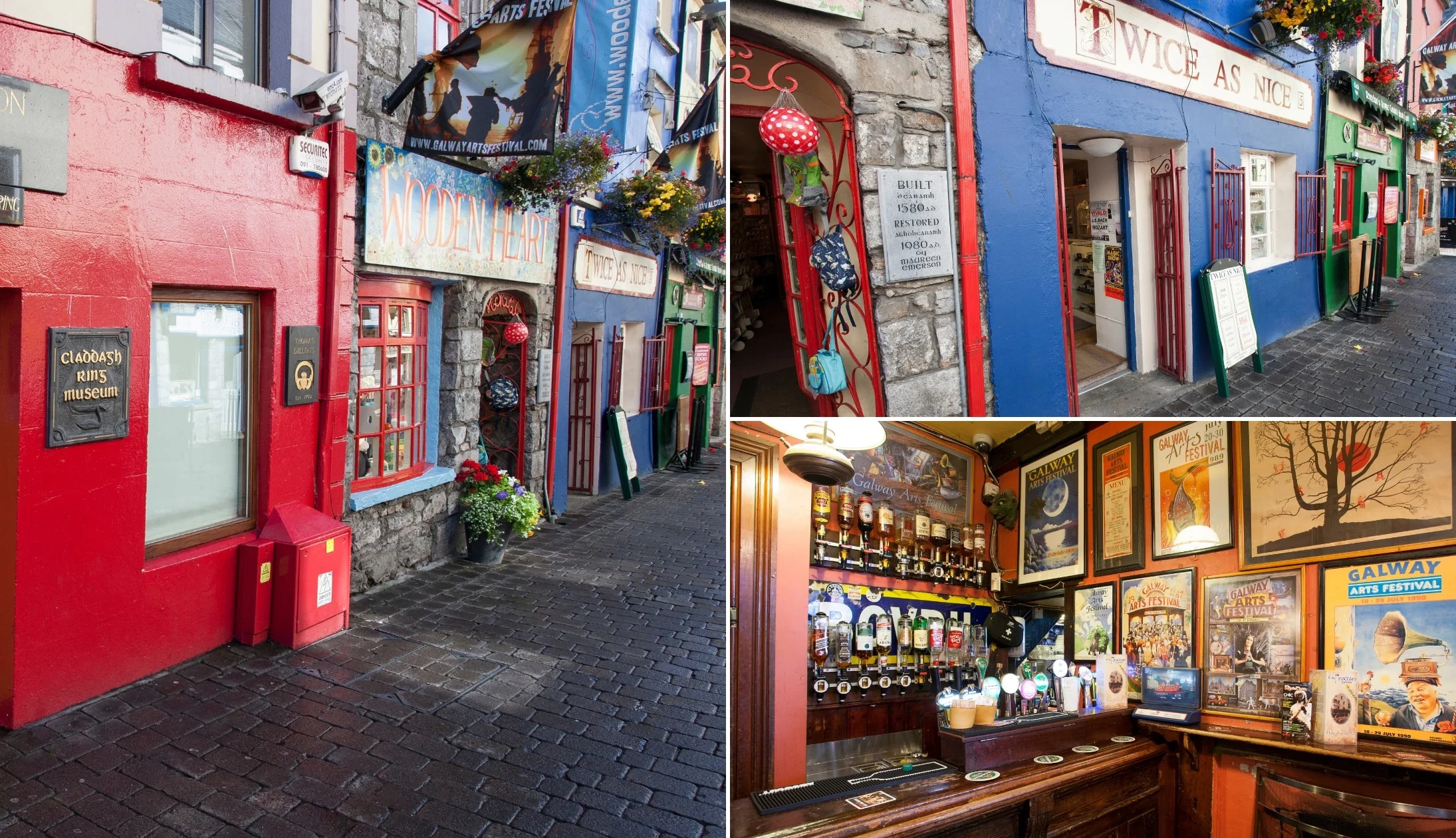
Photos by Stephen Power via Ireland’s Content Pool
After a wild few days in Dublin, we’re off to gorgeous Galway. We’ll stay three nights in this vibrant city, enjoying all it has to offer, as well as taking in some superb tours in the surrounding countryside.
Start your day with a good breakfast at your accommodation or somewhere nearby, then make your way to the train station. If you’re not hungry right now, there are plenty of shops at the station and you can easily get something to go.
Recommended accommodation in Galway
- Budget: Feeney’s Audubon Lodge (in Salthill outside of the city by the sea) and Corrib View Guesthouse (a 45-minute walk from Eyre Square)
- Mid-range: Balcony House B&B (10-minute walk from Eyre Square) and Ash Grove House (gorgeous guesthouse near Galway Cathedral)
- Luxury: The G Hotel (luxury hotel in the city) and Glenlo Abbey (one of Ireland’s top hotels – 15-minute drive from the city)
Stop 1: Dublin Heuston
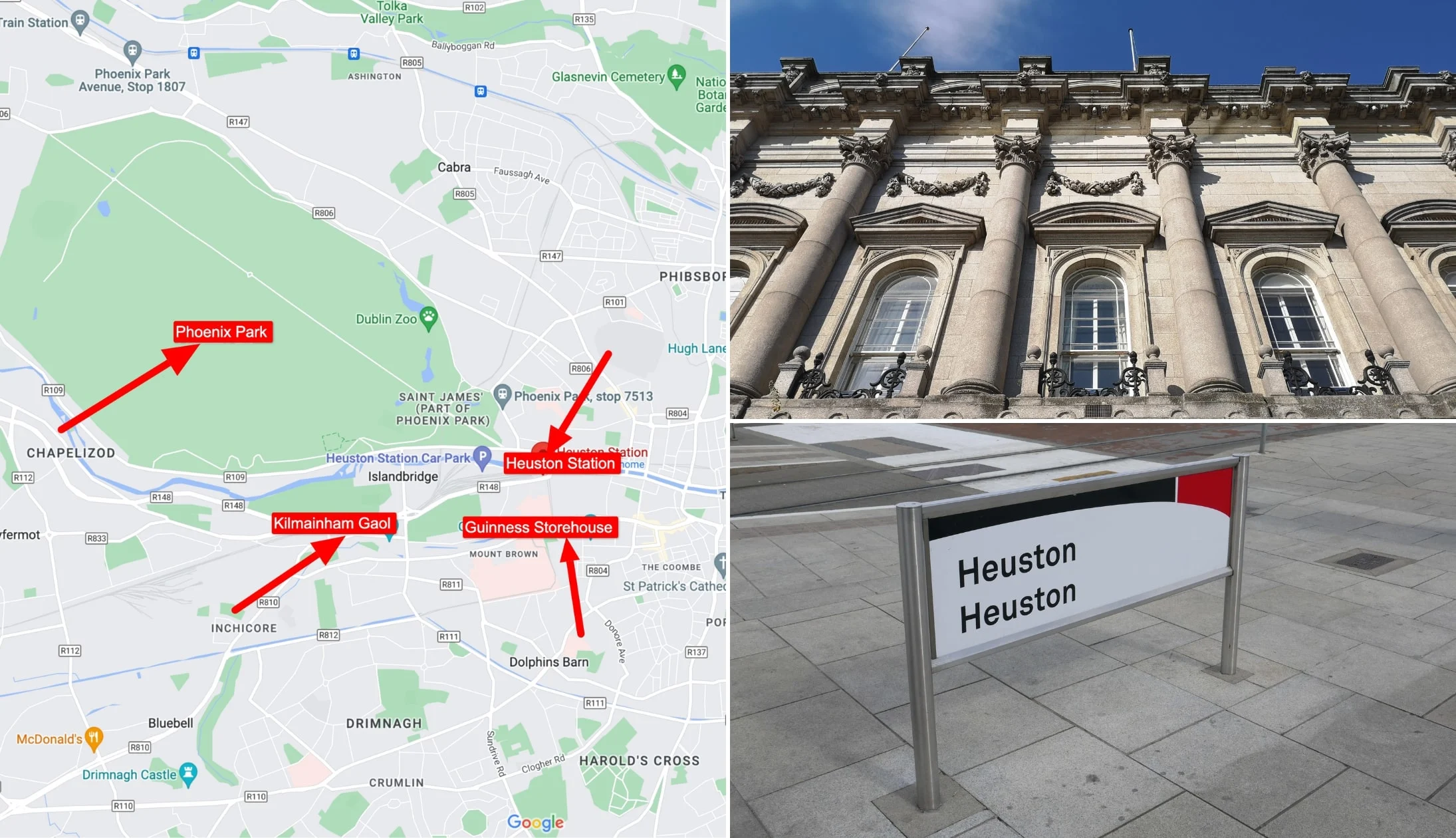
Photo left: Google Maps. Others: Shutterstock
Dublin Heuston is one of the city’s largest train stations and it’s just a little bit outside of the city centre. The easiest way to get there is to hop on the LUAS Red Line, which stops right outside the station. Alternatively, jump in a cab or walk if your accommodation is close enough.
From Dublin Heuston, you’ll be taking a direct train to Galway City. At the time of writing fares cost from €13.99 one-way if you book online. There are several services a day, more or less every two hours or so from 07:35 am. The journey should take about 2.5 hours, so sit back and enjoy the ride.
Stop 2: Galway Ceannt Station
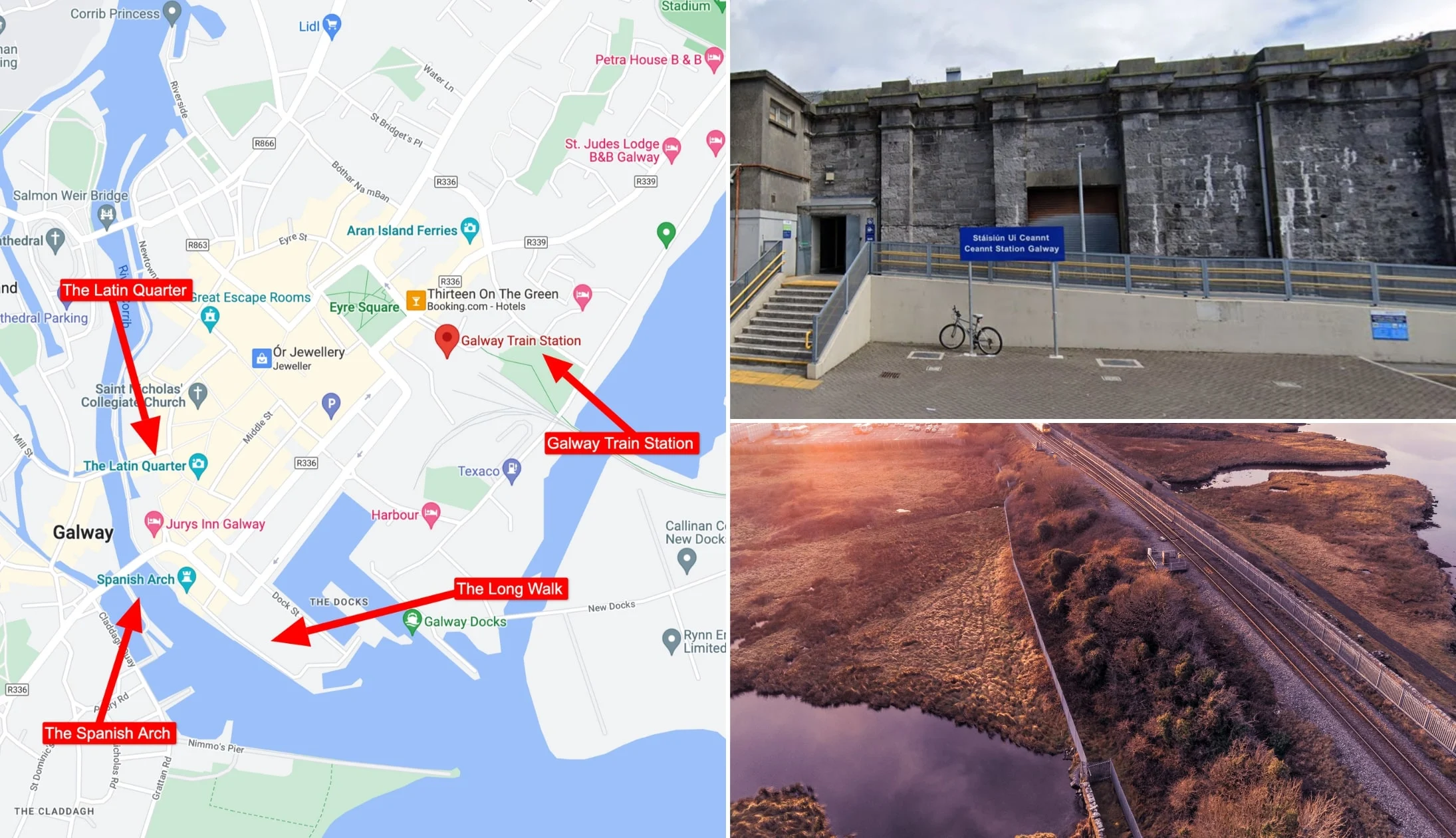
Bottom right photo: Shutterstock. Others: Google Maps
Welcome to Galway! Galway Ceannt Station is located just a stone’s throw from Eyre Square near the city centre.
It’s worth heading to your accommodation to drop off your luggage first of all, as you’ll be walking to the rest of the day’s attractions.
Stop 3: Check-in, get lunch and decide between walking or the bus
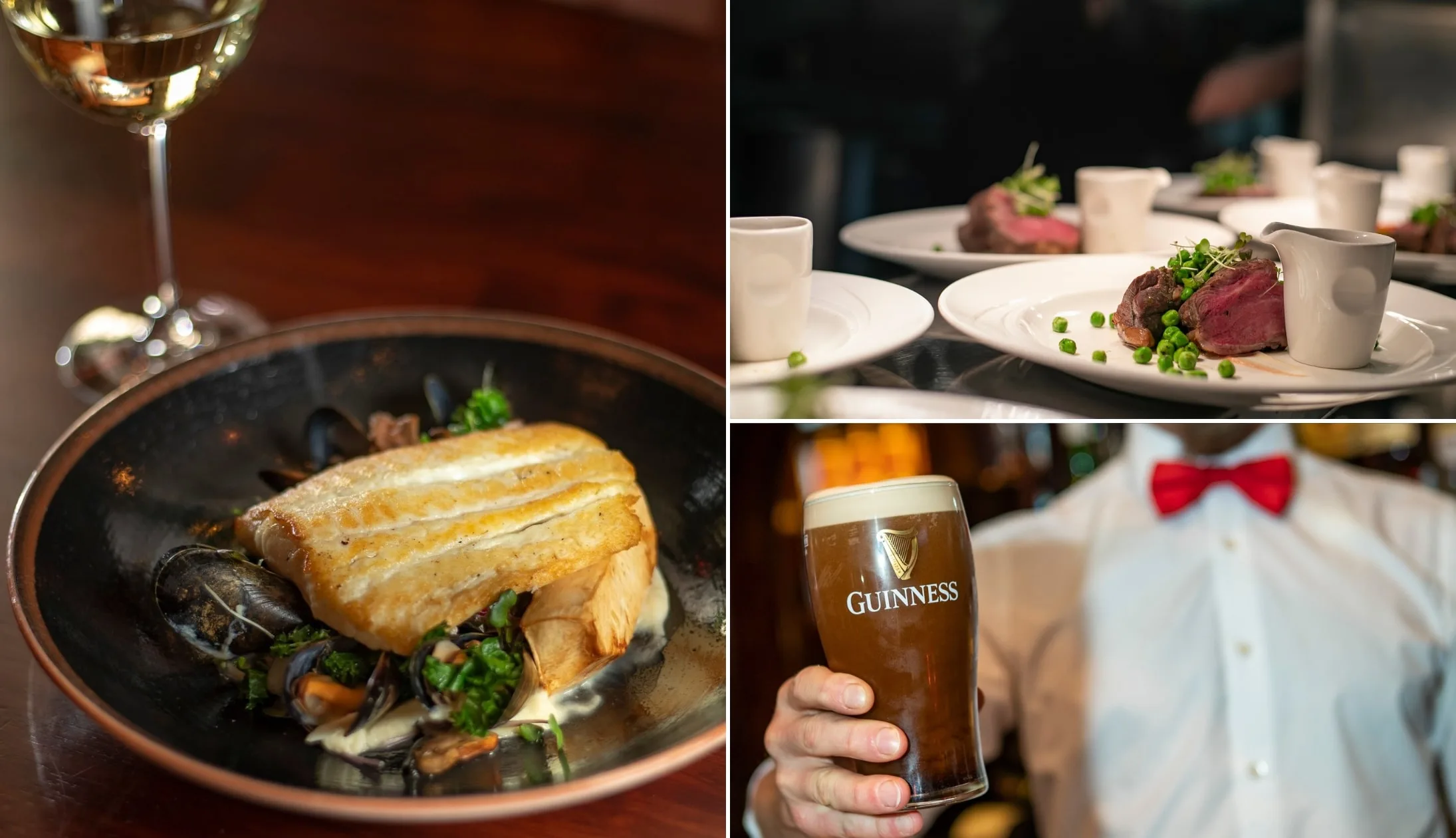
Photos via Blakes Bar Galway on FB
When you land in Galway, head to your accommodation, get checked in and head for lunch.
By now, you must be hungry. There are heaps of brilliant places for lunch in Galway, but if you don’t want the hassle of finding somewhere to eat, we’ve got a few suggestions!
We recommend Blakes Bar (traditional pub grub), Zappis (authentic Italian cuisine), or Tigh Neachtain (Irish and international cuisine).
Now, Galway is a very walkable city, but if it’s raining or if you fancy getting dropped to the ‘main’ attractions the hop-on/hop-off bus tour is well worth buying.
Regardless of which option you choose, here are some of our favourite sites in Galway City (we’ve listed them in a logical way for you to walk between them).
Stop 4: Galway Cathedral
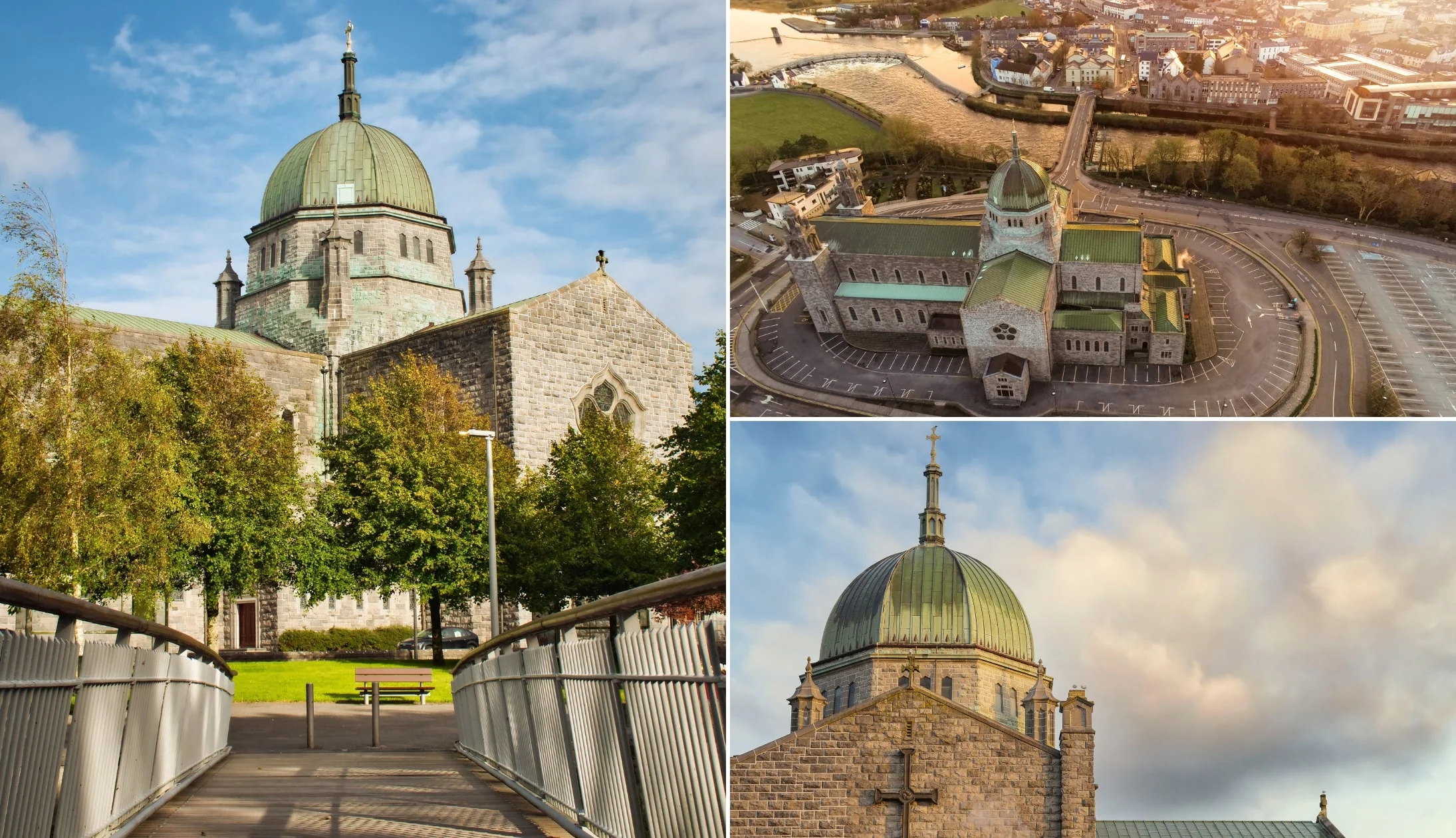
Photos via Shutterstock
Galway Cathedral is wonderfully impressive both inside and out. It’s arguably the jewel in the Galway City skyline and you’ll cop it from many places as you stroll around the city.
Interestingly enough, it’s not as old as it looks, and construction on the building was only completed in 1965, earning it the title of ‘the last great stone cathedral to be constructed in Europe’.
The cathedral is free to enter, but visitors are asked for a donation of €2 to help with the building’s upkeep.
Stop 5: Quay Street and the Latin Quarter

Photos by Stephen Power via Ireland’s Content Pool
Galway’s colourful streets are an absolute joy the ramble along regardless of the time of year.
If you’re walking from the cathedral, you’re a short stroll away from the Latin Quarter and Quay Street where you can have a nosey around.
These streets are alive with the buzz from tourists and locals alike.
Stop 6: The Hall of the Red Earl
One of our favourite places to visit in Galway (especially if it’s raining!) is the Hall of the Red Earl.
The Hall of the Red Earl is one of Galway’s most interesting sites. The ruins date back to the 13th century, with ties to the founding of Galway and the Anglo-Norman De Burgo family.
It was the first municipal building in the city, used for collecting taxes, hosting banquets, and sentencing criminals.
The Hall of the Red Earl was lost as the city grew until 1997, when the ruins were unearthed by archaeologists on behalf of the Office of the Public Works.
Today, you can walk amongst the ruins, view the artefacts, and learn about the hall’s history from the informative displays.
Stop 7: Galway City Museum
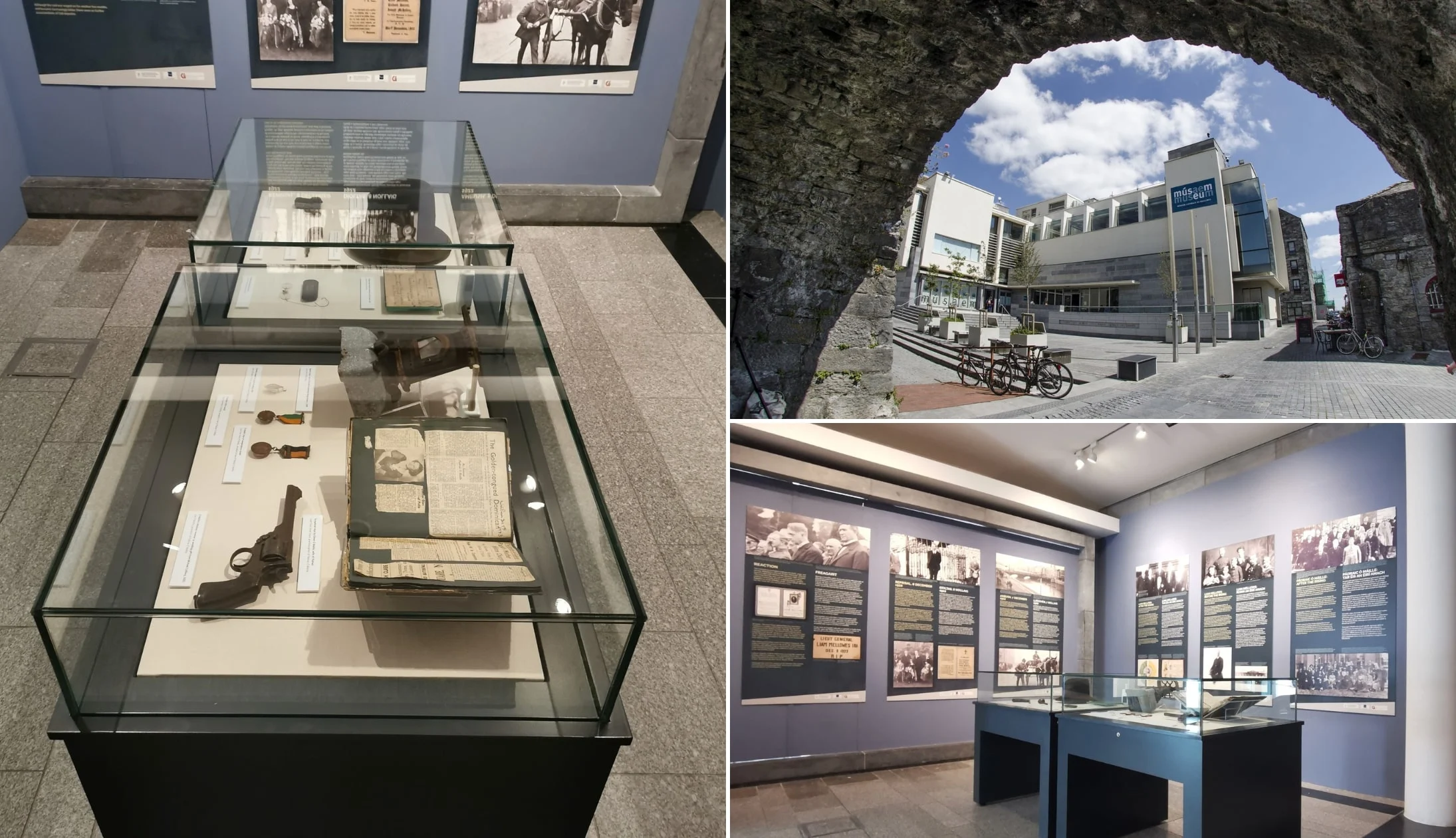
Photos via Galway City Museum on FB
The Galway City Museum is just a stone’s throw from the Spanish Arch. It’s one of the best places to learn about Galway’s history, culture, and archaeology, with collections telling the story of prehistoric Galway all the way through to 19th and 20th-century Galway!
The museum has three floors and seven long-term exhibitions, including The Wild Atlantic – Sea Science, and an exhibition on Pádraic Ó Conaire.
It’s free to visit, although donations are always appreciated.
Stop 8: Spanish Arch and the Long Walk
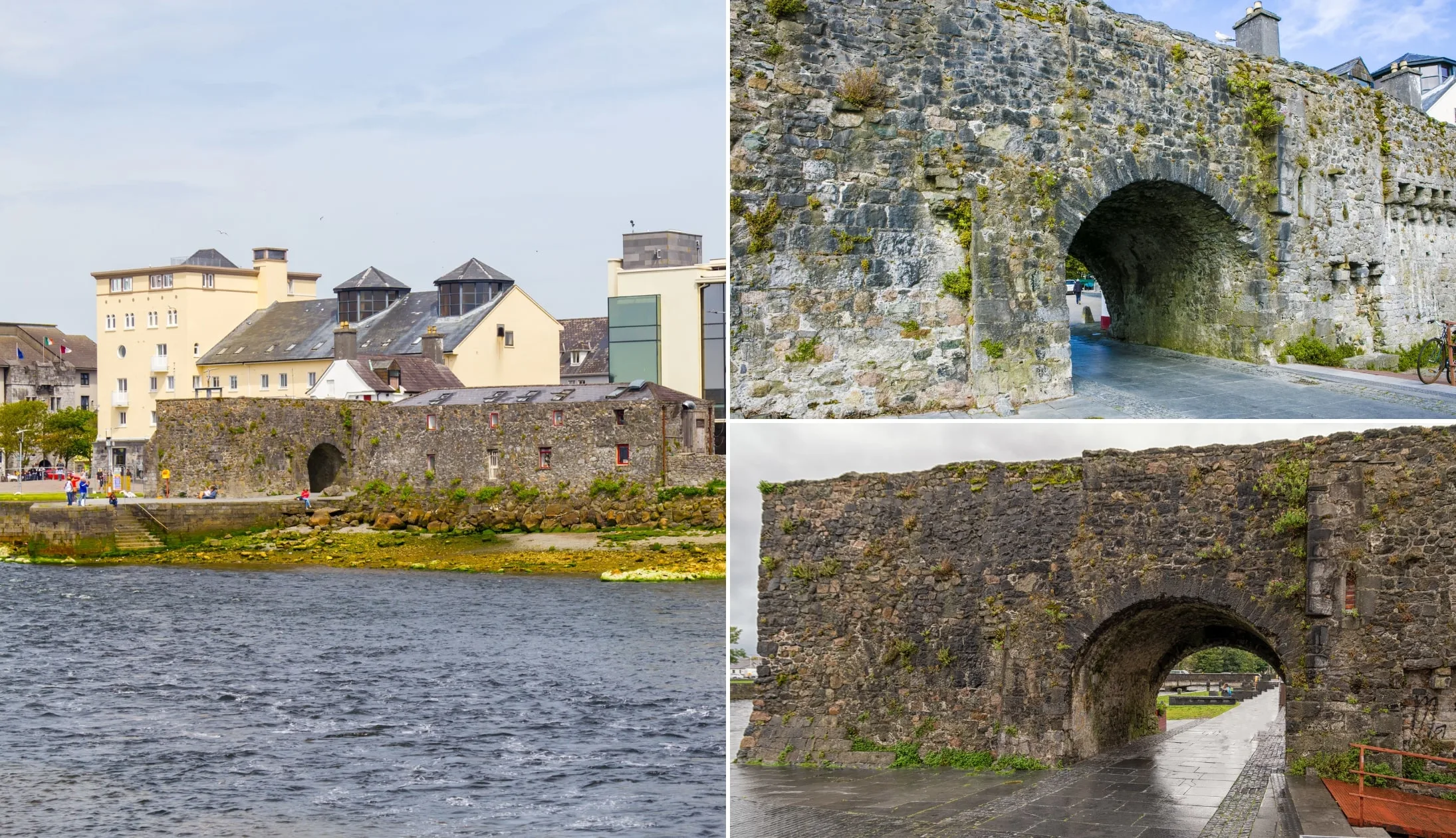
Photos via Shutterstock
The Spanish Arch is a must-see Galway attraction, dating back to Medieval times. The large stone arch is located on the outskirts of the city centre, overlooking the Claddagh (shore).
It originally housed soldiers who were keeping watch on the city’s Medieval walls. Its nickname is thought to come from the city’s merchant trade with the Spanish, whose ships would often be docked in the area!
From the Spanish Arch, you can take a short stroll alongside the water to what’s known as The Long Walk. You’ll likely have seen pictures of it (it’s a line of colourful buildings right on the water).
Stop 9: Dinner, drinks and live music
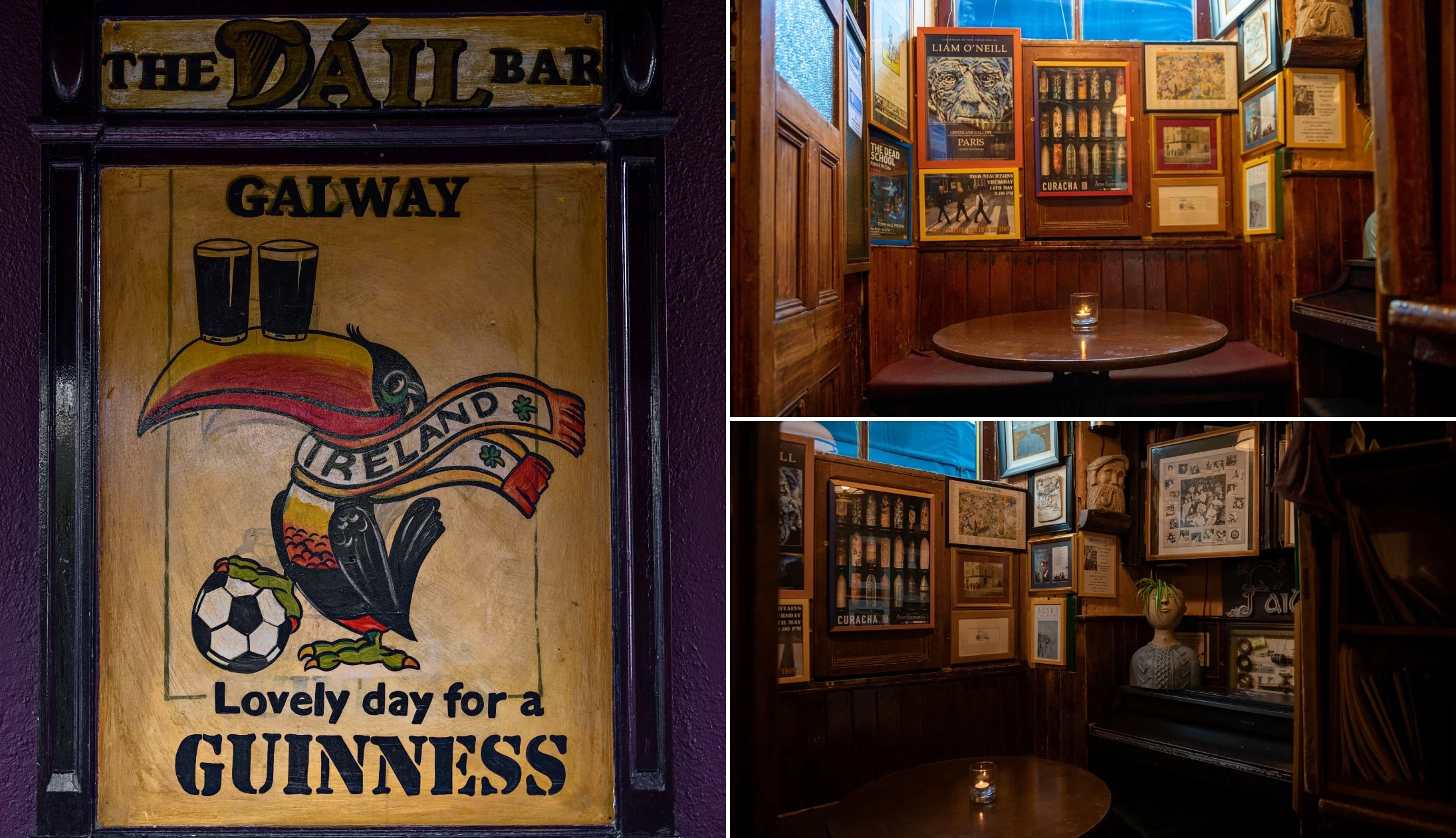
Photos courtesy Failte Ireland
After a fun-filled day exploring some of the sights and sounds of Galway, it’s time to grab some dinner and drinks, and perhaps enjoy a little live music.
Galway is a lively city regardless of the time of year. Here’s some spots worth checking out:
Our dinner recommendations
There’s some excellent restaurants in Galway – our favourites are Ard Bia, The Quay Street Kitchen, and Dela. Ard Bia is absolutely fantastic, but you need to book in advance for dinner.
The restaurant has a quirky interior and serves beautifully presented modern dishes.
The Quay Street Kitchen has a great selection of vegan and vegetarian-friendly dishes, and Dela has modern Irish cuisine on the menu.
Live music and trad bars
There’s some mighty pubs in Galway. After dinner, head out for drinks at either Tigh Neachtain or The Crane. Both are traditional pubs with a great atmosphere.
Trad music is an integral part of the city, with heaps of options to choose from. Our favourite spots are Crane Bar (mentioned above) and Tigh Chóilí.
Day 10: Connemara and Cong
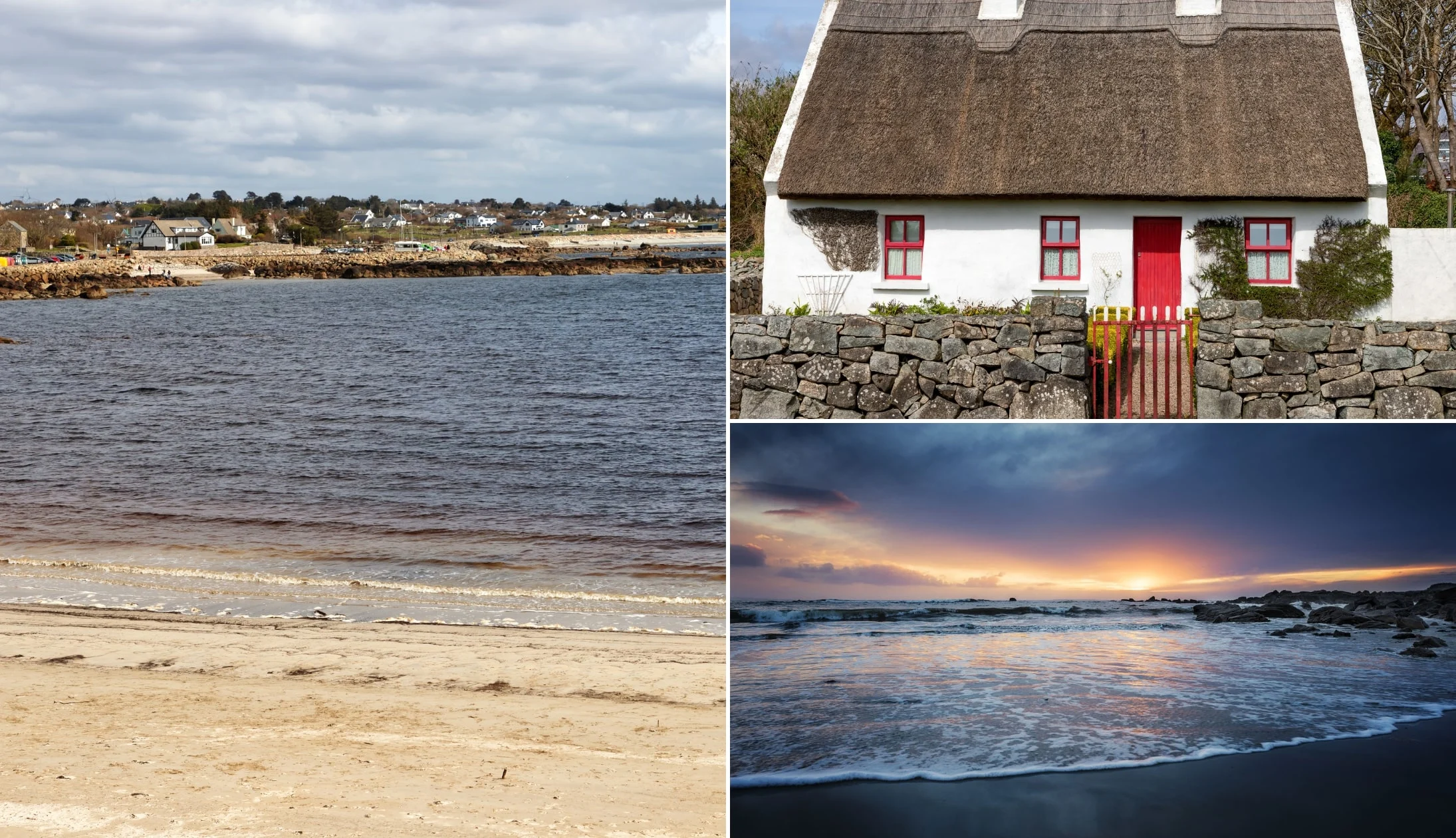
Photos via Shutterstock
Day 10 takes us out into one of the most spectacular parts of Ireland, the legendary Connemara.
This magnificent corner of the wild Atlantic coast is full of incredible attractions and beautiful scenery at every turn, and one of the best ways to see it is on a guided coach tour – here’s the one we recommend.
Start the day well with a hearty breakfast at your accommodation, or head to one of the many cafes near the start point of the tour.
Gaslight Brasserie does a range of cooked breakfasts and is just a minute away from the meeting point. Jungle Cafe is also a good call, with a bunch of healthy options to choose from, while Esquires Organic Coffee Co not only offers an amazing cup of coffee but also serves up a mean full Irish.
Stop 1: Kylemore Abbey
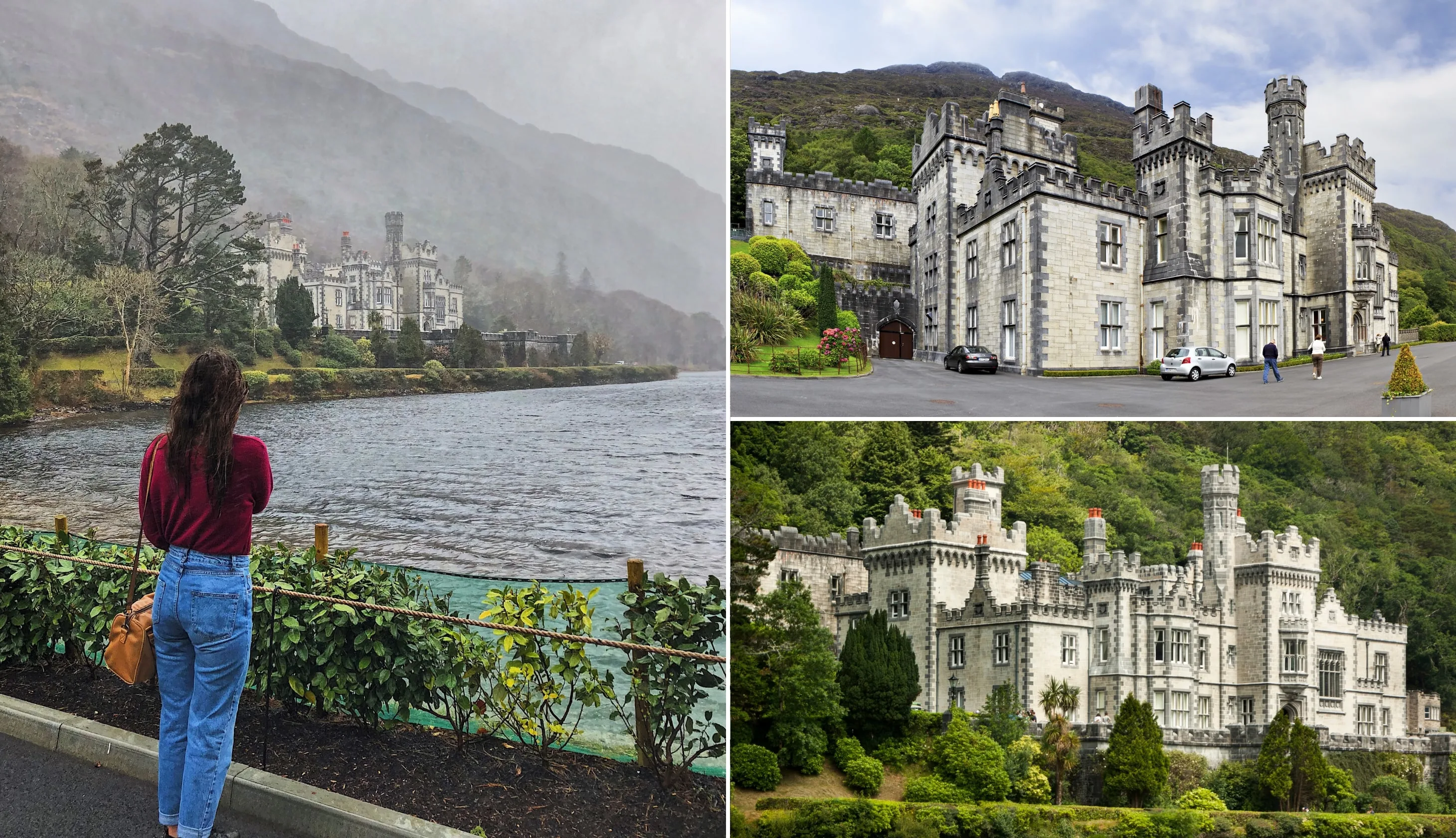
Photos via Shutterstock
Your first stop will be the epic Kylemore Abbey. Built in 1867, it’s perched on the edge of both Pollacapall Lough and the breathtaking Connemara National Park. As you wander the grounds, enjoy the gardens, church, and abbey, before checking out the tea room and gift shop.
The grounds cover a staggering 13,000 acres of land and include magnificent gardens, walks and woodlands. Meanwhile, inside the tour takes visitors on a journey through the many generations of people who have dwelled, worked, studied and prayed inside the castle’s magnificent walls.
Visitors will have stories brought to life in spectacular fashion via historical photographs, audio-visual presentations, artefacts, historical costumes and much more.
Stop 2: Killary Fjord and Leenane
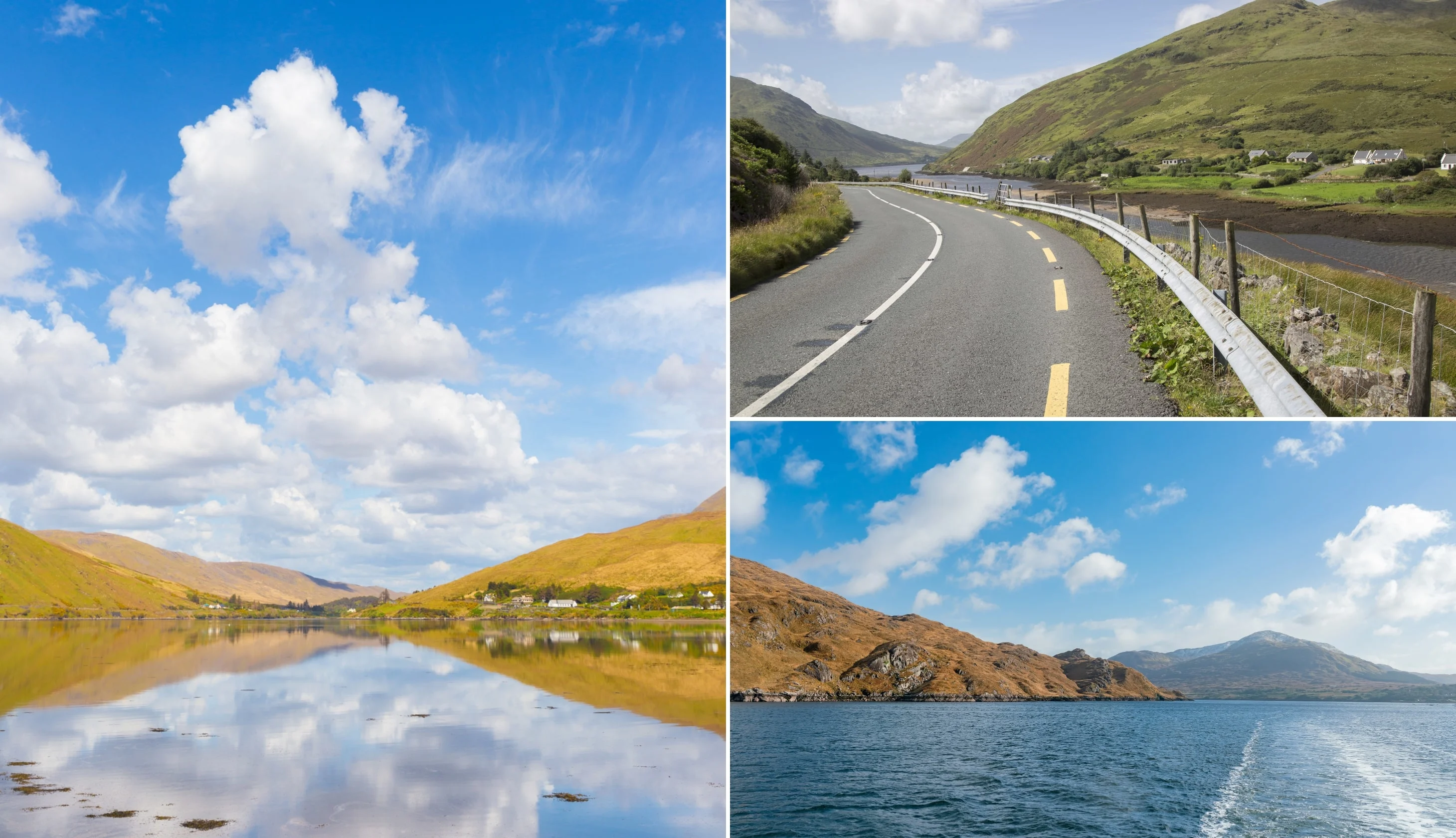
Photos via Shutterstock
After Kylemore Abbey, the coach will drive through some of the most magnificent landscapes of loughs, bogs, and rolling hills, before arriving on the shores of Killary Fjord. You’ll drive along the south coast of the mighty fjord, which is the only one in Ireland, and it’s another area of spectacular scenery. Keep your eyes open and admire the stark yet beautiful views along the way.
The gorgeous village of Leenane sits on the edge of Killary Fjord. The village offers a truly authentic experience of rural Ireland, and for most of the year, it’s pretty quiet, although it can get busy in summer.
Having said that, there are plenty of attractions. It’s perhaps most well-known for serving as the impressive backdrop to Jim Sheridan’s classic, ‘The Field’, starring Richard Harris, John Hurt, Sean Bean, Brenda Fricker, and Tom Berenger. Fans of the movie will recognise much of the village, especially Gaynor’s Bar, which starred as the local pub in the film.
The Sheep and Wool Centre is always worth checking out, and you can find hand-crafted woolly sweaters, scarves, and much more while learning about how they’re made.
Stop 3: Cong Abbey
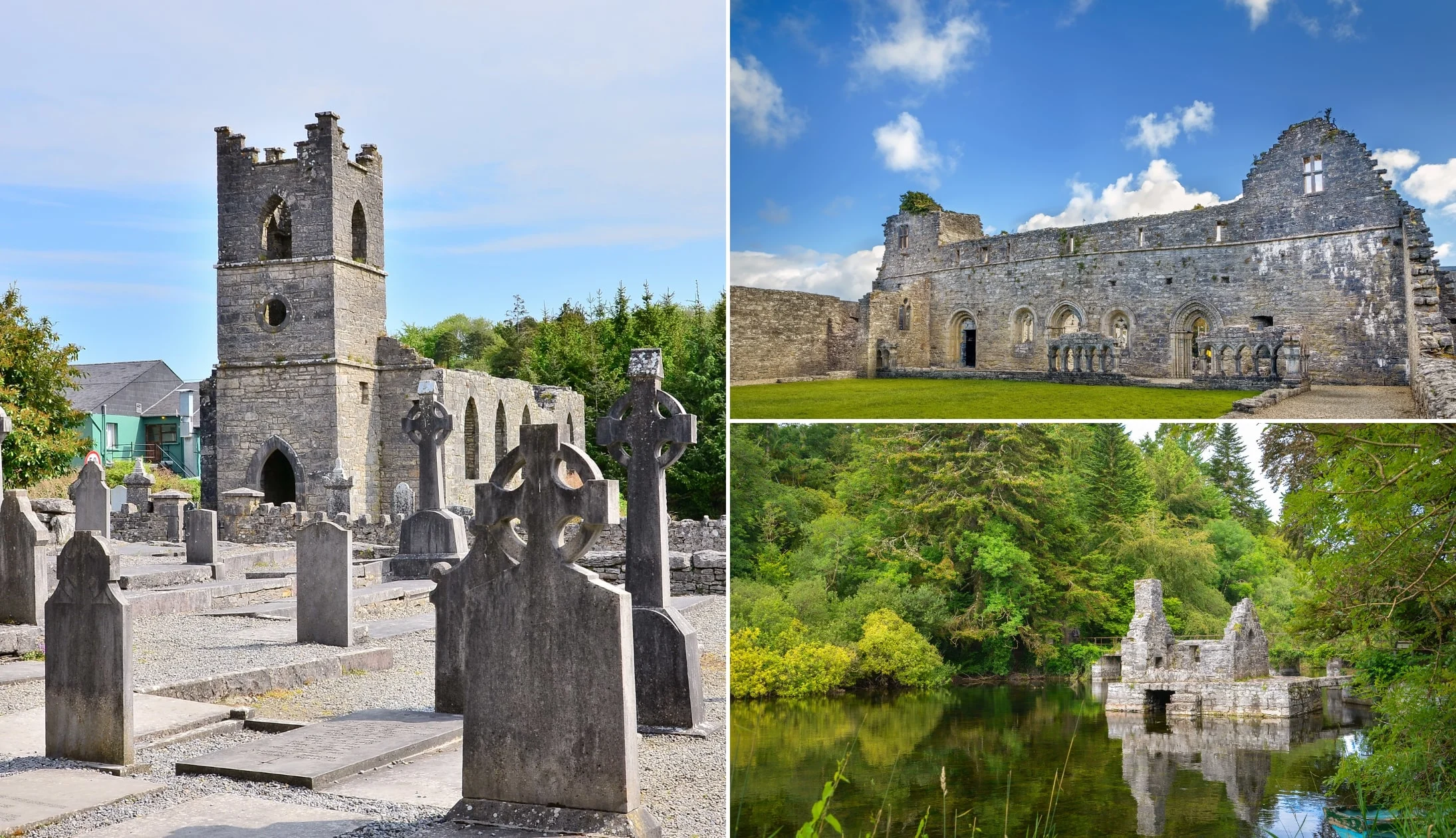
Photos via Shutterstock
After another fantastically scenic drive, you’ll arrive at the charming little village of Cong, which is like something whipped from a fairytale. Tucked between Lough Corrib and Lough Mask, it’s a wonderfully olde-worlde kind of place. Steeped in history, with close ties to the Quiet Man movie, and boasting a unique character and lots of things to see and do, it’s well worth exploring.
Cong Abbey dates back to the 12th century, and while it now lies in ruins, it remains a focal point in the village and a popular tourist attraction. The remains are located in the centre of the village, a stone’s throw from the river banks. Some of the mediaeval stone walls still stand proud, displaying intricate stonework and curious carvings.
Stop 4: An Spideal

Photos via Shutterstock
From Cong, the coach will begin to head back towards Galway, but not without a stop in the charming coastal village of An Spideal. Here, you’ll take a gentle stroll among the traditional thatched roof cottages and admire the beautiful beaches of this wonderful, Gaelic-speaking village.
Stop 5: Back to Galway

Photos courtesy Failte Ireland
After a nice ride along the coast of Galway Bay, you’ll arrive back in the city in time for dinner, drinks, and more music.
Our dinner recommendations
For dinner, we’ve got a few stellar recommendations: Ard Bia, The Quay Street Kitchen, and Dela. Ard Bia is absolutely fantastic, but you need to book in advance for dinner.
The restaurant has a quirky interior and serves beautifully presented modern dishes.
The Quay Street Kitchen has a great selection of vegan and vegetarian-friendly dishes, and Dela has modern Irish cuisine on the menu.
Live music and trad bars
There’s some mighty pubs in Galway. After dinner, head out for drinks at either Tigh Neachtain or The Crane. Both are traditional pubs with a great atmosphere.
Trad music is an integral part of the city, with heaps of options to choose from. Our favourite spots are Crane Bar (mentioned above) and Tigh Chóilí.
Day 11: The Clare coast
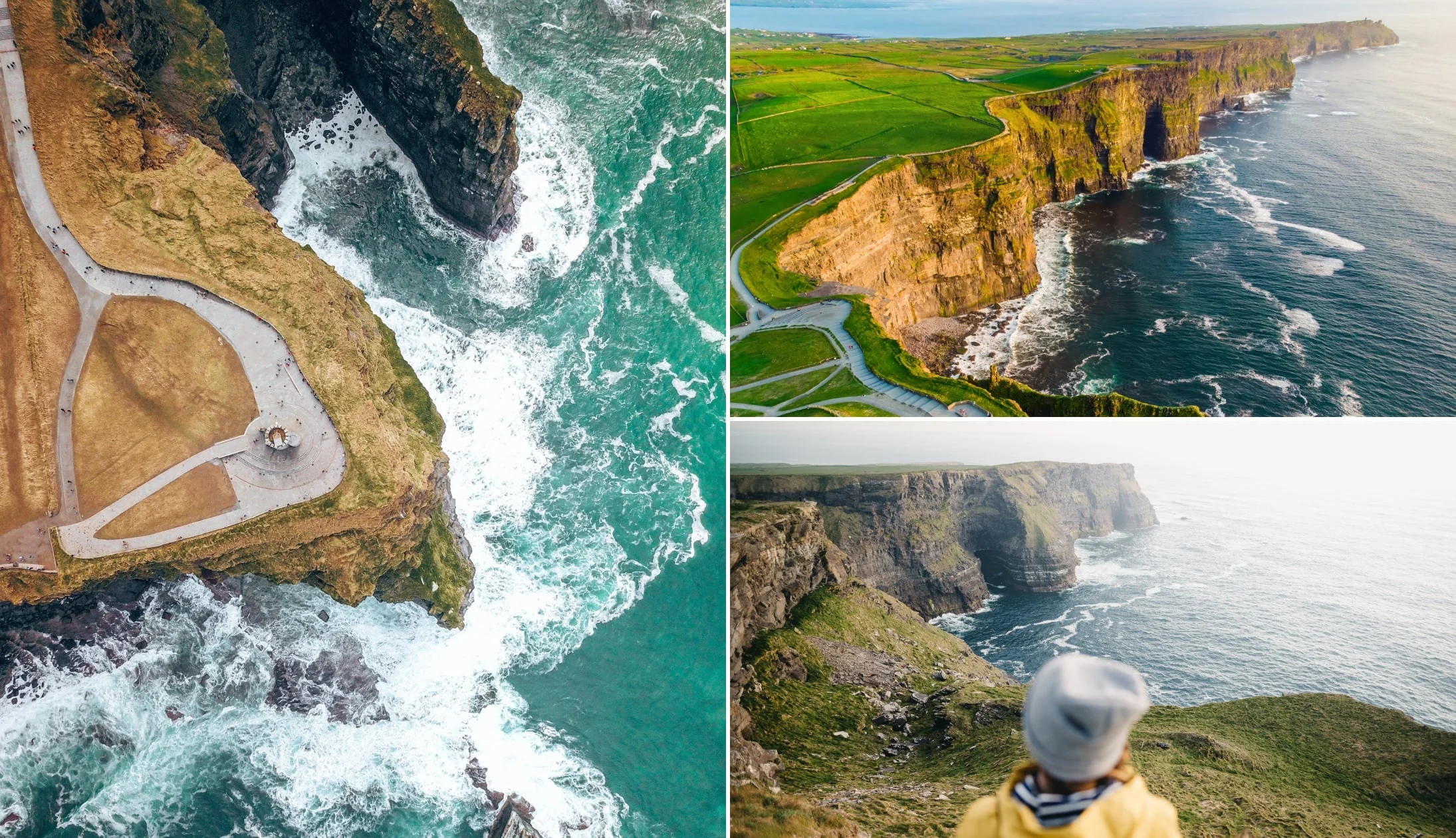
Photos via Shutterstock
Today’s tour takes us out of County Galway, around Galway Bay, and into the gorgeous County Clare, an area famed for its stunning natural beauty.
The road itself is an attraction, so be sure to keep your eyes peeled for a clatter of gorgeous hills, rivers, lakes, and mountains, not to mention the beautiful and ever-present Galway bay.
Today’s tour meets at 9:30 am outside of Kinlay Hostel on Eyre Square. Grab some breakfast at your accommodation or head to Pascal Coffee House or Gaslight Brasserie for a tasty bite before the tour departs.
This 8-hour coach tour leaves Galway at 9:30 am, though it’s best to arrive 15 minutes early for check-in. Normally, you’ll arrive back in Galway between 17:30 and 18:00, after a superb day of sightseeing.
Let’s take a look at some of the main stops along the way, but as always, bear in mind your specific tour may differ.
Stop 1: Dunguaire Castle
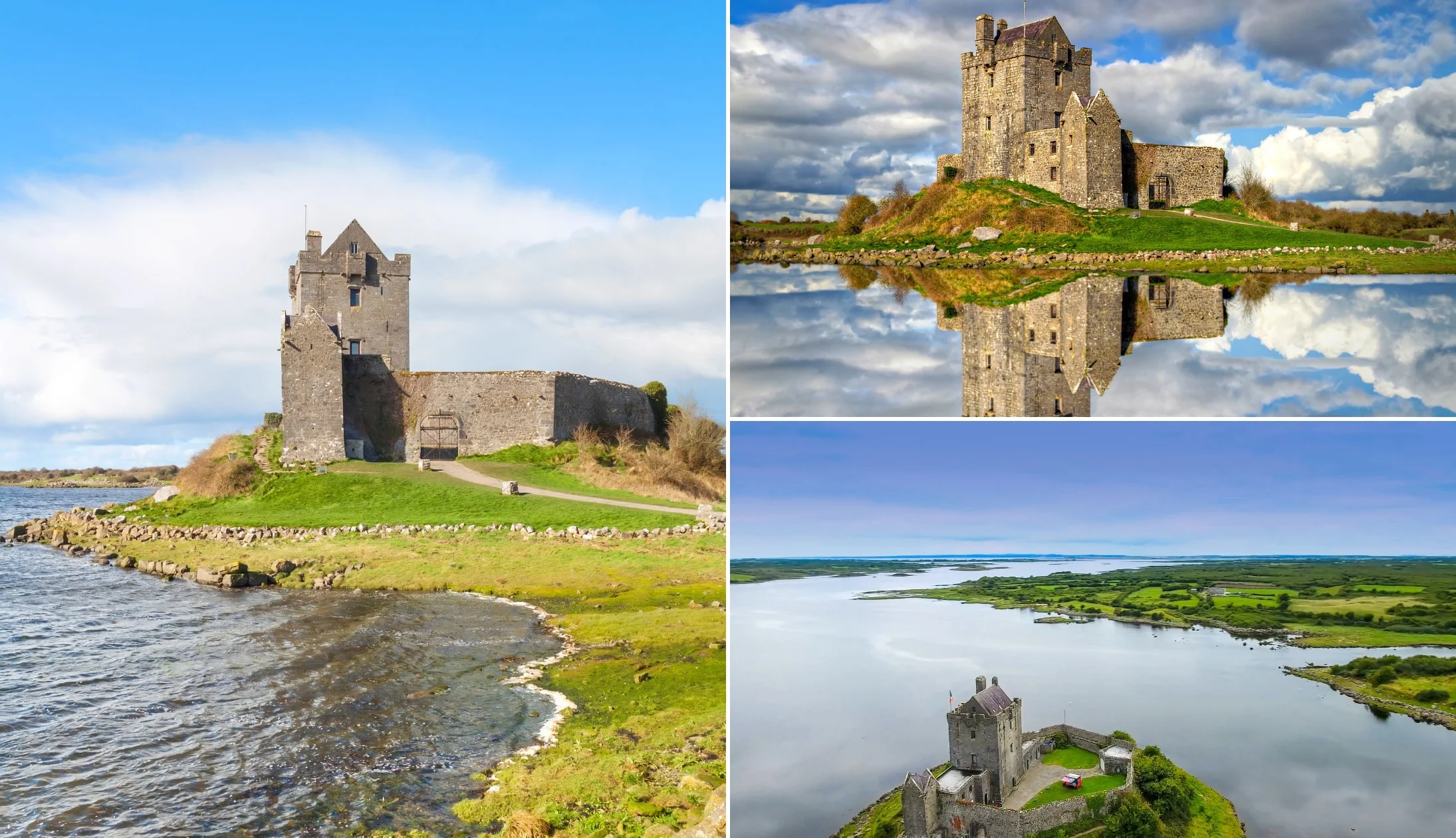
Photos via Shutterstock
The stunning Dunguaire Castle sits on a spit of land jutting out into Galway Bay and has a long history stretching back to mediaeval times. Built in 1520 by the prominent O’Hynes Clan family as a simple tower house with fortified walls, it’s stunningly beautiful from the outside.
To truly experience the beauty of this fortress, head off on a self-guided tour of Dunguaire Castle. The grounds are lovely and the interior is fitted with period furniture and plaques that’ll take you through the castle’s past.
Stop 2: Corcomroe Abbey
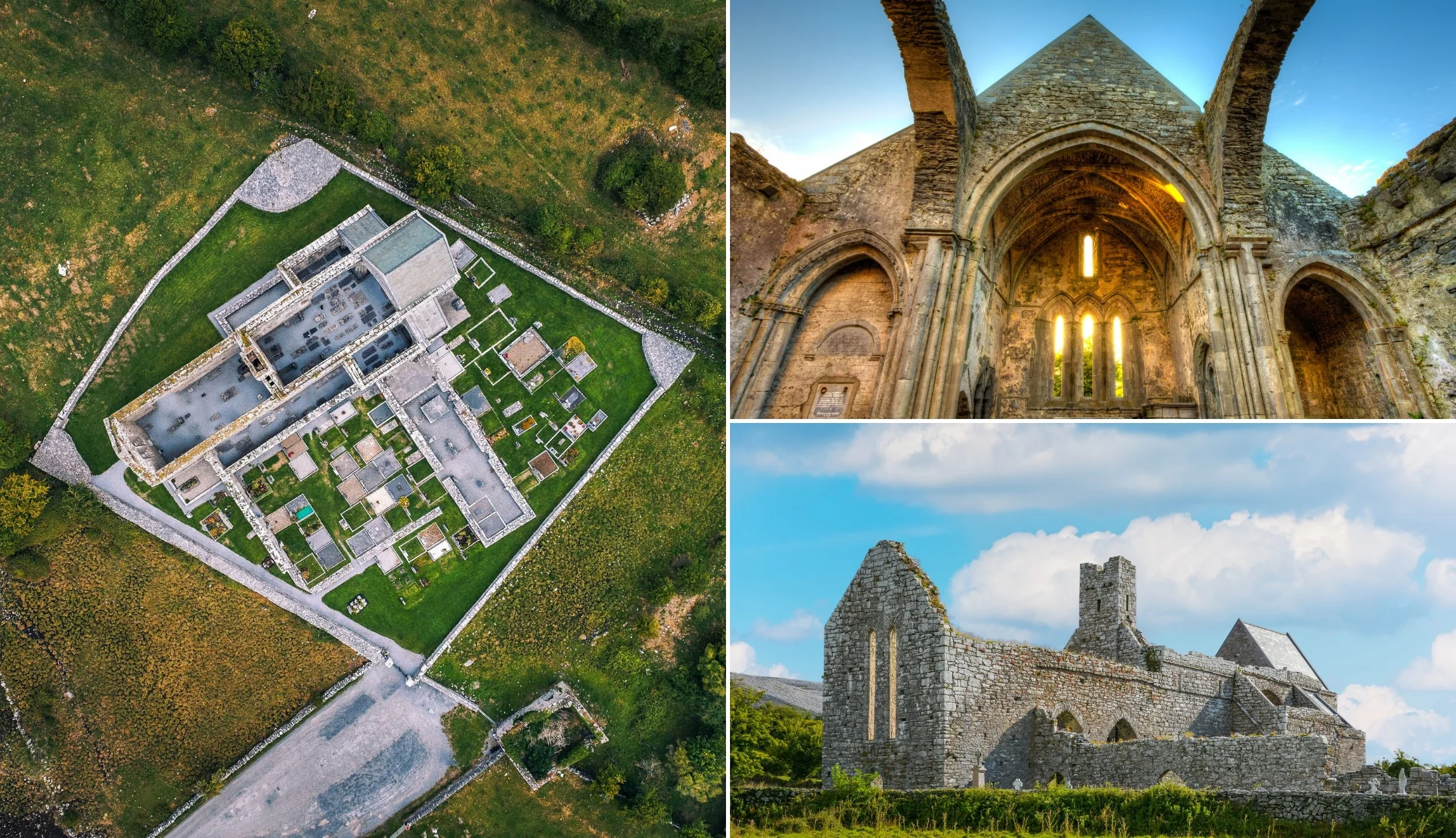
Photos via Shutterstock
Next, you’ll drop by the incredible Corcomroe Abbey, a stately 13th-century Cistercian monastery surrounded by beautiful countryside. While it now sits in ruins, the walls and towers have been incredibly well-preserved, and it’s a truly humbling experience to wander among the ancient stones.
Stop 3: The Burren
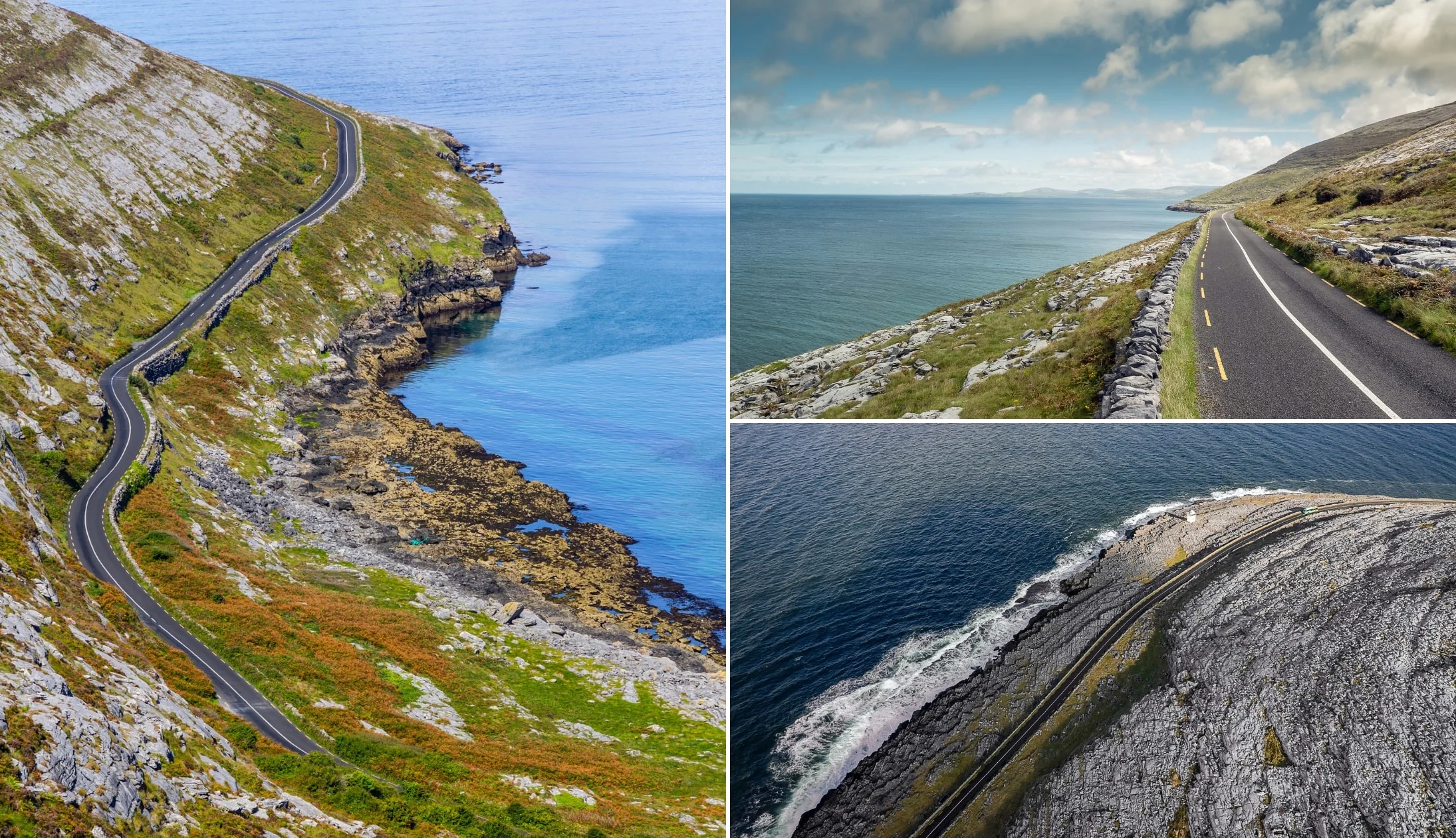
Photos via Shutterstock
The Burren is a vast area of more than 250 sq km that stretches out as far as the Aran Islands. Famed for its craggy landscape made up of huge slabs of limestone known as Karst, it’s a wonder to behold. The Burren actually translates to ‘a rocky place’, and the limestone pavements are a testament to this.
While the area is famed for its rocks, there’s an abundance of vegetation that manages to survive in the area, including wildflowers, herbs, grasses, and more. In fact, cattle and livestock have managed to survive and indeed thrive on the nutritious grasses grown in the Burren for centuries.
You’ll spend a good part of your tour driving through this epic landscape, so have your camera ready to catch the action!
Stop 4: Doolin Pier
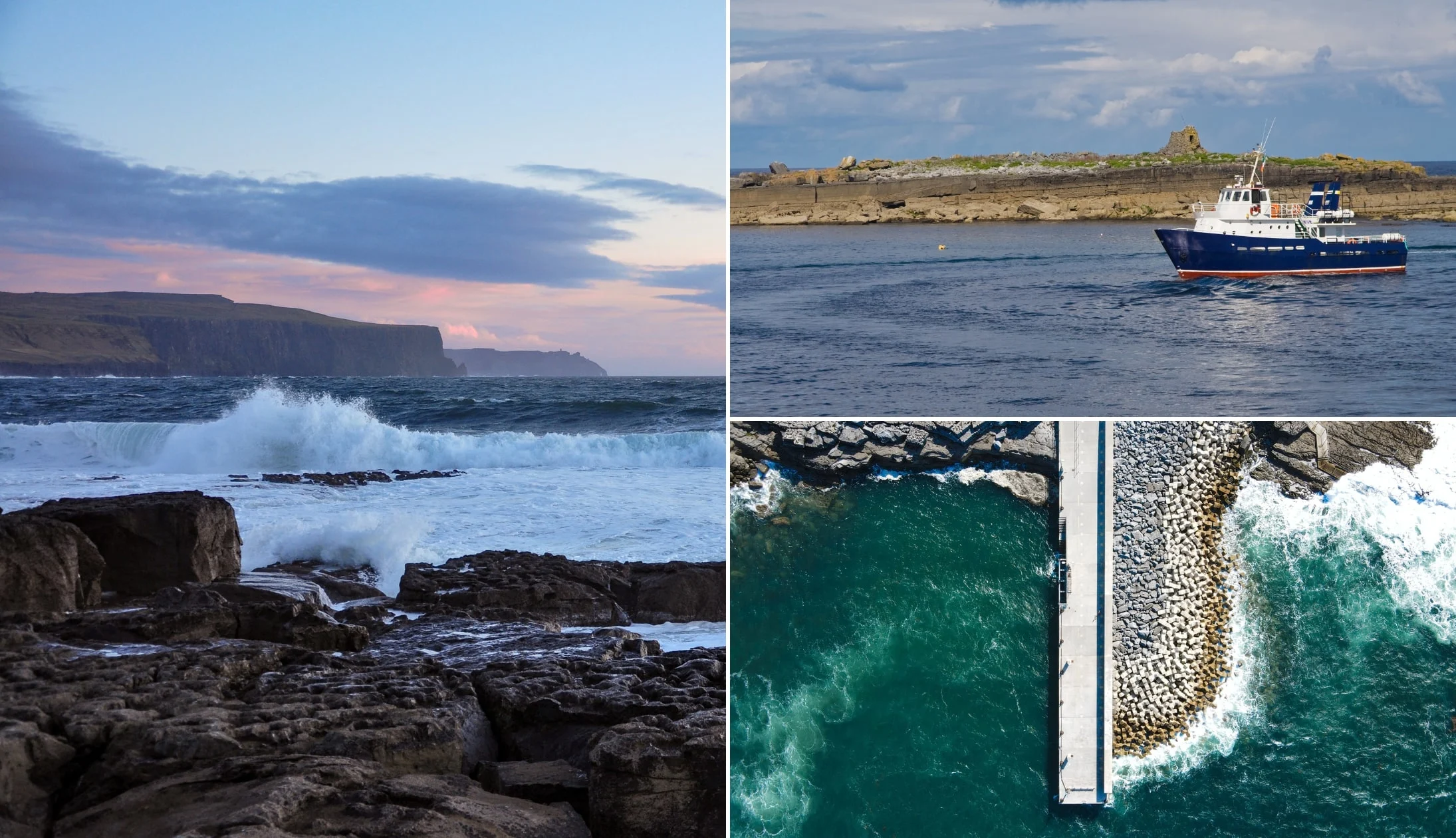
Photos via Shutterstock
Doolin is a vibrant little village. The pier is best known for being the departure point for ferries heading to the Aran Isles and the Cliffs of Moher. Enjoy a ramble around the village, taking in the various craft shops, and photos at the pier, before heading for lunch at the Hotel Doolin.
Stop 5: Lunch at Hotel Doolin
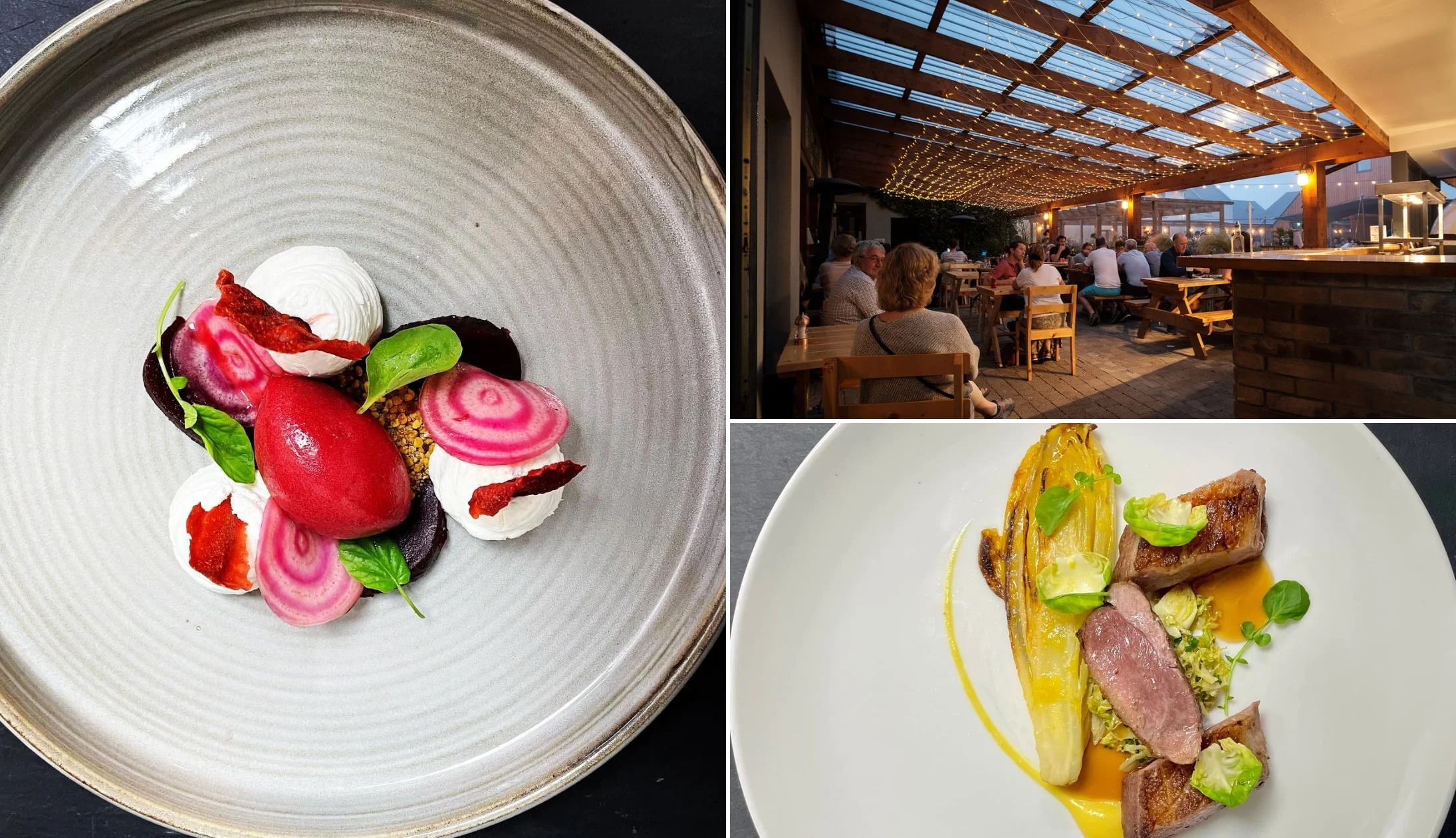
Photos via Hotel Doolin on FB
You’ll get an hour and a half to enjoy a sumptuous lunch at Hotel Doolin’s Fitzpatrick’s Bar. This is a lovely traditional pub with a crackling fire and an extensive menu, packed full of Irish classics and modern dishes alike. There’s plenty of fish, shellfish, lamb, beef, and chicken on the menu, but also lots of veggie and vegan options. Don’t miss the seafood chowder and soda bread!
Stop 6: The Cliffs of Moher

Photos via Shutterstock
The highlight of the tour is a guided walk atop the mighty Cliffs of Moher. Standing 214 metres above the sea, you’ll get amazing views over Galway Bay as the waves smash the rocks below you. You’ll enjoy a couple of hours here, with plenty of opportunities to walk along the cliff tops and the surrounding countryside, enjoying some of the best views in Ireland.
Stop 7: Lisdoonvarna
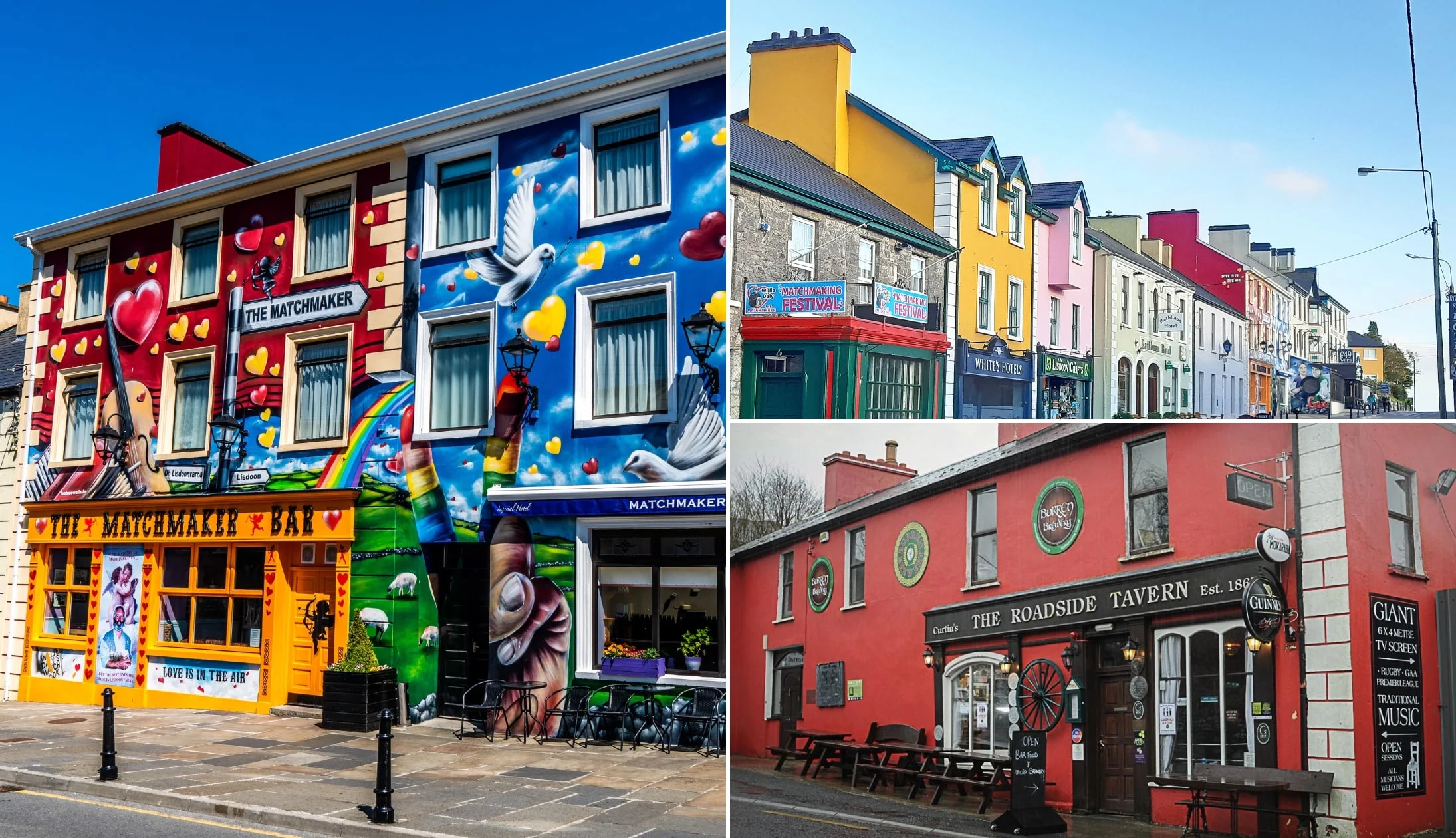
Photo left: UpSwing Mediaa. Top right: Maria Ryan Donnelly. Bottom right: Failte Ireland
Lisdoonvarna is a charming and peaceful spa town and an excellent example of life in rural Ireland. However, that all changes during the famous annual Lisdoonvarna Matchmaking Festival, the largest in Europe. Each September, it attracts around 40,000 hopeful singletons in search of true love.
The Lisdoonvarna Matchmaking Festival takes over the bars, pubs, hotels and streets of Lisdoonvarna and takes place throughout the month of September. The festival boasts an impressive line-up of live music and dancing both midweek and at weekends.
If you’re visiting outside of September, chances are you’ll just drive by and hear the story of the festival.
Stop 8: Back to Galway

Photos via Blakes Bar Galway on FB
After another drive through breathtaking countryside, you’ll normally be back in the middle of Galway by 18:00, just in time for dinner, drinks, and entertainment.
Our dinner recommendations
For dinner, we’ve got a few stellar recommendations: Ard Bia, The Quay Street Kitchen, and Dela. Ard Bia is absolutely fantastic, but you need to book in advance for dinner.
The restaurant has a quirky interior and serves beautifully presented modern dishes.
The Quay Street Kitchen has a great selection of vegan and vegetarian-friendly dishes, and Dela has modern Irish cuisine on the menu.
Live music and trad bars
There’s some mighty pubs in Galway. After dinner, head out for drinks at either Tigh Neachtain or The Crane. Both are traditional pubs with a great atmosphere.
Trad music is an integral part of the city, with heaps of options to choose from. Our favourite spots are Crane Bar (mentioned above) and Tigh Chóilí.
Day 12: The trip to Donegal

Photos via Shutterstock
We’ve had an action-packed few days in Galway, but today we’ll leave the hustle and bustle behind and head to the wonderful Donegal Town.
We’ll enjoy some of the local sights and attractions before hitting the town one last time.
The bus leaves at 9 am today, so rise up early and enjoy a tasty breakfast at your accommodation.
It’s unlikely that any cafes will be open this early, but you can often grab something from a shop if your accommodation doesn’t have breakfast.
We’ll be staying just one night in Donegal.
Our Donegal Town accommodation recommendations
- Budget: Heeneys Lodge B&B (superb reviews and a 5-minute spin from town) and Ros Dún House (top reviews and a 3-minute ramble away from the town)
- Mid-range: Central Hotel and The Gateway Lodge (both are right in the town and make a great base to explore from)
- Luxury: Lough Eske Castle (one of Ireland’s top hotels a short drive from town) and Harvey’s Point (gorgeous lakeside 4-star just outside of town)
Stop 1: Cathedral Gaol Rd bus stop 10936 & 10937
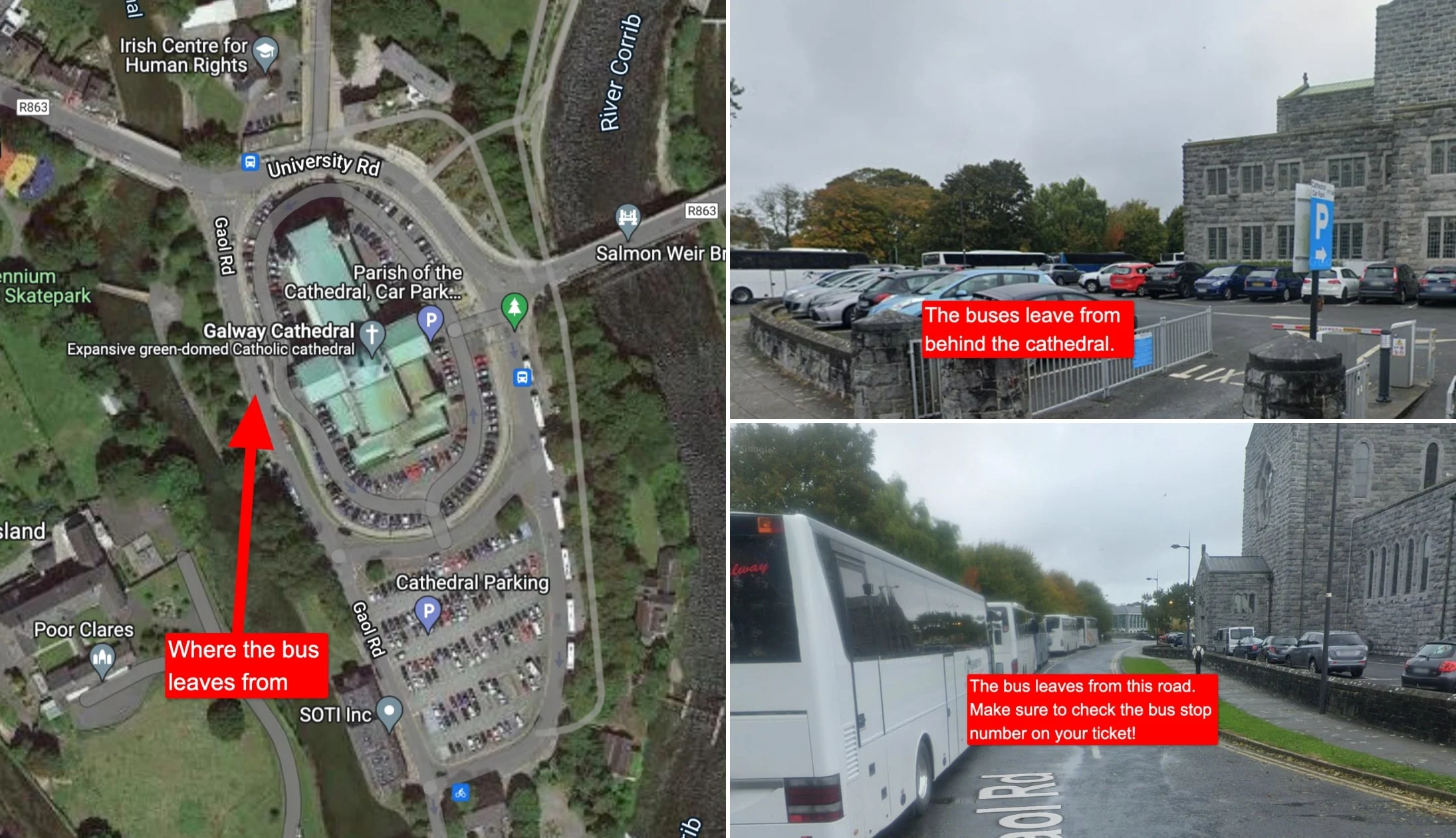
Photos via Google Maps
Today you’ll be taking a direct bus to Donegal Town. It departs from Galway Cathedral, the Gaol Rd bus stop 10936 & 10937 (that’s the road with the Salmon Weir Bridge).
The bus is operated by Bus Feda and leaves at 9 am Monday to Saturday, and it’s worth booking online to secure your place. Tickets cost €23.00 and the journey takes a little over 3 hours.
If you miss the 9 am bus, there is another at 4 pm Monday to Saturday. On Fridays, there are two extra services, one at 1.30 pm and another at 5.30 pm. On Sundays, there’s only a 3 pm service.
Please note that prices and times may change, so always check when you’re booking.
Stop 2: Donegal Town
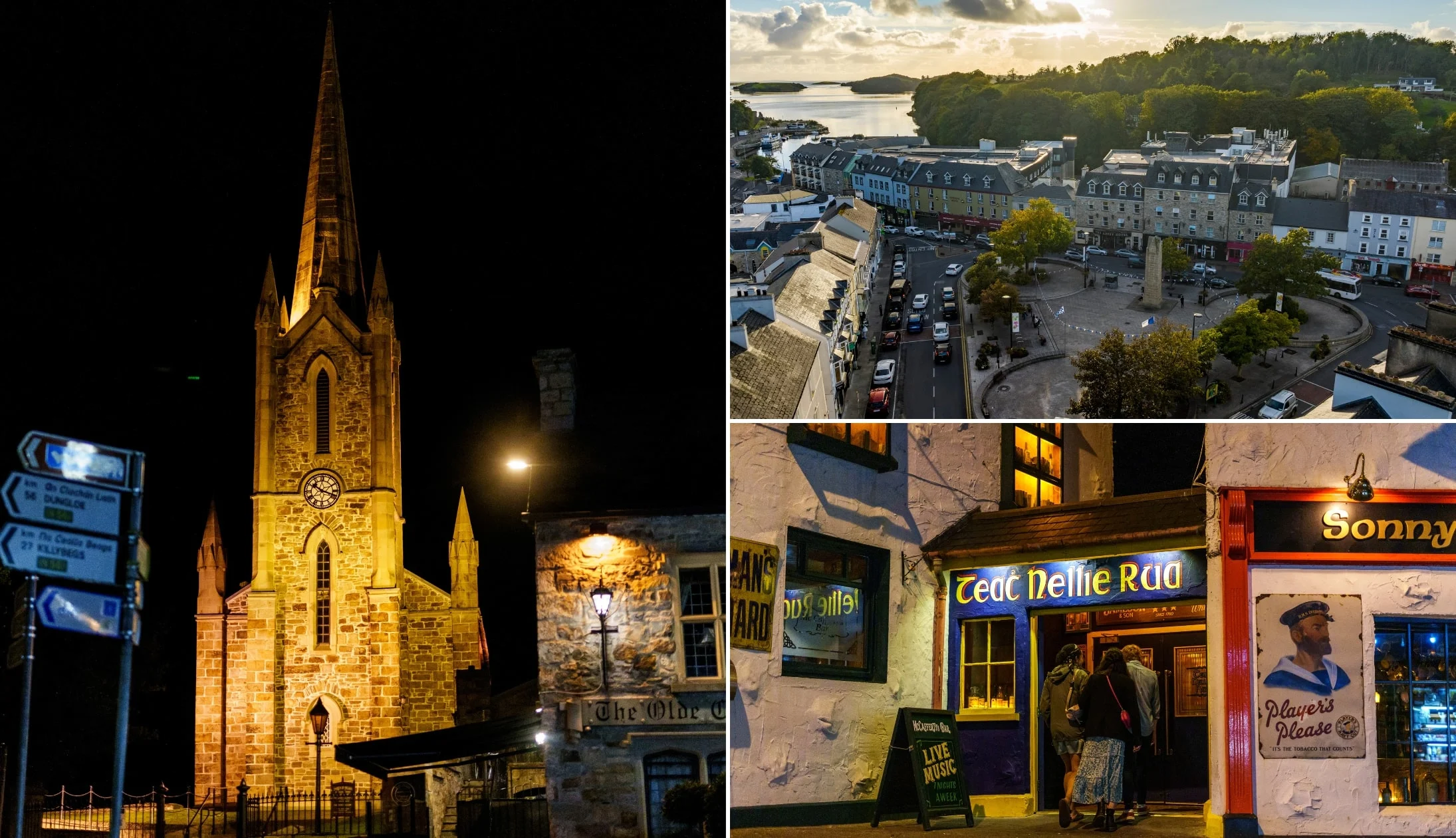
Photos courtesy Failte Ireland
If you’ve taken the morning bus, you should be arriving in Donegal Town just after midday. Welcome! The bus will drop you off in the car park opposite the Garda Station, near the tourist information centre.
Donegal Town is a lovely place to stroll around, so grab a coffee—Coffee on Sene by the tourist information on Quay Street is good—and enjoy the sights.
It’s a lovely place for a wander with attractive buildings, a 2.5km riverside walk and a restored 15th-century castle rising above the rooftops.
The town has colourful cottages, historic pubs, independent shops, a few churches and a famine graveyard to keep you busy for a while.
Once you’ve wandered about a bit, checked into your accommodation, and dropped your stuff off, it’s time for lunch.
Stop 3: Lunch
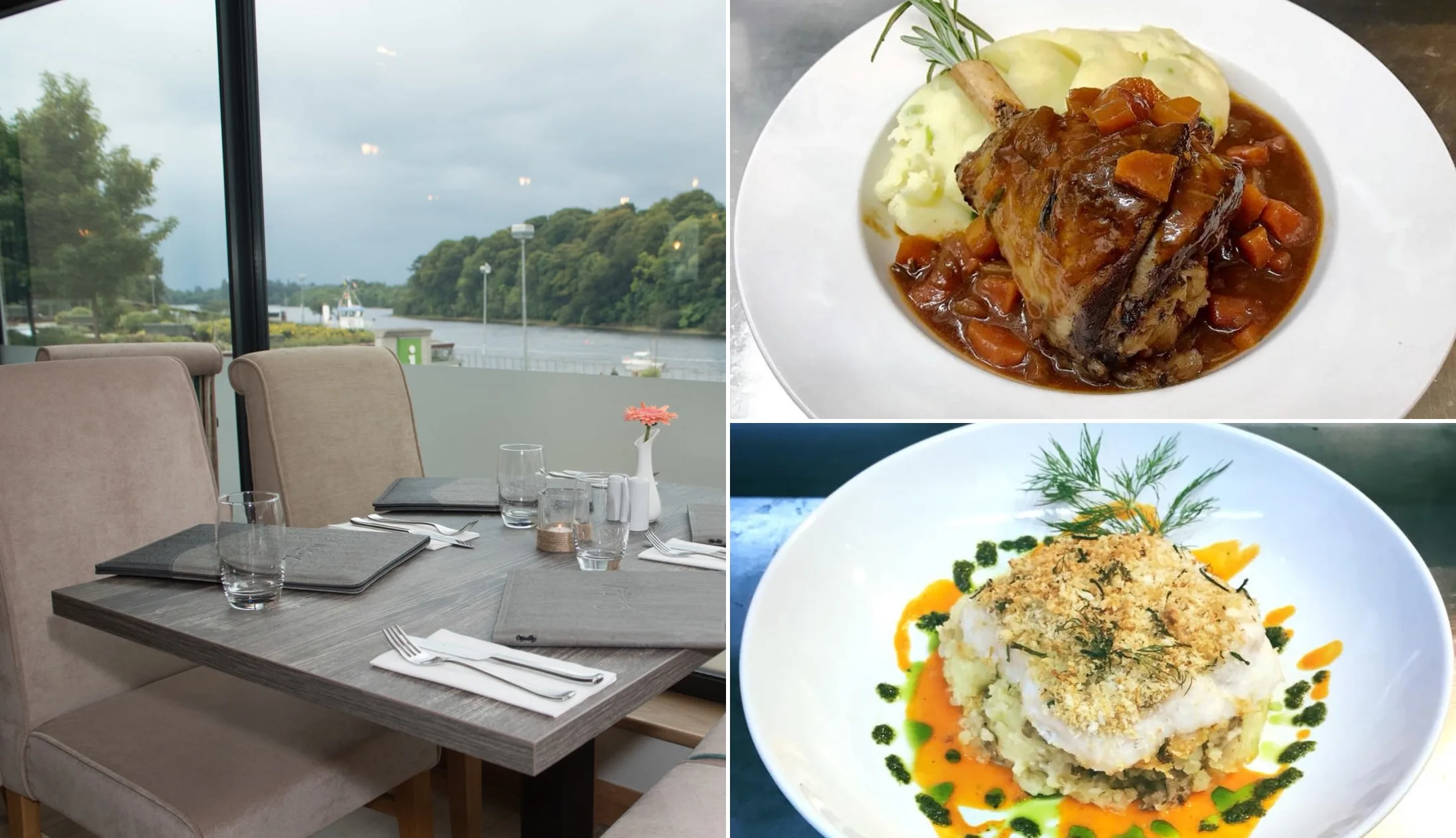
Photos via Quay West on FB
If you fancy enjoying magnificent views of Donegal Bay and Bell’s Isle while you eat, stop by Quay West for lunch.
With its chic interior, this award-winning dining establishment is well-known for delivering flavoursome and reasonably priced food.
The menu is extensive and features local delicacies like Donegal mountain lamb, chargrilled Aubrac beef, and fresh Killybegs Seafood.
Alternatively, Olde Castle Bar & Red Hugh’s Restaurant is located near Donegal Castle and right next to a picturesque 9th-century Church.
It’s a traditional Irish bar and restaurant that offers the freshest locally sourced seafood and steaks.
Stop 4: Donegal Castle

Photos via Shutterstock
After enjoying a spot of lunch, take a gentle stroll to the epic Donegal Castle. It is said that when Donegal Castle was originally built in 1474, it was the most impressive of the many Irish castles the island boasted at the time.
Former seat of the mighty O’Donnell clan, it’s seen many battles and is steeped in history. One of the best ways to learn more is to take a tour of the grounds.
Along the way, you’ll take in barrel-vaulted storerooms, a magnificent carved fireplace, and an uneven “trip” stairwell to catch enemy intruders unawares.
There are also plenty of exhibits along the way, and it’s well worth the €5 admission fee.
Stop 5: Donegal Bay Waterbus
Next up is arguably one of the most unique things to do in Donegal town. I’m talking, of course, about the Donegal Waterbus. There’s even a sing-song on the return journey (and why not!).
Opt for seats in the air-conditioned salon or the open deck, and enjoy the passing scenery and live commentary from the captain.
As you cruise the bay, you’ll pass the bronze statue commemorating the Chieftain Red Hugh O’Donnell, Ballyboyle Island, The Hassans, the Old Coastguard Station, Belles Isle with its ruined castle, local oyster farms and a sizable seal colony.
The departure point is just a 4-minute walk from the castle, but it’s important to check the departure times in advance, as they’re reliant on tide times. It’s also worth noting that the waterbus tour only operates in the summer months.
Stop 6: Dinner, drinks and live music
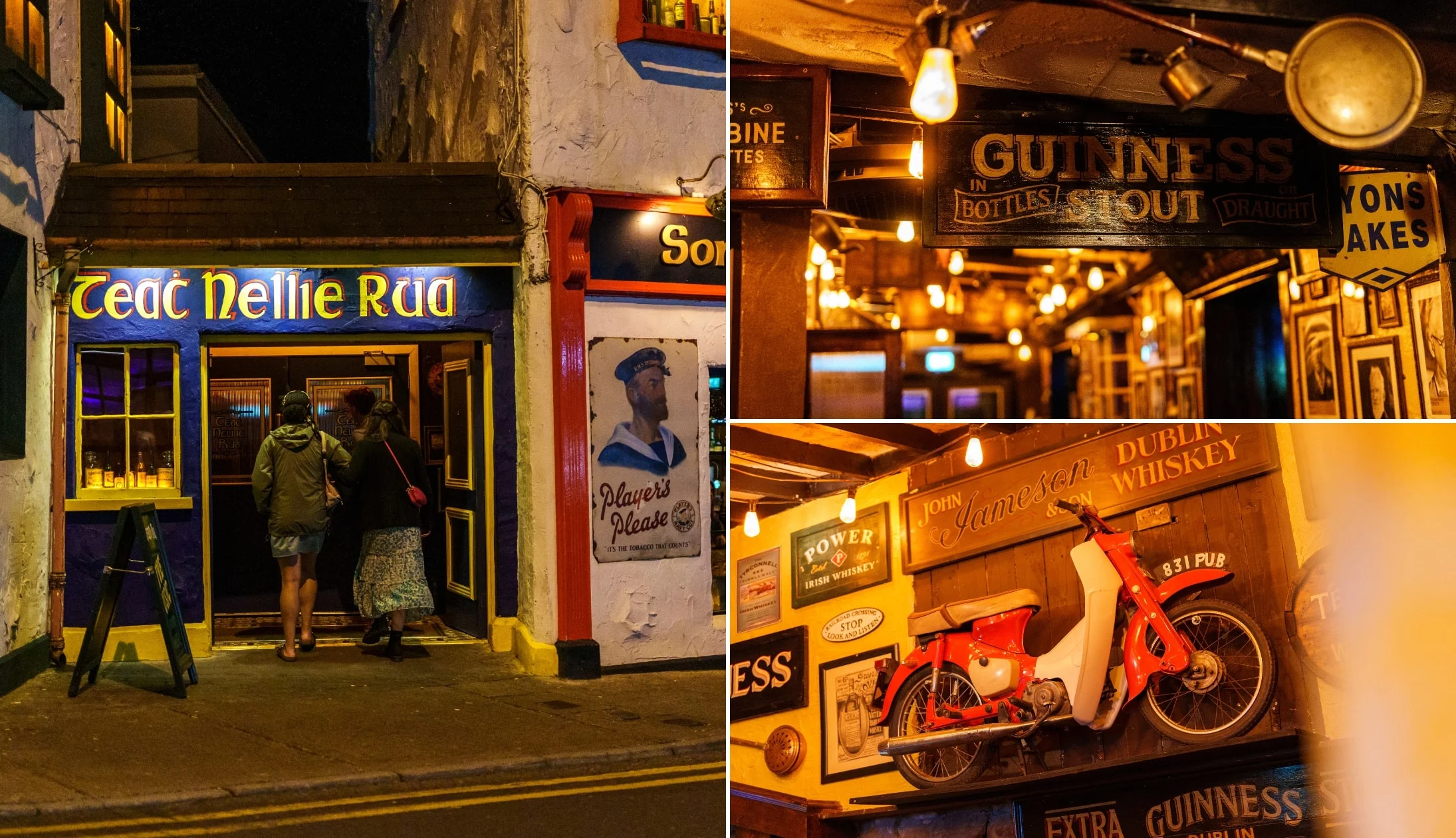
Photos courtesy Failte Ireland
Once you drop anchor, it’ll probably be nearing dinner time. As this is your last night in Ireland, be sure to kick back, relax, and enjoy the culture to its fullest.
Fortunately, Donegal Town has plenty to offer in that regard.
Our Donegal Town food recommendations
There are loads of great restaurants in Donegal Town. If you didn’t check out Olde Castle Bar and Red Hughes at lunchtime, it’s well worth dropping in.
Their gastropub menu of freshly sourced seafood, steaks, lamb and poultry regularly nets them “Best in Ireland” awards in the McKennas Guides.
The Harbour Restaurant & Bar is a casual spot specialising in home-cooked food created from the highest quality local ingredients and is another top choice.
Meanwhile, the Market House restaurant in Donegal Town has an extensive menu with everything from fresh seafood that’s straight off the boat in Killybegs to locally sourced lamb and pork.
Our Donegal Town pub recommendations
Just over the bridge from the castle and tucked away on the quiet yet wonderfully named Meetinghouse Street, you’ll find the Forge.
With old stone walls, a stable door, and knick-knacks adorning every inch of the walls (and ceilings), it’s full of charm and character.
Sitting in the heart of town, McCafferty’s Bar is another fine place to spend your last evening in Ireland. From the wood panelling and the hanging jugs to the cosy nooks and friendly staff, it’s a true Irish pub in every sense.
Located near the castle on Bridge Street, the Reel Inn offers award-winning Irish music with plenty of traditional songs and craic every night of the week.
Day 13: The trip to Donegal Airport

Photos via Google Maps and Shutterstock
Today we head back to Donegal Airport for your flight home. Ideally, this should be an afternoon flight, as it’s going to be a fairly long journey to the airport. You’ll be taking at least two buses, though you can take a taxi for some sections. Just be sure to book ahead.
Before you head out, be sure to enjoy one last Irish breakfast, either at your accommodation or at Blueberry Tea Room and Restaurant. Believe me, you’ll struggle to find things like white pudding and boxty outside of Ireland!
Blueberry Tea Room offers up some superb breakfast treats, and besides their Donegal Fry, you can order granola, porridge, scones, breakfast sandwiches, various egg dishes, and several veggie options. They also brew up a mean cup of coffee!
Option 1: Bus Eireann and Local Link
You have two options for getting to Donegal Airport from Donegal Town. Option one takes you on two bus journeys and leaves earlier in the day.
Stop 1: Donegal Abbey Hotel
Your first bus of the day leaves from the bus stop right outside Donegal Abbey Hotel. Hop on the 494 Bus Eireann bus to Dungloe at 9 am, and ride for 6 stops until you reach Dungloe. The journey should take about an hour and 25 minutes, and you’ll hop off at the bus stop opposite Sweeney’s Hotel (600061).
Stop 2: Dungloe (Sweeney’s Hotel)
Your next bus is the Local Link 992 towards Crolly. This will take you directly to Donegal Airport. Just be sure to hop off at the Ballmanus Station. The journey should take 40 minutes or so. However, you may have to wait a few hours between the buses.
Fortunately, there are a few things to do while you wait. There’s a short river walk, and you can enjoy superb views out over the bay from Dungloe Pier. In wet weather, drop by Patrick Johnny Sally’s, a quirky little pub in an old stone cottage. It’s normally open from 10 am.
Option 2: Bus Feda and Local Link/Taxi
Our second option takes you on a Bus Feda route back to Crolly, and from there, either the bus or a pre-booked taxi will get you directly to the station.
Stop 1: Bus Stop opposite Garda Station at Waterbus Office
Head back to the same bus station as you jumped off yesterday, and board the Bus Feda service from Galway to Donegal. The first service of the day is at 12:05, so enjoy a morning in Donegal. It’ll take about 2 hours and 10 minutes to get to Crolly and if you book ahead, you can expect to pay about €15 for the trip.
Stop 2: Crolly – Paddy’s Ogs Pub
Once you arrive in Crolly, head to Paddy Ogs Pub where you might be able to take the Local Link 992A right to the station. There’s a good chance that there won’t be a bus that fits with this schedule though, so you may well have to book a taxi from Crolly to take you to the airport.
And with that, your trip to Ireland is over. Enjoy the flight home! We hope you had a great time and made some fond memories and friends. May the road rise to meet you.
And that’s a wrap on this road trip
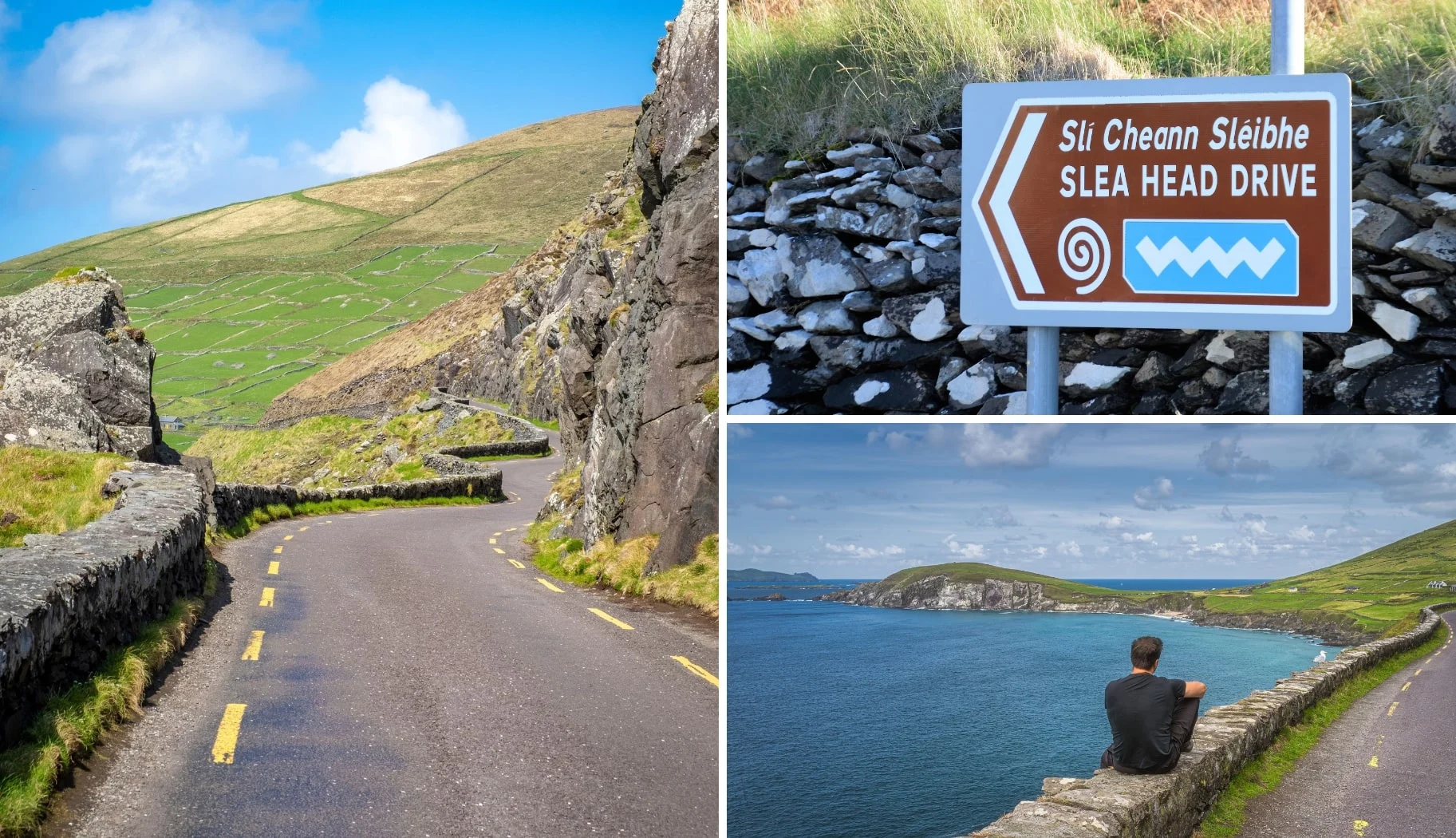
Photos via Shutterstock
We hope you found the above road trip guide useful. If you have any questions, ask in the comments below and we’ll do our best to help.
Or, if you’d like to browse our other Irish Road Trip itineraries, visit our Road Trip Hub – cheers!
Keith O’Hara has lived in Ireland for 35 years and has spent most of the last 10 creating what is now The Irish Road Trip guide. Over the years, the website has published thousands of meticulously researched Ireland travel guides, welcoming 30 million+ visitors along the way. In 2022, the Irish Road Trip team published the world’s largest collection of Irish Road Trip itineraries. Keith lives in Dublin with his dog Toby and finds writing in the 3rd person minus craic altogether.

